

How To Write a Truck Dispatch Business Plan + Template
Creating a truck dispatcher business plan is essential for any business, but it can be especially helpful for truck dispatch businesses who want to improve their strategy and/or raise funding.
A well-crafted plan not only outlines the vision for your company but also documents a step-by-step roadmap of how you are going to accomplish it. To create an effective plan, you must first understand the components that are essential to its success.
This article provides an overview of the key elements that every truck dispatching company owner should include in their business plan.
Download the Ultimate Business Plan Template
What is a Truck Dispatcher Business Plan?
A truck dispatching company plan is a formal written document that describes your truck dispatching company’s business strategy and its feasibility. It documents the reasons you will be successful, and your areas of competitive advantage, and it includes information about your team members and truck drivers. Your truck dispatcher business plan is a key document that will convince investors and lenders (if needed) that you are positioned to become a successful venture.
Why Write a Truck Dispatcher Company Plan?
A truck dispatcher company plan is required for banks and investors. The document is a clear and concise guide to your business idea and the steps you will take to make it profitable.
Entrepreneurs can also use this as a roadmap when starting their new company or venture, especially if they are inexperienced in starting a business.
Writing an Effective Truck Dispatcher Plan
The following are the key components of a successful truck dispatcher business plan:
Executive Summary
This section of a truck dispatching company plan is a one to two-page overview of your entire plan. It should summarize the main points, which will be presented in full in the rest of your plan.
- Start with a one-line description of your truck dispatch company
- Provide a summary of the key points in each section of your plan, which includes information about your company’s management team, trucking industry analysis, competitive analysis, and financial forecast among others.
Company Description
This section should include a brief history of your truck dispatcher company. Include a short description of how your trucking company started, and provide a timeline of milestones your company has achieved.
If you are just starting your truck dispatching company , you may not have a long company history. Instead, you can include information about your professional experience with trucking companies within the trucking industry and how and why you conceived your new venture. If you have worked for a similar company before or have been involved in an entrepreneurial venture before starting your truck dispatcher firm, mention this.
You will also include information about your chosen truck dispatch business model and how, if applicable, it is different from other companies in your industry.
Industry Analysis
The truck dispatcher industry or market analysis is an important component of a truck dispatchers business plan. Conduct thorough market research to determine industry trends and document the size of your target market.
Questions to answer include:
- Which part of the truck dispatch industry are you targeting?
- How big is the trucking company market?
- What trends are happening in the truck dispatcher industry right now (and if applicable, how do these trends support the success of your trucking company)?
You should also include sources for the information you provide, such as published research reports and expert opinions.
Customer Analysis
This section should include a list of your target audience(s) with demographic and psychographic profiles (e.g., age, gender, income level, profession, job titles, and interests). You will need to provide a profile of each customer segment separately, including their needs and wants.
For example, a truck dispatchers business’ customers may include:
- Trucking company
- Truck dispatcher services who contract out to trucking companies
- Large businesses with their fleet of trucks
You can include information about how your customers decide to buy from you as well as what keeps them buying from you.
Develop a strategy for targeting those customers who are most likely to buy from you, as well as those that might be influenced to buy your dispatch services with the right marketing.
Competitive Analysis
The competitive analysis helps you determine how your product or service will be different from competitors, and what your unique selling proposition (USP) might be that will set you apart in this trucking industry.
For each competitor, list their strengths and weaknesses. Next, determine your areas of competitive differentiation and/or advantage; that is, in what ways are you different from and ideally better than your competitors.
Marketing Plan
This part of the plan is where you determine and document your marketing strategy and plan. Your plan should be laid out, including the following 4 Ps.
- Product/Service : Detail your product/service offerings here. Document their features and benefits.
- Price : Document your pricing strategy here. In addition to stating the prices for your products/services, mention how your pricing compares to your competition.
- Place : Where will your customers find you? What channels of distribution (e.g., partnerships) will you use to reach them if applicable?
- Promotion : How will you reach your target customers? For example, you may use social media, write blog posts, create an email marketing campaign, use pay-per-click advertising, launch aor direct mail campaign.
Operations Plan
This part of your truck dispatch plan should include the following information:
- How will you deliver your product/service to customers? For example, will you do it in person or over the phone only?
- What infrastructure, equipment, and resources are needed to operate successfully? How can you meet those requirements within budget constraints?
The operations plan is where you also need to include your company’s business policies. You will want to establish policies related to everything from customer service to pricing, to the overall brand image you are trying to present.
Finally, and most importantly, in your Operations Plan, you will lay out the milestones your company hopes to achieve within the next five years. Create a chart that shows the key milestone(s) you hope to achieve each quarter for the next four quarters, and then each year for the following four years. Examples of milestones for a trucking companies include reaching $X in sales. Other examples include hiring key personnel or signing up new customers.
Management Team
List your team members here including their names and titles, as well as their expertise and experience relevant to your specific truck dispatch industry. Include brief biography sketches for each team member.
Particularly if you are seeking funding, the goal of this section is to convince investors and lenders that your team has the expertise and experience to execute on your plan. If you are missing key team members, document the roles and responsibilities you plan to hire in the future.
Financial Plan
Here you will include a summary of your complete and detailed financial plan (your full financial projections go in the Appendix).
This includes the following three financial statements:
Income Statement
Your income statement should include:
- Revenue : how much revenue you generate.
- Cost of Goods Sold : These are your direct costs associated with generating revenue. This includes labor costs, as well as the cost of any equipment and supplies used to deliver the product/service offering.
- Net Income (or loss) : Once expenses and revenue are totaled and deducted from each other, this is the net income or loss
Sample Income Statement for a Startup Truck Dispatching Company
Balance Sheet
Include a balance sheet that shows your assets, liabilities, and equity. Your balance sheet should include:
- Assets : Everything you own (including cash).
- Liabilities : What you owe against your company’s assets, such as accounts payable or loans.
- Equity : The worth of your business after all liabilities and assets are totaled and deducted from each other.
Sample Balance Sheet for a Startup Truck Dispatching Company
Cash Flow Statement
Include a cash flow statement showing how much cash comes in, how much cash goes out and a net cash flow for each year. The cash flow statement should include:
- Cash Flow From Operations
- Cash Flow From Investments
- Cash Flow From Financing
Below is a sample of a projected cash flow statement for a startup truck dispatch companies .
Sample Cash Flow Statement for a Startup Truck Dispatching Company
You will also want to include an appendix section which will include:
- Your complete financial projections
- A complete list of your company’s business policies and procedures related to the rest of the plan (marketing, operations, etc.)
- Any other documentation which supports what you included in the body of your plan, including lists of truck drivers, truck dispatcher companies, and freight broker companies you would be working with.
Writing a good business plan gives you the advantage of being fully prepared to launch and/or grow your truck dispatch company. It not only outlines your business vision but also provides a step-by-step process of how you are going to accomplish it.
A truck dispatcher company plan is an essential document for any truck dispatcher company. In order to write an effective plan, make sure to include a financial plan, management team bios, and detailed information about your truck drivers target market. If you will seek financing, investors want to see a well-thought-out financial plan that includes a detailed budget and forecast.
Finish Your Truck Dispatcher Business Plan in 1 Day!
Other helpful articles.
How To Create a Dispatcher Carrier Agreement and Template
We earn commissions if you shop through the links below. Read more
Truck Dispatching
Back to All Business Ideas
How to Start a Truck Dispatching Business
Written by: Carolyn Young
Carolyn Young is a business writer who focuses on entrepreneurial concepts and the business formation. She has over 25 years of experience in business roles, and has authored several entrepreneurship textbooks.
Edited by: David Lepeska
David has been writing and learning about business, finance and globalization for a quarter-century, starting with a small New York consulting firm in the 1990s.
Published on July 22, 2023 Updated on May 15, 2024
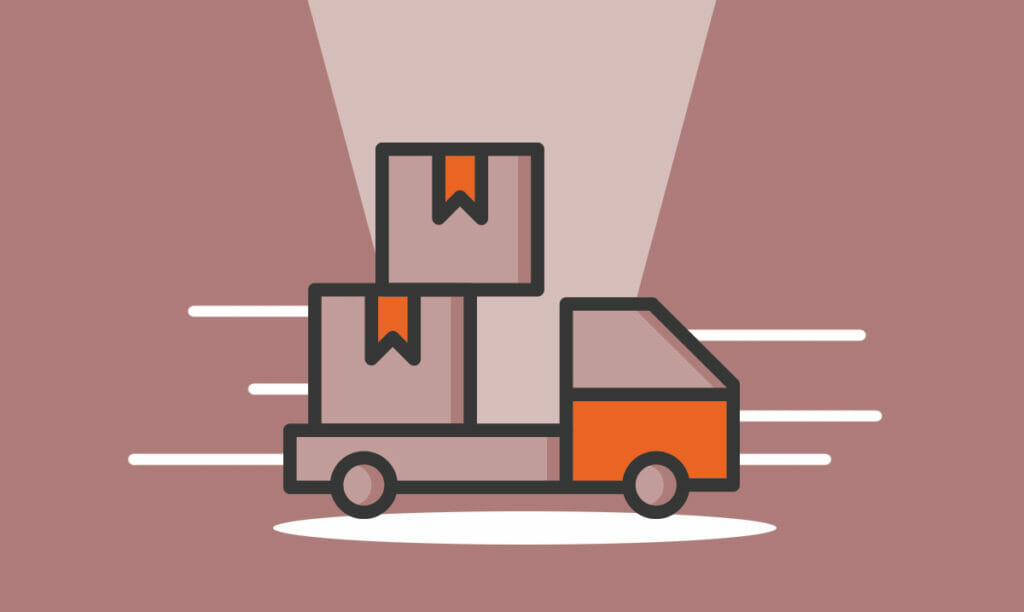
Investment range
$3,300 - $7,300
Revenue potential
$78,000 - $312,000 p.a.
Time to build
Profit potential
$62,400 - $93,600 p.a.
Industry trend
Truck dispatching companies are invaluable to trucking businesses. They secure new clients for the trucking companies, schedule load pickups and drop offs, and sometimes manage the invoicing and collections.
A truck dispatching business is one that you can run remotely from home, making it an attractive opportunity for an aspiring entrepreneur.
But before you jump in, you’ll need to understand the business. Luckily, this step-by-step guide details all the business insight you need to start a successful truck dispatching company.
Looking to register your business? A limited liability company (LLC) is the best legal structure for new businesses because it is fast and simple.
Form your business immediately using ZenBusiness LLC formation service or hire one of the Best LLC Services .
Step 1: Decide if the Business Is Right for You
Pros and cons.
- Run your business from home
- Percentage rates charged per load revenue can add up nicely
- Low startup costs
- May require some online courses
- Competitive industry
Truck dispatching industry trends
Truck dispatching is part of the general freight trucking industry.
Industry size and growth
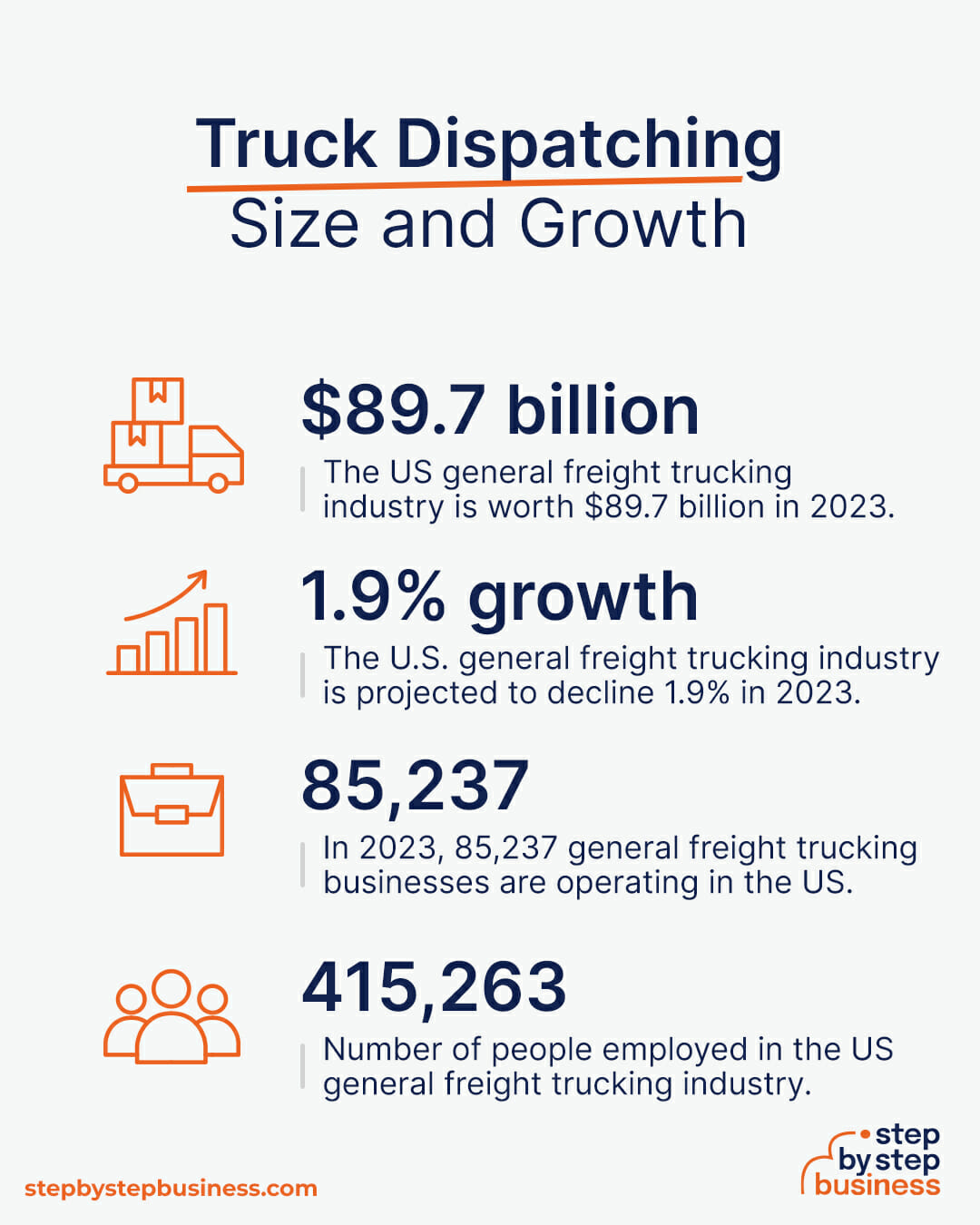
- Industry size and past growth – The U.S. general freight trucking industry is worth $89.7 billion in 2023 after growing 2.5% annually for the last five years.(( https://www.ibisworld.com/industry-statistics/market-size/general-freight-trucking-truckload-united-states/ ))
- Growth forecast – The U.S. general freight trucking industry is projected to decline 1.9% in 2023.
- Number of businesses – In 2023, 85,237 general freight trucking businesses are operating in the U.S.(( https://www.ibisworld.com/united-states/market-research-reports/general-freight-trucking-truckload-industry/ ))
- Number of people employed – In 2023, the U.S. general freight trucking industry employs 415,263 people.
Trends and challenges
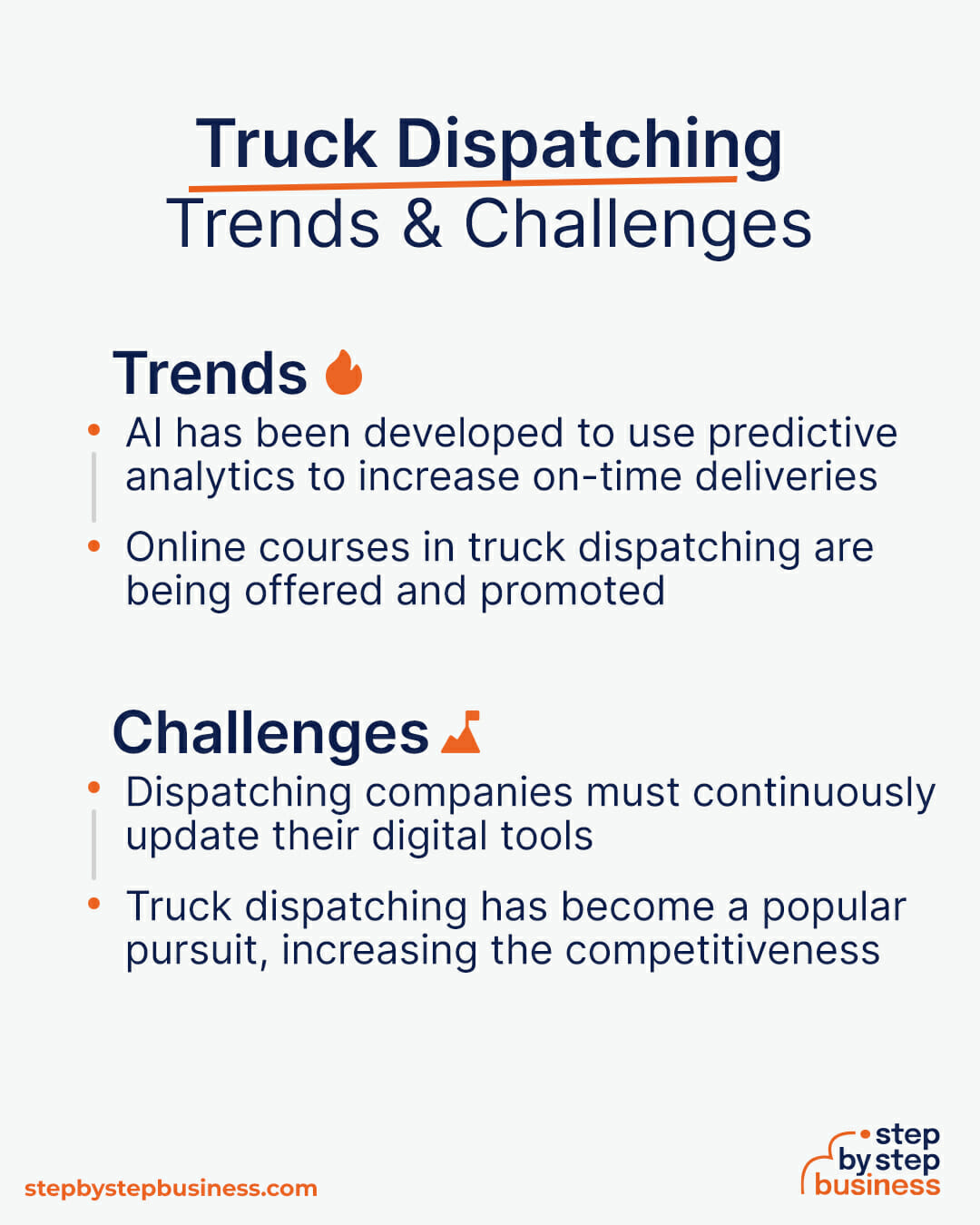
- AI powered software has been developed to use predictive analytics to increase on-time deliveries.
- More and more online courses in truck dispatching are being offered and promoted on social media.
- As the truck dispatching industry becomes more technology driven, dispatching companies must continuously update their digital tools.
- Truck dispatching has become a more popular entrepreneurial pursuit, increasing the competitiveness of the industry.
Demand hotspots
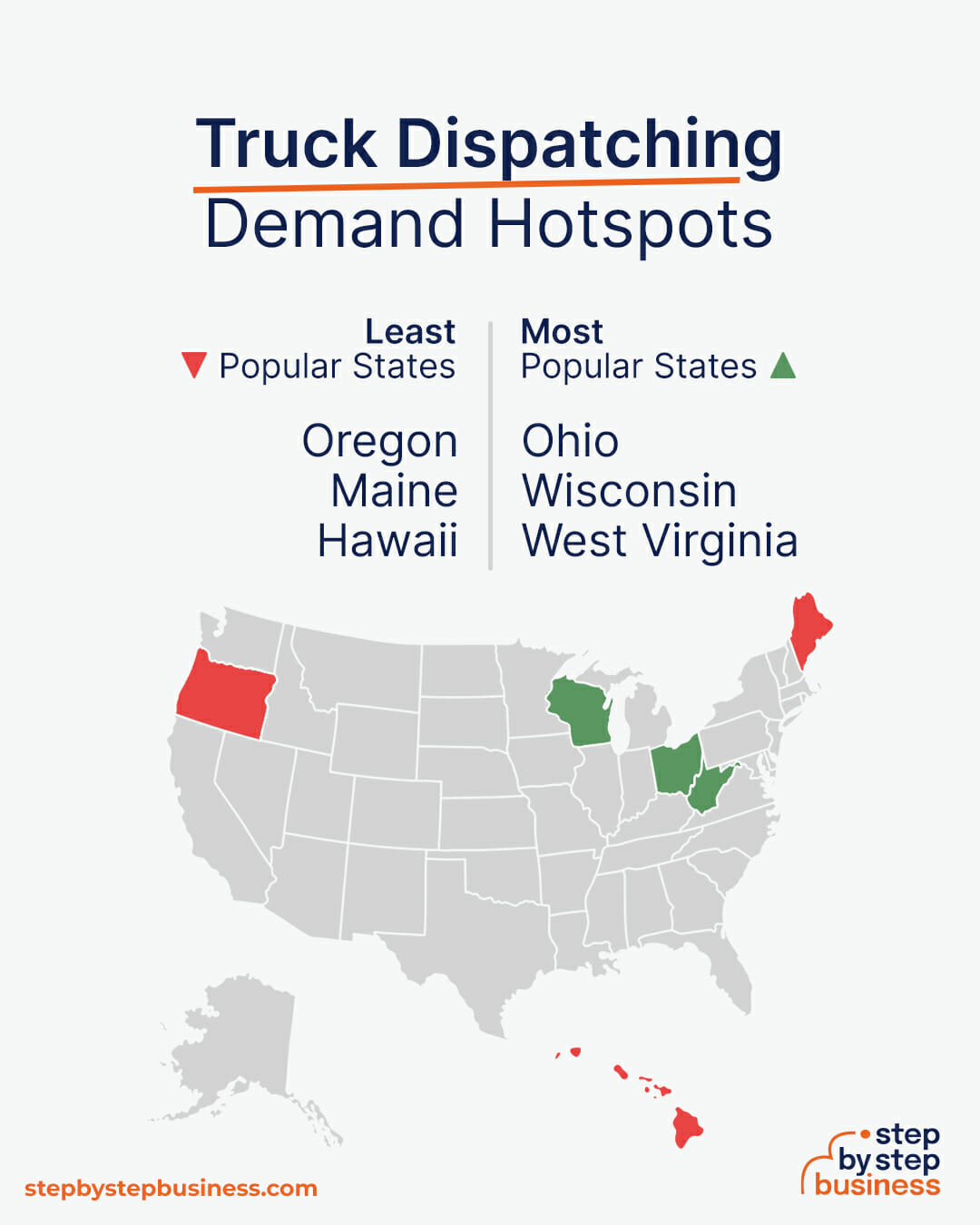
- Most popular states – The most popular states for truck dispatchers are Ohio, Wisconsin, and West Virginia.
- Least popular states – The least popular states for truck dispatchers are Oregon, Maine, and Hawaii.
What kind of people work in truck dispatching?
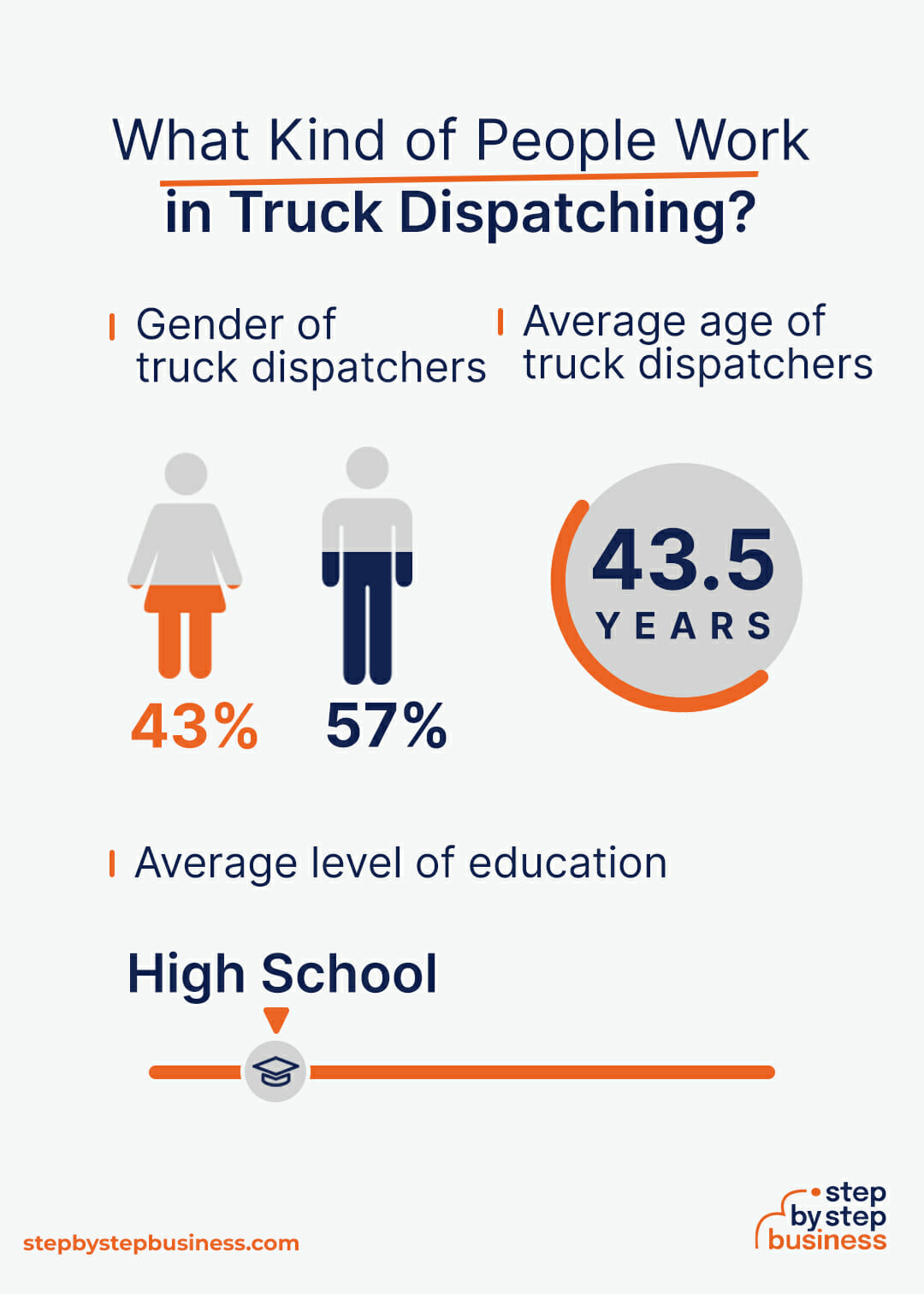
- Gender – 43% of truck dispatchers are female, while 57% are male. (( https://www.zippia.com/truck-dispatcher-jobs/demographics/ ))
- Average level of education – T he average truck dispatcher is high school educated.
- Average age – The average truck dispatcher in the US is 43.5 years old.
How much does it cost to start a truck dispatching business?
Startup costs for a truck dispatching business range from $3,000 to $7,000. Costs include a computer, dispatching software, and a marketing budget.
How much can you earn from a truck dispatching business?
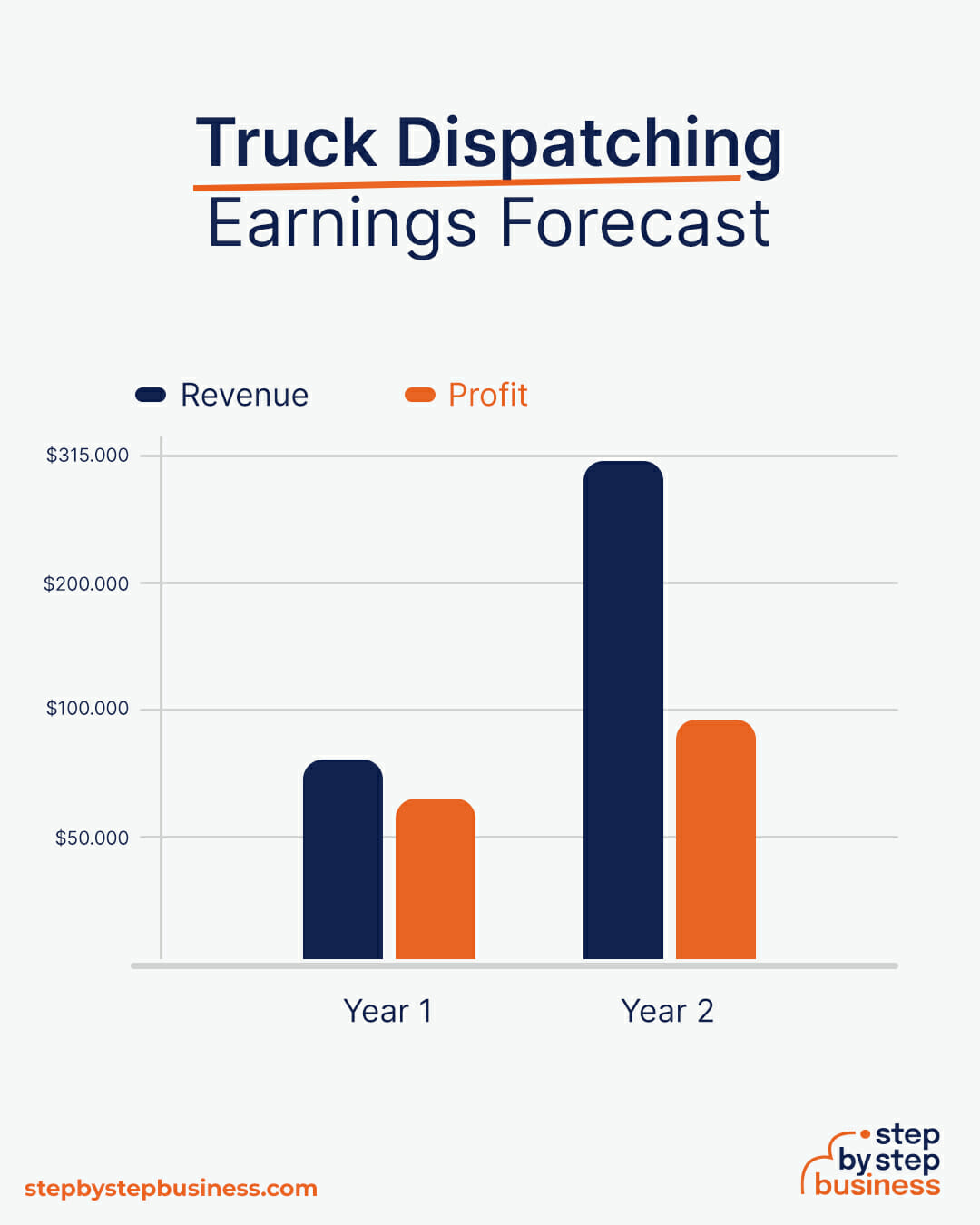
Typically, dispatchers charge around 6% of each load that they secure and dispatch. One truck might generate $5,000 in revenue per week, bringing in $300. Your profit margin should be around 80%.
In your first year or two, you could work from home, dispatching five trucks, bringing in $78,000 in revenue. This would mean $62,400 in profit, assuming that 80% margin.
As you gain traction, you might dispatch 20 trucks. At this stage, you might have an office and hire staff, reducing your margin to around 30%. With annual revenue of $312,000, you’d make a tidy profit of $93,600.
What barriers to entry are there?
There are a few barriers to entry for a truck dispatching business. Your biggest challenges will be:
- Learning the ins and outs of truck dispatching
- Breaking into a competitive market
Related Business Ideas

How to Start a Box Truck Business
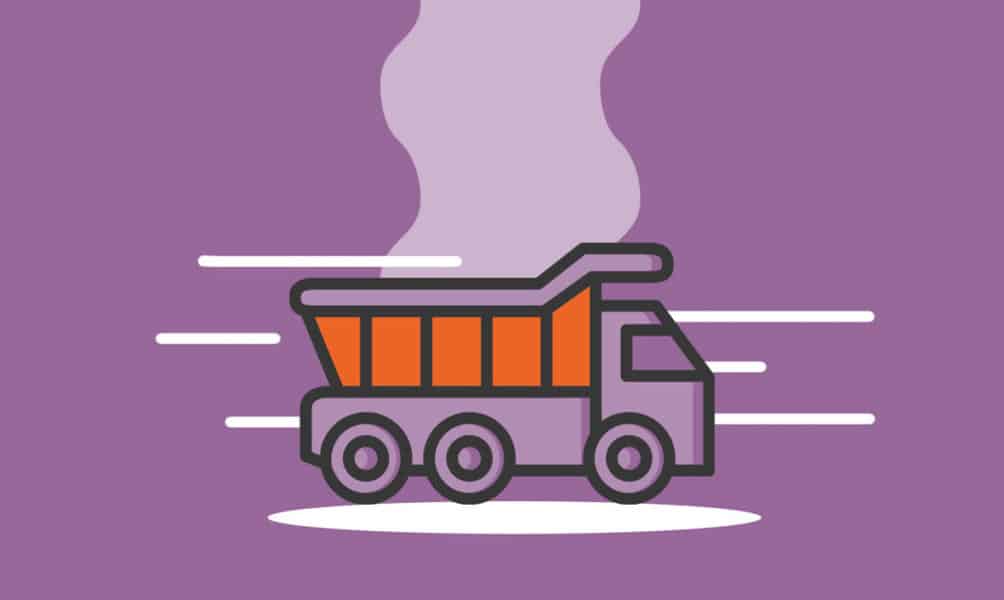
How to Start a Dump Truck Business

How to Start a Car Hauling Business
Step 2: hone your idea.
Now that you know what’s involved in starting a truck dispatching business, it’s a good idea to hone your concept in preparation to enter a competitive market.
Market research could give you the upper hand even if you’ve got the perfect product. Conducting robust market research is crucial, as it will help you better understand your customers, your competitors, and the broader business landscape.
Analyze your competitors
Research truck dispatching businesses to examine their services, price points, and customer reviews.
- Make a list of businesses that offer similar services.
- Review your competitors’ services – their features, pricing, and quality – and marketing strategies
- Check out their online reviews and ratings on Google, Yelp, and Facebook to get an idea of what their customers like and dislike.
- Identify your competitors’ strengths and weaknesses.
This should identify areas where you can strengthen your business and gain a competitive edge to make better business decisions.
Why? Identify an opportunity
You’re looking for a market gap to fill. For instance, maybe the local market is missing a business that specializes in small truck dispatching.
You might consider targeting a niche, such as long haul dispatching.
This could jumpstart your word-of-mouth marketing and attract clients right away.
What? Determine your services
You’ll need to decide the extent of the services you want to offer. They can include:
- Finding loads
- Assigning loads and managing drivers
- Managing motor carrier compliance
- Providing customer service
- Handling billing and collections
How much should you charge for truck dispatching?
Prices are generally a percentage of each load’s revenue. You’ll want to determine your percentage charged based on market prices in your area, but also on your ongoing costs.
Once you know your costs, use this Step By Step profit margin calculator to determine your mark-up and final price points. Remember, the prices you use at launch should be subject to change if warranted by the market.
Who? Identify your target market
Your target market will be two-fold. You’ll target independent truck drivers or small trucking companies, but you’ll also need to find businesses that need loads hauled.
You can connect with both groups on LinkedIn or call on them directly.
Where? Choose your business premises
In the early stages, you may want to run your business from home to keep costs low. But as your business grows, you’ll likely need to hire workers for various roles and may need to rent out an office. You can find commercial space to rent in your area on sites such as Craigslist , Crexi , and Instant Offices .
When choosing a commercial space, you may want to follow these rules of thumb:
- Central location accessible via public transport
- Ventilated and spacious, with good natural light
- Flexible lease that can be extended as your business grows
- Ready-to-use space with no major renovations or repairs needed
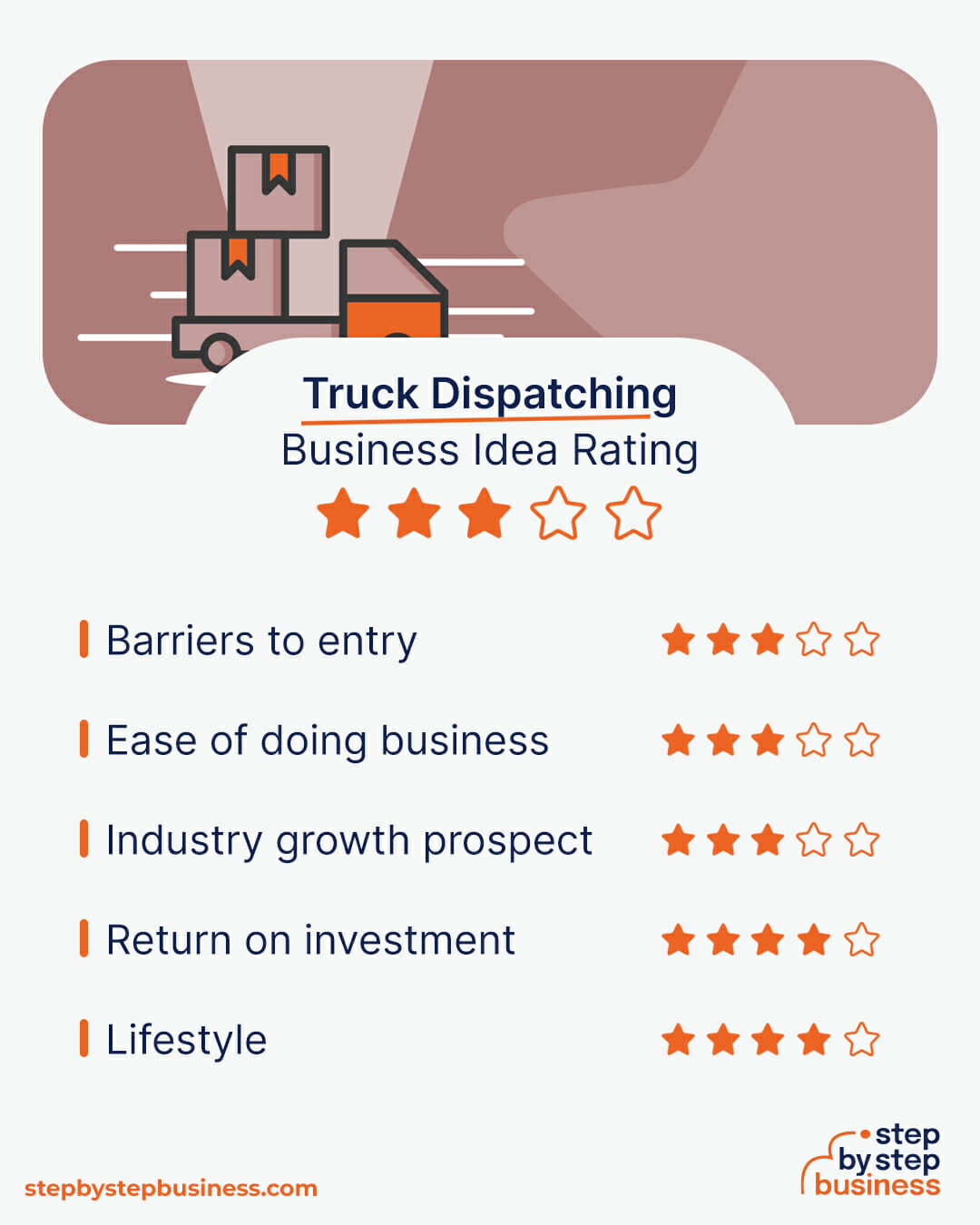
Step 3: Brainstorm a Truck Dispatching Business Name
Here are some ideas for brainstorming your business name:
- Short, unique, and catchy names tend to stand out
- Names that are easy to say and spell tend to do better
- Name should be relevant to your product or service offerings
- Ask around — family, friends, colleagues, social media — for suggestions
- Including keywords, such as “truck dispatching” or “dispatching”, boosts SEO
- Name should allow for expansion, for ex: “CargoExpand Dispatching” and “OmniRoute Logistics” over “HaulHub Dispatch” and “FreightFlow Coordinators”
- A location-based name can help establish a strong connection with your local community and help with the SEO but might hinder future expansion
Once you’ve got a list of potential names, visit the website of the US Patent and Trademark Office to make sure they are available for registration and check the availability of related domain names using our Domain Name Search tool. Using “.com” or “.org” sharply increases credibility, so it’s best to focus on these.
Find a Domain
Powered by GoDaddy.com
Finally, make your choice among the names that pass this screening and go ahead and reserve your business name with your state, start the trademark registration process, and complete your domain registration and social media account creation.
Your business name is one of the key differentiators that sets your business apart. Once you pick a name, reserve it and start with the branding, it’s hard to switch to a new name. So be sure to carefully consider your choice before moving forward.
Step 4: Create a Truck Dispatching Business Plan
Here are the key components of a business plan:

- Executive Summary: Summarize the goals and mission of your truck dispatching business, highlighting its potential to streamline logistics operations.
- Business Overview: Provide a brief description of your truck dispatching business, including its location, the types of clients you’ll serve, and the benefits of your services.
- Product and Services: Detail the dispatching services you offer, such as real-time tracking, load assignment, route optimization, and 24/7 support for trucking companies.
- Market Analysis: Analyze the trucking industry’s demand for dispatching services, considering factors like the growth of e-commerce and the need for efficient freight management.
- Competitive Analysis: Identify competitors in the truck dispatching sector and emphasize your unique features, such as advanced technology solutions or tailored dispatching strategies.
- Sales and Marketing: Outline your sales strategies, including client acquisition methods, pricing structures, and marketing efforts to reach trucking companies.
- Management Team: Introduce key team members with experience in logistics, dispatching, and technology, showcasing their qualifications.
- Operations Plan: Describe the day-to-day operations of your truck dispatching business, including dispatching procedures, communication protocols, and the software or systems you’ll use.
- Financial Plan: Present financial projections, including startup costs, revenue forecasts, expenses, and profitability estimates for your truck dispatching business.
- Appendix: Include case studies demonstrating successful dispatching projects, testimonials from satisfied clients, and any technology partnerships or certifications that validate your expertise.
If you’ve never created a business plan, it can be an intimidating task. You might consider hiring a business plan specialist to create a top-notch business plan for you.
Step 5: Register Your Business
Registering your business is an absolutely crucial step — it’s the prerequisite to paying taxes, raising capital, opening a bank account, and other guideposts on the road to getting a business up and running.
Plus, registration is exciting because it makes the entire process official. Once it’s complete, you’ll have your own business!
Choose where to register your company
Your business location is important because it can affect taxes, legal requirements, and revenue. Most people will register their business in the state where they live, but if you are planning to expand, you might consider looking elsewhere, as some states could offer real advantages when it comes to truck dispatching businesses.
If you’re willing to move, you could really maximize your business! Keep in mind, it’s relatively easy to transfer your business to another state.
Choose your business structure
Business entities come in several varieties, each with its pros and cons. The legal structure you choose for your truck dispatching business will shape your taxes, personal liability, and business registration requirements, so choose wisely.
Here are the main options:

- Sole Proprietorship – The most common structure for small businesses makes no legal distinction between company and owner. All income goes to the owner, who’s also liable for any debts, losses, or liabilities incurred by the business. The owner pays taxes on business income on his or her personal tax return.
- General Partnership – Similar to a sole proprietorship, but for two or more people. Again, owners keep the profits and are liable for losses. The partners pay taxes on their share of business income on their personal tax returns.
- Limited Liability Company ( LLC ) – Combines the characteristics of corporations with those of sole proprietorships or partnerships. Again, the owners are not personally liable for debts. Here’s how to form an LLC .
- C Corp – Under this structure, the business is a distinct legal entity and the owner or owners are not personally liable for its debts. Owners take profits through shareholder dividends, rather than directly. The corporation pays taxes, and owners pay taxes on their dividends, which is sometimes referred to as double taxation. Read how to start a corporation here .
- S Corp – An S-Corporation refers to the tax classification of the business but is not a business entity. An S-Corp can be either a corporation or an LLC , which just need to elect to be an S-Corp for tax status. In an S-Corp, income is passed through directly to shareholders, who pay taxes on their share of business income on their personal tax returns.
We recommend that new business owners choose LLC as it offers liability protection and pass-through taxation while being simpler to form than a corporation. You can form an LLC in as little as five minutes using an online LLC formation service. They will check that your business name is available before filing, submit your articles of organization , and answer any questions you might have.
Form Your LLC
Choose Your State
We recommend ZenBusiness as the Best LLC Service for 2024

Step 6: Register for Taxes
The final step before you’re able to pay taxes is getting an Employer Identification Number , or EIN. You can file for your EIN online or by mail or fax: visit the IRS website to learn more. Keep in mind, if you’ve chosen to be a sole proprietorship you can simply use your social security number as your EIN.
Once you have your EIN, you’ll need to choose your tax year. Financially speaking, your business will operate in a calendar year (January–December) or a fiscal year, a 12-month period that can start in any month. This will determine your tax cycle, while your business structure will determine which taxes you’ll pay.
The IRS website also offers a tax-payers checklist , and taxes can be filed online.
It is important to consult an accountant or other professional to help you with your taxes to ensure you are completing them correctly.
Step 7: Fund your Business
Securing financing is your next step and there are plenty of ways to raise capital:

- Bank loans: This is the most common method but getting approved requires a rock-solid business plan and strong credit history.
- SBA-guaranteed loans: The Small Business Administration can act as guarantor, helping gain that elusive bank approval via an SBA-guaranteed loan .
- Government grants: A handful of financial assistance programs help fund entrepreneurs. Visit Grants.gov to learn which might work for you.
- Venture capital: Venture capital investors take an ownership stake in exchange for funds, so keep in mind that you’d be sacrificing some control over your business. This is generally only available for businesses with high growth potential.
- Angel investors: Reach out to your entire network in search of people interested in investing in early-stage startups in exchange for a stake. Established angel investors are always looking for good opportunities.
- Friends and Family: Reach out to friends and family to provide a business loan or investment in your concept. It’s a good idea to have legal advice when doing so because SEC regulations apply.
- Crowdfunding: Websites like Kickstarter and Indiegogo offer an increasingly popular low-risk option, in which donors fund your vision. Entrepreneurial crowdfunding sites like Fundable and WeFunder enable multiple investors to fund your business.
- Personal: Self-fund your business via your savings or the sale of property or other assets.
Bank and SBA loans are probably the best option, other than friends and family, for funding a truck dispatching business. You might also try crowdfunding if you have an innovative concept.
Step 8: Apply for Business Licenses and Permits
Starting a truck dispatching business requires obtaining a number of licenses and permits from local, state, and federal governments.
Some states may require a truck dispatching permit.
Federal regulations, licenses, and permits associated with starting your business include doing business as (DBA), health licenses and permits from the Occupational Safety and Health Administration ( OSHA ), trademarks, copyrights, patents, and other intellectual properties, as well as industry-specific licenses and permits.
You may also need state-level and local county or city-based licenses and permits. The license requirements and how to obtain them vary, so check the websites of your state, city, and county governments or contact the appropriate person to learn more.
You could also check this SBA guide for your state’s requirements, but we recommend using MyCorporation’s Business License Compliance Package . They will research the exact forms you need for your business and state and provide them to ensure you’re fully compliant.
This is not a step to be taken lightly, as failing to comply with legal requirements can result in hefty penalties.
If you feel overwhelmed by this step or don’t know how to begin, it might be a good idea to hire a professional to help you check all the legal boxes.
Step 9: Open a Business Bank Account
Before you start making money, you’ll need a place to keep it, and that requires opening a bank account .
Keeping your business finances separate from your personal account makes it easy to file taxes and track your company’s income, so it’s worth doing even if you’re running your truck dispatching business as a sole proprietorship. Opening a business bank account is quite simple, and similar to opening a personal one. Most major banks offer accounts tailored for businesses — just inquire at your preferred bank to learn about their rates and features.
Banks vary in terms of offerings, so it’s a good idea to examine your options and select the best plan for you. Once you choose your bank, bring in your EIN (or Social Security Number if you decide on a sole proprietorship), articles of incorporation, and other legal documents and open your new account.
Step 10: Get Business Insurance
Business insurance is an area that often gets overlooked yet it can be vital to your success as an entrepreneur. Insurance protects you from unexpected events that can have a devastating impact on your business.
Here are some types of insurance to consider:

- General liability: The most comprehensive type of insurance, acting as a catch-all for many business elements that require coverage. If you get just one kind of insurance, this is it. It even protects against bodily injury and property damage.
- Business Property: Provides coverage for your equipment and supplies.
- Equipment Breakdown Insurance: Covers the cost of replacing or repairing equipment that has broken due to mechanical issues.
- Worker’s compensation: Provides compensation to employees injured on the job.
- Property: Covers your physical space, whether it is a cart, storefront, or office.
- Commercial auto: Protection for your company-owned vehicle.
- Professional liability: Protects against claims from a client who says they suffered a loss due to an error or omission in your work.
- Business owner’s policy (BOP): This is an insurance plan that acts as an all-in-one insurance policy, a combination of the above insurance types.
Step 11: Prepare to Launch
As opening day nears, prepare for launch by reviewing and improving some key elements of your business.
Essential software and tools
Being an entrepreneur often means wearing many hats, from marketing to sales to accounting, which can be overwhelming. Fortunately, many websites and digital tools are available to help simplify many business tasks.
You may want to use industry-specific software, such as TruckLogics , or Axon , to manage your loads, scheduling, dispatching, and invoicing.
- Popular web-based accounting programs for smaller businesses include Quickbooks , Freshbooks , and Xero .
- If you’re unfamiliar with basic accounting, you may want to hire a professional, especially as you begin. The consequences for filing incorrect tax documents can be harsh, so accuracy is crucial.
Create a website
Website development is crucial because your site is your online presence and needs to convince prospective clients of your expertise and professionalism. You can create your own website using services like WordPress, Wix, or Squarespace . This route is very affordable, but figuring out how to build a website can be time-consuming. If you lack tech-savvy, you can hire a web designer or developer to create a custom website for your business.
Your customers are unlikely to find your website, however, unless you follow Search Engine Optimization (SEO) practices. SEO will help your website appear closer to the top in relevant search results, a crucial element for increasing sales.
Make sure that you optimize calls to action on your website. Experiment with text, color, size, and position of calls to action such as “Get a Quote”. This can sharply increase purchases.
Here are some powerful marketing strategies for your future business:
- Strategic Partnerships: Build strong alliances with trucking companies, shippers, and freight brokers to enhance your network and secure reliable partnerships, increasing your business credibility.
- Niche Targeting: Identify specific industries or geographical areas where there is high demand for truck dispatching services, allowing you to tailor your marketing efforts and stand out in a specialized market.
- Referral Programs: Implement referral incentives for existing clients, drivers, and industry contacts to encourage word-of-mouth marketing, tapping into the power of recommendations within the trucking community.
- Social Media Engagement: Leverage social media platforms to showcase your expertise, share success stories, and engage with the trucking community. Use platforms like LinkedIn and Twitter to connect with industry professionals.
- Content Marketing: Develop informative content, such as blog posts, articles, and infographics, addressing common challenges in the trucking industry. Establish yourself as an authority to attract and retain clients.
- Attend Industry Events: Participate in trucking and logistics conferences, trade shows, and networking events to meet potential clients and partners face-to-face, fostering trust and building relationships within the industry.
- Optimized Online Presence: Ensure your business is listed on online directories relevant to the logistics industry. Optimize your Google My Business profile for local visibility and positive reviews.
- Offer Trial Periods: Provide a trial period or discounted initial services to entice new clients. This allows them to experience the value of your dispatching services firsthand, increasing the likelihood of long-term partnerships.
- Customer Testimonials: Collect and showcase positive feedback and testimonials from satisfied clients. Real-world success stories can significantly influence potential clients when making their decision.
- Invest in Technology: Utilize advanced dispatching software and technology to streamline operations. Highlight your commitment to efficiency and accuracy in your marketing materials, showcasing the benefits of your technological investments.
Focus on USPs

Unique selling propositions, or USPs, are the characteristics of a product or service that sets it apart from the competition. Customers today are inundated with buying options, so you’ll have a real advantage if they are able to quickly grasp how your truck dispatching business meets their needs or wishes. It’s wise to do all you can to ensure your USPs stand out on your website and in your marketing and promotional materials, stimulating buyer desire.
Global pizza chain Domino’s is renowned for its USP: “Hot pizza in 30 minutes or less, guaranteed.” Signature USPs for your truck dispatching business could be:
- Streamlined truck dispatching solutions for optimized logistics.
- Expert truck dispatching services tailored to your business needs.
- Simplify your truck dispatching operations with our cutting-edge technology.
You may not like to network or use personal connections for business gain. But your personal and professional networks likely offer considerable untapped business potential. Maybe that Facebook friend you met in college is now running a truck dispatching business, or a LinkedIn contact of yours is connected to dozens of potential clients. Maybe your cousin or neighbor has been working in truck dispatching for years and can offer invaluable insight and industry connections.
The possibilities are endless, so it’s a good idea to review your personal and professional networks and reach out to those with possible links to or interest in truck dispatching. You’ll probably generate new customers or find companies with which you could establish a partnership.
Step 12: Build Your Team
If you’re starting out small from a home office, you may not need any employees. But as your business grows, you will likely need workers to fill various roles. Potential positions for a truck dispatching business include:
- Dispatchers – dispatch trucks
- Billing specialist – handle client load invoices and payments
- Salesperson – find new clients with loads to haul, and new trucker clients
At some point, you may need to hire all of these positions or simply a few, depending on the size and needs of your business. You might also hire multiple workers for a single role or a single worker for multiple roles, again depending on need.
Free-of-charge methods to recruit employees include posting ads on popular platforms such as LinkedIn, Facebook, or Jobs.com. You might also consider a premium recruitment option, such as advertising on Indeed , Glassdoor , or ZipRecruiter . Further, if you have the resources, you could consider hiring a recruitment agency to help you find talent.
Step 13: Run a Truck Dispatching Business – Start Making Money!
Truck dispatching companies are in a niche industry and provide valuable services to truck drivers and trucking companies. You’ll just need to learn about the logistics of truck dispatching by taking some online courses, and then you can build a lucrative home-based company that has the potential to grow into a professional operation.
You’ve got the business part down now, so you’re ready to hit the road to entrepreneurial success!
- Truck Dispatching Business FAQs
A truck dispatching business can be profitable, but the level of profitability will depend on various factors such as market conditions, competition, and the efficiency of your operations. It’s important to conduct a thorough analysis of the market and create a solid business plan to maximize your chances of success.
During a typical day at a truck dispatching business, you would be responsible for coordinating and managing the logistics of trucking operations. This involves tasks such as communicating with drivers and clients, scheduling pickups and deliveries, tracking shipments, ensuring compliance with regulations, and handling any issues that may arise during transportation. You would also be responsible for maintaining records, managing paperwork, and possibly handling billing and invoicing.
The growth potential of a truck dispatching business can be significant, particularly in a growing economy and a thriving transportation industry. As businesses rely on efficient transportation to move goods, the demand for dispatching services can increase. Expanding your client base, optimizing your operations, and offering value-added services can contribute to the growth of your business. Additionally, leveraging technology and automation can help streamline your processes and improve scalability.
A truck dispatching business falls under the broader category of transportation and logistics. It is a service-based business that facilitates the coordination and management of trucking operations for clients. While the core function of the business is dispatching, it may also involve additional services such as freight brokerage, load planning, and fleet management, depending on the specific business model.
Leave a Reply Cancel reply
Your email address will not be published. Required fields are marked *
Save my name, email, and website in this browser for the next time I comment.
- Decide if the Business Is Right for You
- Hone Your Idea
- Brainstorm a Truck Dispatching Business Name
- Create a Truck Dispatching Business Plan
- Register Your Business
- Register for Taxes
- Fund your Business
- Apply for Business Licenses and Permits
- Open a Business Bank Account
- Get Business Insurance
- Prepare to Launch
- Build Your Team
- Run a Truck Dispatching Business - Start Making Money!
Subscribe to Our Newsletter
Featured resources.
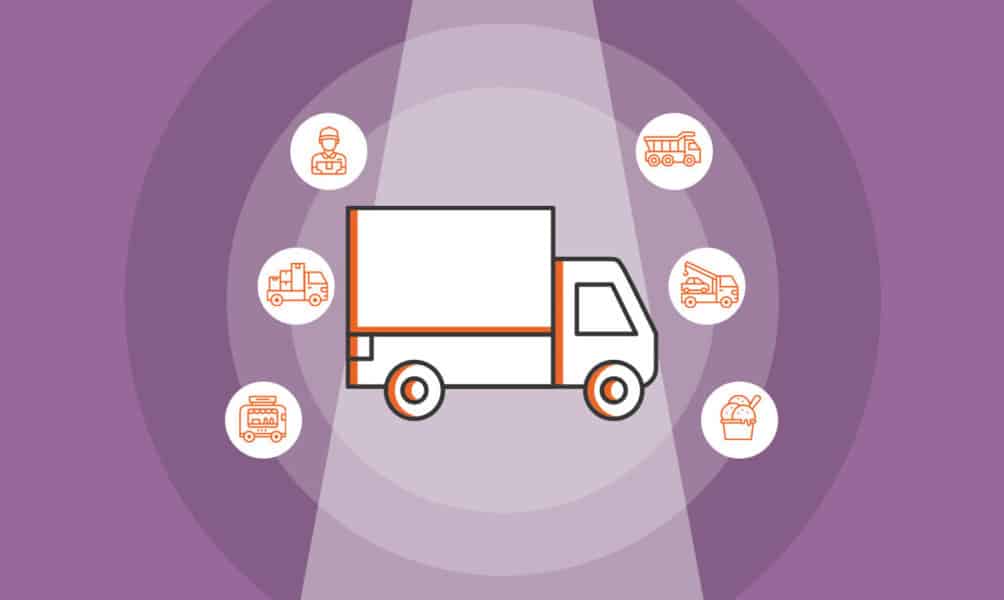
16 Best Truck Business Ideas
David Lepeska
Published on December 4, 2022
Do you own a truck, or are thinking about buying one, and wondering whether it could help you launch a successful business? You’ve come to the ...

12 Import-Export Business Ideas
Carolyn Young
Published on November 4, 2022
Our economy is increasingly global, with international markets getting more accessible every day. This presents an opportunity even for newbusinesse ...
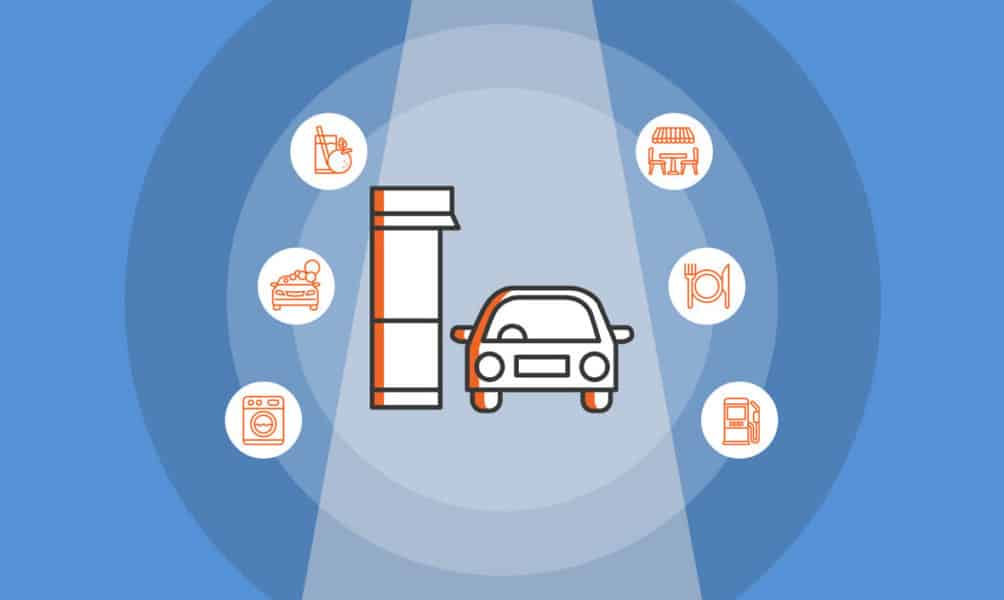
10 Drive Thru Business Ideas
Published on August 11, 2022
People are always on the go, so the more you’re able to provide convenience, the more customers you’re likely to attract. Many businessesout ...
No thanks, I don't want to stay up to date on industry trends and news.

Home » Transportation
A Sample Truck Dispatcher Business Plan Template
The general trucking industry requires a robust workforce to facilitate the vast range of moving parts it contends with daily. Truck dispatchers play a very vital behind-the-scene role as well as help bridge the gap between customers, drivers, and owner-operators. Also referred to as freight dispatchers, truck dispatchers make sure drivers or fleets have loads to deliver, stay on schedule, and meet customer requirements.
Truck dispatchers aren’t just for large fleets; they can help small motor carriers aiming to grow their business. Like so many jobs in the freight industry, dispatching can be lucrative. It takes a keen eye and an organized mind to be successful in the role. If you have these qualities, then this might be a career worth pursuing.
Steps on How to Write a Truck Dispatcher Business Plan
1. executive summary.
Mantle Core is an independent truck dispatching firm that is located in Chicago, Illinois. Our primary objective is to talk to shipping clients to get cargo details, organize a pick-up time, and note any special handling or delivery requirements.
We will also set up routes, also known as shipping lanes, and coordinate fleet drivers to make those pick-ups and deliveries. At Mantle Core, we are fully equipped with the latest technology in the telemarketing and call center industry, and we will work freelance for multiple trucking companies as independent freight dispatchers.
Company Profile
A. our services.
Our primary aim is to offer varieties of services within the scope of truck dispatching by providing management services for long and short-distance freight efficiently and effectively to our fleet of independent carriers in Chicago. The services we intend to offer at Mantle Core include;
- Telephone answering services for freight carriers
- Providing contract or fee-basis telemarketing services for freight companies
- Providing freight-related telephone solicitation Services
- Providing customer service for our clients
- Technical support services
- Debt collection services
- Freight related consultancy services
b. Nature of the Business
At Mantle Core, we offer B2B and B2C services including both inbound and outbound freight management. We will be directly affiliated with trucking companies and independent carriers in our business location and consistently work on their behalf.
We will serve as their employee and help conduct negotiations on their behalf. We intend to leverage load boards and personal connections to locate freight that needs to be shipped, speak to brokers, conduct negotiations, and eventually dispatch drivers and set up their routes.
c. The Industry
Mantle Core will provide dispatching and other management services to businesses in the trucking industry.
d. Mission Statement
Our mission at Mantle Core is to provide our clients quality freight management and dispatching services 24 hours a day. We have a dedicated and well-trained cadre of dispatchers who can consistently provide well-tailored services to our carriers and clients.
e. Vision Statement
At Mantle Core, our vision is to become a recognized brand in the freight industry and also create a service-based firm that will not only meet but exceed the varying expectations of our customers.
f. Tagline or Slogan
Mantle Core – A Call To Satisfaction
g. Legal Structure of the Business (LLC, C Corp, S Corp, LLP)
Mantle Core will be a limited liability company registered in the state of Illinois for tax purposes. Our founder, Mr. Timothy Abel, a former general manager at 24/7 Truck Dispatch Services has brought together a highly respected group of freight and customer relations specialists who have 22 years of combined experience in the freight industry.
h. Organizational Structure
The success of any business is to a great extent dependent on the structure of the organization and the people who occupy key roles there. At Mantle Core, we intend to build a solid business structure that can support the growth of our truck dispatch business. We will ensure that we hire competent hands to help us build the business, and we intend to fill the following roles;
- Chief Executive Officer
- Dispatch Center Manager
- Admin and HR Manager
- Marketing and Sales Executive
- Truck Dispatchers
- Front Desk Officer
i. Ownership/Shareholder Structure and Board Members (If Any)
Mantle Core is owned and will be managed by Timothy and Patrick Abel, two brothers who have over 20 years of experience in the Freight industry. We believe that their experience in this industry will help us to achieve our goals on time.
SWOT Analysis
A. strength.
At Mantle Core, our strength lies in our service offerings, the power of our team, and the State-of-the-art equipment and software applications that we intend to leverage to offer top-notch services to our clients. We also boast of a team that can provide our clients value for their money. At Mantle Core, we are also well-positioned in the heart of Chicago, Illinois and we know we will draw in loads of clients from the first day we open our truck dispatch firm for business.
b. Weakness
As a new truck dispatch firm in Chicago, it may take some time for our firm to break into the market and attract trucking companies with massive fleets of trucks. Another weakness we have also noted is that we may not have the necessary cash to pump into the promotion of our business the way we would want to.
c. Opportunities
The opportunities in the freight industry are massive especially in our city of choice, and we are ready to leverage any opportunity that comes our way.
i. How Big is the Industry?
in 2023, the total market size of the truckload industry in the United States is expected to attain over 196 billion U.S. dollars. According to experts, this market has witnessed a continuous increase as a result of improving economic needs for inland freight transportation in the U.S.
ii. Is the Industry Growing or Declining?
According to reports, the growth of GDP goods in transportation—the portion of national GDP that generates freight—is expected to grow at an even faster rate this year. According to experts, the industry is expected to attain a 12.2% growth in Q2, followed by 4.6% and 6% growth in the final two quarters of 2022.
iii. What are the Future Trends in the Industry
Over the past year, the trucking industry has witnessed a whole lot of changes especially in terms of the manner they operate and the kind of trucks that are making their way to the market. Truth be told, the trucking industry globally is experiencing rapid development owing to the dynamic application of technology that is now being experienced.
With the increase in expenses of transportation companies (on fuel, auto parts, etc.) these companies are looking to apply new methods and strategies to improve their efficiency. To succeed in this industry, businesses will have to flow with the tides of modern technology trends and be ready to equip their fleet with smart devices that facilitate deliveries.
iv. Are There Existing Niches in the Industry?
There are no existing niches in this business. The job of a truck dispatcher is to set up routes, also known as shipping lanes, and coordinate fleet drivers to make those pick-ups and deliveries.
v. Can You Sell a Franchise of your Business in the Future?
No, at Mantle Core, we do not intend to sell the franchise of our company in the future.
Technology and the internet are vital tools for the advancement of the truck dispatching sector, but they can also pose a threat to the industry. The truth is that owing to the advancement of technology, it is now easier for businesses to leverage software applications to conduct their dispatch services, market research, and communicate with their clients.
i. Who are the Major Competitors?
- Arkansas Best
- Old Dominion Freight Line
- Southeastern Freight Lines
- Truck Dispatch 360
- USA Truck Dispatch
- Ninja Dispatch
ii. Is There a Franchise for Truck Dispatcher Business? If YES, List at least 20 of them and their cost
There are no truck dispatcher franchise opportunities in the United States. Most businesses in this sector are small and medium enterprises.
ii. Are There Policies, Regulations, or Zoning Laws Affecting Truck Dispatcher Business?
Yes, you’ll need to make sure you have all the necessary permits and training required of qualified trucking dispatchers in the United States. In most states, you may be expected to hold at least a high school diploma to obtain your dispatcher’s permit. It’s also a competitive and complex industry; therefore some professional experience is extremely helpful.
Marketing Plan
A. who is your target audience.
i. Age range
The minimum age of a truck driver is 18 (21 if your work will require you to cross the state border). Owing to that, we at Mantle Core believe that our target audience will still fall within that same age range.
ii. Level of Educational
Most companies require their truck drivers have a high school diploma or equivalent. Owing to that, we at Mantle Core expect our target market to fall within that educational qualification.
iii. Income Level
The average truck driver salary in the United States is $51,066 per year or $24.55 per hour, and we expect our dispatchers to also fall within that range.
iv. Ethnicity
According to experts, the most common ethnicity of Professional Truck Drivers is White (62.4%), followed by Hispanic or Latino (16.9%) and Black or African American (14.1%).
v. Language
There are no language restrictions at Mantle Core.
vi. Geographical Location
At Mantle Core, our clients are all within Chicago, Illinois, but we also intend to grow and expand to other key cities in the United States.
vii. Lifestyle
Truck drivers are permitted to drive for a total of 11 hours within a 14-hour window. After 8 hours, truck drivers are expected to take a 30-minute break before they resume. After the 11-hour limit is reached, truckers are expected to take a 10-hour break before driving again. Coupled with that, truckers are required to take at least 36 hours off after every specified work week.
b. Advertising and Promotion Strategies
- Trucking Load Boards
- Ads in Trade Publications
- Trade Association Events
- Sponsored Social Media Posts
- Offer special incentives for referrals.
- Ask your customers to provide reviews and recommendations.
i. Traditional Marketing Strategies
- Handing out flyers or brochure
- Install billboards at strategic places
- Direct mail
- Event marketing
- Broadcasting
- Cold-calling
ii. Digital Marketing Strategies
- Define our target customer
- Identify our main competitors
- Develop our value proposition
- Optimize our business website
- Leverage other digital channels like blogs and email marketing
- Take advantage of social media
iii. Social Media Marketing Plan
- Pay Per Click
- Use Facebook Advertising.
- Show Your Team At Work On Instagram
- Encourage Engagement
- Post Consistently
- Make Posts Visual and Add Relevant Hashtags
- Engage with Customers and Followers
c. Pricing Strategy
At Mantle Core, we understand that setting a price for intangible services can be quite different from that of physical goods and products; nonetheless, our price will be dependent on a whole lot of factors as we intend to conduct due research.
Sales and Distribution Plan
A. sales channels.
At Mantle Core, our sales channel will be a two-way approach. First, we intend to establish strategic relationships with carriers in our business location, and also have a basic portfolio of carriers who excel at moving freights. Secondly, we will use load boards and personal connections to locate freights that need to be shipped, speak to brokers, conduct negotiations, and eventually dispatch drivers and set up their routes.
b. Inventory Strategy
At Mantle Core, we intend to use an inventory software that will automate all business functions of our company. After extensive research, we intend to use Route4Me, a cloud-based fleet management solution designed for small, midsize, and large businesses.
This software features route planning and routing guides. It lets users type in or upload customers’ addresses and plan a route for them. It also lets us track drivers’ progress on routes in real-time and manually move customers from one route to another.
c. Payment Options for Customers
Below are the payment options we intend to make available to our clients
- Payment via bank transfer
- Payment via credit cards
- Payment via online bank transfer
- Payment via check
- Payment via mobile money transfer
- Payment via bank draft
d. Return Policy, Incentives, and Guarantees
We at Mantle Core will operate a no refund policy. This entails that we will not provide compensation for services rendered by carriers, as they are expected to be fully insured to cater to situations that warrant compensation.
e. Customer Support Strategy
- Communicate quickly and thoroughly to build trust
- Build a process to fuel continual learning for employees
- Take advantage of many communication channels
- Unify our communications
Operational Plan
Our operational plan at Mantle Core is to leverage a well-defined approach to our services rather than being everything to our clients. Note that we do not intend to be a telemarketing consultation firm, nor will it ever become so.
Instead, we plan to simply implement top-notch truck and freight management services for our clients. These areas are where we can offer higher quality services and it will allow us to charge a higher profit margin.
a. What Happens During a Typical Day at a Truck Dispatcher Business?
In this line of business, you’ll more or less be in the front line organizing and optimizing operations all day, every day. Note that your daily responsibilities as a truck dispatcher might include managing domestic vendors and collecting inbound moves.
You may also need to manage shipments between distribution and fulfillment centers. As the owner of a truck dispatching business, you have to manage the firm’s transportation partners and maintain the required service levels.
b. Production Process (If Any)
There is no production process when it comes to the truck dispatcher business.
c. Service Procedure (If Any)
The service process of a truck dispatching firm is quite straightforward. We connect businesses with shippers and carriers of goods and see to it that the loads are delivered successfully.
d. The Supply Chain
At Mantle Core, we have already concluded two contracts with local trucking companies requiring 24-hour freight management services. We believe that these will provide us with initial revenue and the chance to build our reputation.
We also intend to use testimonials from such clients to build further contracts. We have started to establish our presence using various marketing methods such as flyers, cold calls, B2B contacts, and we will be attending conventions and other events as well.
e. Sources of Income
- Arranging shipping operations for drivers, suppliers, and receiving customers
- Make arrangements with other carriers to find available drivers to cover loads
Financial Plan
A. amount needed to start your truck dispatcher business.
At Mantle Core, we are seeking total funding of $260,000 to start our truck dispatcher business in Chicago, Illinois. The capital will be used for funding capital expenditures, location build-out, hiring initial employees, marketing expenses, and working capital.
b. What are the Cost Involved?
- Legal: $75,500
- Insurance: $62,750
- Rent: $22,500
- Research and Development: $42,750
- Expensed Equipment: $42,750
- Signs: $1,250
c. Do You Need to Build a Facility?
At Mantle Core, we plan is to begin operations from a rented office space in a commercial area in Chicago. Initial investments will be used to set up an office, website, and management software. Additions to space will be made as the company expands operations.
d. What are the Ongoing Expenses for Running a Truck Dispatcher Business?
- Payroll and payroll taxes
- Website support
- Marketing strategy
e. What is the Average Salary of your Staff?
- Chief Executive Officer: $92,410/Year
- Dispatch Center Manager: $62,640/Year
- Admin and HR Manager: $75,109/Year
- Marketing and Sales Executive: $76,511/Year
- Accountant: $61,890/Year
- IT manager: $58,900/Year
- Truck Dispatchers: $60,672/Year
- Front Desk Officer: $47,881/Year
f. How Do You Get Funding to Start a Truck Dispatcher Business
Mantle Core will be financed solely by Timothy and Patrick Abel and they will control the direction of the business to make sure that it is expanding at the forecasted rate. In terms of business start-ups, no equity funding or outside loans will be needed.
Financial Projection
A. how much should you charge for your service.
At Mantle Core, we will charge around 5 to 10 percent per load, with that rate being adjustable based on the amount of work the owner-operator wants us to do.
b. Sales Forecast?
- First Fiscal Year (FY1): $400,000
- Second Fiscal Year (FY2): $920,000
- Third Fiscal Year (FY3): $1.4 million
c. Estimated Profit You Will Make a Year?
At Mantle Core, we expect to make;
- First Fiscal Year (FY1): $40,000 (45% of revenue generated)
- Second Fiscal Year (FY2): $310,000 (60% of revenue generated)
- Third Fiscal Year (FY3): $900,000 (55% of revenue generated)
d. Profit Margin of a Truck Dispatcher Business
There are no definite profit margins in this business; nonetheless, dispatchers get paid a percentage of the driver’s earnings off of each load they find. A good number of dispatchers charge a flat rate (for example, $50 per load), but higher quality dispatch services will charge an average of 5-10 percent for each load.
Growth Plan
At Mantle Core, we plan to sell a franchise as a means to grow and expand our business. Trucking and logistics businesses are attractive to young entrepreneurs, but there are operational issues that limit their interest in this field. We will strategically put together several metrics that will make our trucking or logistics firm more valuable to willing entrepreneurs.
- Houston, TX.
- San Antonio, TX
- San Francisco, CA.
- Austin, TX.
- New York, NY.
- Chicago, IL.
- Atlanta, GA.
We strongly believe we can find trucking companies and also owner-operators in these cities who will be willing to work with a dispatching firm. We strongly believe that these cities will grow to become top locations for the professional trucking industry. We believe they will also offer us the foundation to develop our brand in the future.
Our exit plan at Mantle Core involves passing on the business to the children of our two founding members. We plan to leverage this business exit plan because it doesn’t require too much involvement from external parties and it is also one of the most straightforward options when done right.
More on Transportation

How to Start a Home-Based Truck Dispatching Business
This page may contain links from our sponsors. Here’s how we make money .

Remote work appeals to many of us for its flexibility and freedom. Working from home means less commuting time and more control over your daily life. Those with the necessary ambition and self-motivation can truly thrive in this working environment and might find their quality of life improves.
Starting a new business as a remote worker can be challenging, but it can also be gratifying and give you even more control over your daily schedule and workload. This article will look at how to be a truck dispatcher from home.
Truck dispatching is an overlooked opportunity and one that allows remote workers and entrepreneurs to earn a substantial income. If you’re highly organized and willing to do plenty of research, this might be a great new career path for you. This article covers everything you need to know about starting a home-based truck dispatching company.
Looking for more possibilities? See my favorite ways to make extra money .
Table of Contents
What Does a Truck Dispatcher Do?
Truck dispatchers or freight dispatchers are responsible for managing the schedules and logistics of all pick-ups and drop-offs to and from customers. They provide a vital service to trucking companies by ensuring customer satisfaction and the efficiency of operations.
As a truck dispatching business owner, you might choose to work as a contractor for a trucking company. You would provide administrative services to manage the dispatches and coordinate between the truck driver and the client.
Alternatively, you might hire or buy your own trucking fleet and employ drivers. Either way, the role remains mostly the same and involves many responsibilities and daily tasks.
To give you a rough breakdown of the role, let’s take a look at some of the primary responsibilities a skilled dispatcher will undertake:
- Dispatchers will find suitable freight loads for trucking companies to take on. They do this by liaising with clients and negotiating prices. As a result, the trucking company maintains a steady workload and ensures a fair price for the client.
- Truck dispatchers will manage the schedule of the truck drivers . The work involves arranging pick-up and drop-off times and dealing with delays or cancellations. To maximize efficiency, dispatchers will often identify the optimal routes for the drivers.
- Dispatchers are also likely to be responsible for a multitude of administrative tasks . These might include handling payments and processing invoices, updating records, collecting data from drivers, and conducting meetings with potential clients.
When starting your own independent truck dispatching business from home, you will likely be solely responsible for most of these tasks and roles. However, as your business grows, you might choose to outsource elements of the job to contractors or employees.
Related reading: How to Make Money with a Pickup Truck
Truck Dispatcher vs. Freight Broker
The role of a dispatcher is sometimes confused with a freight broker, but they are two distinct roles with different responsibilities.
A freight broker works as a middleman between shippers and carriers without representing either side over the other.
A dispatcher is aligned with the carrier and works on their behalf. The dispatcher is not a neutral party and is either an employee or contractor of the carrier.
What Are the Requirements to Get Started as a Truck Dispatcher?
This line of work calls on a whole host of skills and expertise. First, you’ll need to have excellent time management skills . Not only will you be managing your schedule and workload, but you will also be handling the schedule of the truck drivers that you work with while striving for high-quality customer service to meet the time constraints or needs of clients.
You’ll also need to be highly organized and have good administrative skills . Communication skills are also vital in this role because you will work remotely. You must maintain regular communication with trucking companies, drivers, and clients.
Upholding effective communication with each of these groups will likely present some challenges when doing so remotely, so you’ll need to be highly skilled in communicating effectively and handling any issues quickly and appropriately.
Learn more about some other money-making opportunities:
- Picking Up Trash: A Surprisingly Lucrative Side Hustle
- How to Sell on eBay for Beginners
- How to Make Money in a Small Town
What About Qualifications or Legal Permits?
As a truck dispatcher, you’ll need to ensure you have all the relevant permits and training required of qualified trucking dispatchers in the United States.
Most states require you to hold a high school diploma to obtain your dispatcher’s permit . It’s also a competitive and complex industry, so some professional experience is likely to be extremely helpful.
Consider looking into truck dispatcher training options with local businesses or associations before going ahead and starting your own truck dispatch company straight off the bat. In addition, several websites offer courses or training on dispatching trucks from home.
Independent truck dispatchers must also have adequate insurance . Insurance is critical if you’re using your own trucks and drivers to move freight, but you should also ensure that you’re personally insured for any liability if you’re working as a contracted dispatcher for an external trucking business.
Finally, be sure to check with your state’s laws regarding dispatching permits . Local authorities regulate the industry, and many require that dispatchers hold the relevant permits that enable them to operate within the state.
How Much Could You Earn as a Home-Based Truck Dispatching Business Owner?
It’s difficult to estimate how much you will earn as a truck dispatcher. Income depends on your specific business plan and whether you’ve chosen to work as a self-employed contractor or as an independent truck dispatcher with your own trucks and drivers. It will also depend on how many trucks you’re regularly managing and the type of freight you haul.
Jobs that are considered high-risk, for example, those handling explosives or sensitive materials, are always likely to be the highest-paid. Other well-paid dispatcher jobs include those with strict time constraints or handling medical or legal documents and equipment. If you can secure contracts with many high-paying, consistent clients, this can be an extremely lucrative business.
If you’re working as a contractor for a trucking business, you’re likely to earn a commission for each of the clients or jobs you’re able to secure. This commission can also add a nice little boost to your regular income.
The average hourly rate for a home dispatcher within the US tends to fall around the $20 mark. However, this could significantly increase if you can handle multiple trucks and jobs simultaneously and build a consistent network of clients.
According to ZipRecruiter , the average annual salary for a home-based truck dispatcher is $56,487 (or $27 per hour).

How to Be a Truck Dispatcher from Home
Now that we’ve looked at what this type of job is likely to entail let’s look at how to start a truck dispatching company so you can work from home. Here are some tips and tricks for getting your business up and running successfully:
1. Undergo Initial Training
Even if you feel you already have all the skills needed for a successful truck dispatcher, it’s never a bad idea to invest in some training and set yourself off on the best possible foot. Depending on your location, this might even be a local law requirement before starting your truck dispatch service.
Several online courses will tell you all you need to know about dispatching and running your truck dispatch business. Many of these are reasonably affordable and will provide essential information. Clients are also likely to look upon this favorably as it will prove that you’re highly skilled and qualified to work with them. truck
2. Get Your Paperwork in Order
Whether this means obtaining the relevant licensing, ensuring you’re adequately insured, staying on top of all invoices, or just handling all of your administrative tasks effectively, this job requires high levels of organization and comes with plenty of responsibility. If challenges arise or issues occur, you must ensure that everything is in order so these issues can be dealt with effectively.
As a dispatcher, you could be liable for the freight and drivers’ safety and security. You must have all of the necessary insurance and licensing in place.
3. Invest in Some Dispatching Software
Dispatching software could significantly improve the speed and ease with which you can complete daily tasks. This kind of software will enable you to manage multiple schedules and track the whereabouts of each of your trucks. In addition, this software makes your job significantly more straightforward. You can easily update schedules and communicate with drivers while maintaining customer service satisfaction and ensuring any delays or amendments are relayed to the relevant parties as soon as possible.
Many programs provide freight dispatchers with valuable tools and features (including Axele and Rose Rocket ). Unfortunately, this software can be pretty expensive, with some costing as much as $4,000. However, most offer free or discounted trial periods and monthly plans. Consider trying some out before committing to one provider.
4. Do Your Research
As with any new business venture, you’ll need to conduct extensive market research to enable you to price your truck dispatch services competitively and gain a clear scope of the local market.
Start by looking at other businesses providing similar services within your locality. How much are they charging? What kind of services are they offering? Do they appear to be successful? What can you offer that will enable you to compete with them? Each of these is a crucial question to ask.
Research is also a great way of identifying potential clients. By understanding the needs of local businesses, you can tailor your pitches to fit their specific demands.
5. Market Your Business
Finally, arguably the most critical aspect of any new business is to market yourself and your truck dispatch company effectively. You’ll need to invest in advertising to raise brand awareness and build a recognizable name for your business within this trucking industry.
Network with potential clients and consider offering discounted rates on their first orders. Discounting is a good way of proving your competence, and if they’re happy with the service, they will likely use your services in the future.
Reputation and word of mouth are a vital part of the success of any new business. Go above and beyond to ensure the satisfaction of your customers. You will cement yourself and your business as a front-runner in the truck dispatching industry by providing excellent service.
Frequently Asked Questions
A freight dispatcher is responsible for the safe and timely delivery of goods and cargo from one point to another. They work with clients, drivers, and other transportation professionals to ensure everything runs smoothly.
To own a dispatch company, you’ll need a license to operate as a business in your state and insurance covering your drivers and freight. You’ll also need to invest in some good dispatching software.
Dispatching software can range in price from $100 to $4,000, depending on your required features and functionality. Most providers offer free or discounted trial periods so you can test the software before committing.
Unfortunately, there is no one-size-fits-all answer to this question, as the start-up costs will vary depending on your location and the services you offer. However, you can expect to invest anywhere from $1,000 to $10,000 in start-up costs.
If you don’t have experience, the first step is getting some training. We recommend this Truck Dispatcher course which provides a solid foundation. You’ll learn how to set up your company and work as a dispatcher.
According to ZipRecruiter , the average annual salary for a home-based truck dispatcher is $55,748 (or $27 per hour).
It’s impossible to say how much you should expect to make as an owner-operator by starting a truck dispatching company because there are many different variables. Of course, it will depend on whether you work independently or grow the business and hire others to bring in new clients and do the work. But it’s safe to say that there are plenty of opportunities in the industry, and it’s possible to earn an excellent income by starting a dispatching business.
Some dispatchers charge a flat rate per truckload, but most charge a percentage of earnings for each load. A rate of 5-10% is standard in the industry.
Networking with local businesses and offering discounted rates on the first order are good ways of proving your competence and generating leads.
We recommend the Truck Dispatcher course as an excellent starting point for anyone who wants to work as an independent dispatcher.
Final Thoughts
Starting a home-based truck dispatching business is likely to be challenging, and there will undeniably be multiple obstacles and issues to overcome throughout the process. However, once you have put the time and work in and have built a consistent workload and client base, it is also gratifying and can be highly profitable.
The truck dispatching industry is competitive and complex; a dispatcher’s role can be highly demanding. Because of this, you must carry out adequate research and undertake any necessary training to ensure that you are fully prepared for your new business venture and have every chance at success.
Investment Platforms

- Commission-free trades of stocks and ETFs
- Buy and sell 25+ different cryptocurrencies
- Fractional shares
- Access alternative investments
- High-yield treasuries accounts
- Social community of investors
- User-friendly interface

- Commission-free trades of stocks, ETFs, options, and ADRs
- Powerful screening and charting tools
- Free real-time level 2 data
- User-friendly mobile app
- AI monitoring
- AI-powered price forecasts
- Free investing courses

- Commission-free trades of stocks, ETFs, options, and cryptocurrency
- Buy fractional shares for any amount
- Extended trading hours
- Advanced reporting tools
- Schedule recurring investments
- IRAs now available
- 24/7 customer service
Hal is passionate about managing money and investing. He loves to write about the websites, apps, and techniques that he uses in his own life to manage his own money more effectively.
Disclosure: Information presented on Vital Dollar and through related email marketing is intended for informational purposes only and is not meant to be taken as financial advice. Please see our Disclosure for further information.

Truck Dispatcher Business Plan [Sample Template]
By: Author Tony Martins Ajaero
Home » Business ideas » Transportation Industry » Truck Dispatcher

Do you want to start a truck dispatcher company and need to write a plan? If YES, here is a sample truck dispatcher business plan template & feasibility report.
One of the many business opportunities under the value chain of the general freight industry is truck dispatch business. If you live in the united states, you will agree that there are a host of truck dispatching companies that are making money from this line of business.
The truck dispatcher business is indeed a thriving business that has loads of players making huge profits from the industry. One thing is certain, if a truck dispatcher company is well positioned, it won’t be too long before trucking companies and truck owner operator businesses start patronizing their services.
If you want to partake in this thriving industry, then you need to obtain all the necessary license and permits . Although there are competitions at various levels in the industry, but if you are able to come up with a good business strategy, then you are sure of getting your own fair share of the available market.
Below is a sample truck dispatcher company business plan template that will help you successfully launch your own business.
A Sample Truck Dispatcher Business Plan Template
1. industry overview.
Although truck dispatcher business is a business value chain under the General Freight Trucking industry, but their modus operandi is very like a call center or telemarketing services business. Truck dispatcher companies offer key services that ensure that truck drivers have cargo to carry and stick to their appointed arrival times and destinations.
Truck dispatcher companies are the pillar of the trucking industry, helping truck drivers to concentrate on routes and roadways and to safely deliver their cargoes. The General Freight Trucking industry is made up of operators that provide freight truckload trucking.
These carriers provide full-truck movement of freight from origin to destination. The shipment of freight on a truck is characterized as a full single load not combined with other shipments.
A recent report published by IBISWorld shows that the industry performance is broadly determined by the health of the US economy, with growth prompted by rising consumer spending, manufacturing output and trade volumes.
However, the innate volatility of fuel prices impacts the industry each year, as operators generate a large portion of revenue from fuel surcharges. The industry is dependent on fuel surcharges to mitigate the effects of changes in the price of fuel on operating costs and profit.
Revenue will typically decline in line with falling fuel costs, although declines in this input price can also result in rising industry’s services. The General Freight Trucking Industry is indeed a very large industry and pretty much thriving in countries such as United States of America, Germany, United Kingdom, Hong Kong, Japan, China, Australia and France et al.
Statistics has it that in the United States of America alone, there are about 599,140 licensed and registered general freight trucking companies (truck dispatcher companies inclusive) responsible for employing about 1,223,507 employees and the industry rakes in a whopping sum of $189 billion annually with an annual growth rate projected at 1.9 percent between 2014 and 2019.
No company can boast of having the lion shares of the available market in this industry. One good thing about starting a truck dispatcher business is that even if you decide to start it in a city in the United States, your market will not be restricted to just the city where your business is domiciled, but the whole of the United States will be your target market.
Many thanks to the internet that has made the world a global village. All you need to do is to strategically position your truck dispatcher business on the internet and you will be amazed at the rate owner truck operators and trucking companies interested in outsourcing their dispatching or telemarketing related services to your organization.
2. Executive Summary
Peter Banks® Truck Dispatching Company, Inc. is a licensed truck dispatcher company that is fully equipped with the latest technology in the telemarketing and call center industry. Our truck dispatcher call center will be located in the heart of Fort Wayne – Indiana, U.S and we are positioned to work for a wide range of clients ranging from religious organizations, to political parties to corporate organizations.
Peter Banks® Truck Dispatching Company, Inc. will operate as an outbound and inbound truck dispatcher call center; our service offerings will revolve around ensuring that truck drivers have cargo to carry and stick to their appointed arrival times and destinations, helping truck drivers to concentrate on routes and roadways and to safely deliver their cargoes.
Coordinate shipping operations with drivers, suppliers, and receiving customers, work with company drivers and coordinate with other carriers to find available drivers to cover loads of freight. Schedule truck arrivals for product pickup and delivery and tracks the progress of transit to ensure on-time deliveries.
Our business goal is to work towards becoming one of the leading truck dispatcher companies in the whole of Indiana and in the nearest future compete with the leaders in the industry not only in the United States but also on the global stage.
We are not ignorant of the fact that building a standard dispatcher company from the scratch requires huge capital base especially for the purchase of world – class call center equipment and software applications et al, which is why we have perfected plans for steady flow of cash from our business partners.
We can confidently say that we have a robust financial standing and we are ready to take on any challenge that we encounter in the industry. We are well – staffed and well – equipped to run 24 hours a day and 7 days a week with a well – planned shift system.
We will ensure that all our employees are selected from a pool of qualified and customer centric people in and around Fort Wayne – Indiana. We will make sure that we take all our workforce through the required trainings that will position them to meet the expectation of the company.
At Peter Banks® Truck Dispatching Company, Inc. our client’s best interest will always come first, and everything we do will be guided by our values and professional ethics. We will ensure that we hold ourselves accountable to the highest standards by meeting our client’s needs precisely and completely.
Peter Banks® Truck Dispatching Company, Inc. is owned majorly by Peter Banks and his wife Liz Banks. Liz Banks is a certified call center administrator, she has over 15 years’ experience in the telemarketing and call center industry.
Her husband Peter Banks has 23 years’ experience in the General Freight Trucking (Truckload) industry and he will be the administrative head of the business. He has an MBA from the University of Indiana and he has occupied senior managerial roles before joining his wife to start Peter Banks® Truck Dispatching Company, Inc.
3. Our Products and Services
Peter Banks® Truck Dispatching Company, Inc. is going to offer varieties of services within the scope of the truck dispatcher line of business in the United States of America.
Our intention of starting our truck dispatcher business in Forth Wayne – Indiana is to make profits from the industry and we will do all that is permitted by the law in the US to achieve our aim and business goals. Our business offerings are listed below;
- Ensuring that truck drivers have cargo to carry and stick to their appointed arrival times and destinations
- Helping truck drivers to concentrate on routes and roadways and to safely deliver their cargoes.
- Coordinate shipping operations with drivers, suppliers, and receiving customers, work with company drivers
- Coordinate with other carriers to find available drivers to cover loads of freight.
- Schedule truck arrivals for product pickup and delivery and track the progress of transit to ensure on-time deliveries
4. Our Mission and Vision Statement
- Our vision is to become the number one truck dispatcher company in the whole of Fort Wayne, Indiana within the first five years of starting the business.
- Our mission is to build a world class truck dispatcher company that will become the preferred choice for a wide range of owner truck operators and trucking companies in the United States of America.
Our Business Structure
The success of any business is to a larger extent dependent on the business structure of the organization and the people who occupy the available roles. Peter Banks® Truck Dispatching Company, Inc. will build a solid business structure that can support the growth of our truck dispatcher company.
We will ensure that we hire competent hands to help us build the business of our dream. The fact that we want to become one of the leading truck dispatchers in the whole of the United States of America makes it necessary for our organization to deliberately build a well – structured business from the onset.
Will work hard to ensure that we only attract people with the right mindset to help us achieve our business goals and objectives in record time. Below is the business structure that we will build Peter Banks® Truck Dispatching Company, Inc.;
- Chief Executive Officer
- Dispatch Center Manager
Admin and HR Manager
- Marketing and Sales Executive
- Truck Dispatchers
- Front Desk Officer
5. Job Roles and Responsibilities
Chief Executive Office:
- Increases management’s effectiveness by recruiting, selecting, orienting, training, coaching, counseling, and disciplining managers; communicating values, strategies, and objectives; assigning accountabilities; planning, monitoring, and appraising job results
- Responsible for providing direction for the business
- Creating, communicating, and implementing the organization’s vision, mission, and overall direction – i.e. leading the development and implementation of the overall organization’s strategy.
- Responsible for signing checks and documents on behalf of the company
- Evaluates the success of the organization
Information Technologist
- Manage the organization website and server room
- Responsible for continuous update of our online platforms
- Ensure that our payment platform is secured 24 / 7
- Responsible for installing and maintenance of “Private Automated Business Exchanges” (PABX), telephones, computer software and hardware for the organization
- Manage logistics and supply chain software, Web servers, e-commerce software and POS (point of sale) systems
- Responsible for continuous upgrade and maintenance of IT systems
- Handles any other technological and IT related duties.
- Responsible for overseeing the smooth running of HR and administrative tasks for the organization
- Maintains office supplies by checking stocks; placing and expediting orders; evaluating new products.
- Ensures operation of studio equipment by completing preventive maintenance requirements; calling for repairs.
- Defining job positions for recruitment and managing interviewing process
- Carrying out induction for new team members
- Responsible for training, evaluation and assessment of employees
- Responsible for arranging travel, meetings and appointments
- Design job descriptions with KPI to drive performance management for clients
- Regularly hold meetings with key stakeholders to review the effectiveness of HR Policies, Procedures and Processes
- Facilitate and coordinate strategic sessions.
- Work directly with clients in a non-advising capacity, such as answering questions, scheduling appointments and making sure all training concerns are properly taken care off
- Oversee the smooth running of the daily office activities.
Marketing and Sales Executive (Business Developer)
- Identify, prioritize, and reach out to new partners, and business opportunities et al
- Identifies business opportunities; follows up on development leads and contacts;
- Responsible for supervising implementation, advocate for the customer’s needs, and communicate with clients and music artists
- Document all customer contact and information
- Represent the company in strategic meetings
- Help increase sales and growth for the company
- Responsible for preparing financial reports, budgets, and financial statements for the organization
- Provides managements with financial analyses, development budgets, and accounting reports
- Responsible for financial forecasting and risks analysis.
- Performs cash management, general ledger accounting, and financial reporting for one or more properties.
- Responsible for developing and managing financial systems and policies
- Responsible for administering payrolls
- Ensuring compliance with taxation legislation
- Handles all financial transactions for the company
- Serves as internal auditor for the company
Truck Dispatch Center Manager
- Fulfill an administrative role by filing the appropriate paperwork, monitoring driver progress, processing orders and managing driver concerns.
- Responsible for managing the daily running of the dispatch call center, including sourcing equipment, effective resource planning and implementing dispatch call center strategies and operations;
- Carrying out needs’ assessments, performance reviews and cost / benefit analyses;
- Responsible for setting and meeting performance targets for speed, efficiency, sales and quality;
- Ensuring all relevant communications, records and data are updated and recorded;
- Advising clients on products and services available;
- Liaising with supervisors, team leaders, operatives and third parties to gather information and resolve issues;
- Maintaining up-to-date knowledge of industry developments and involvement in networks;
- Monitoring random calls to improve quality, minimize errors and track operative performance;
- Handling the most complex customer complaints or enquiries;
- Responsible for coaching, motivating and retaining staff and coordinating bonus, reward and incentive schemes;
- Responsible for forecasting and analyzing data against budget figures on a weekly and/or monthly basis.
Dispatchers/Call Center Agents
- Schedule truck arrivals for product pickup and delivery and tracks the progress of transit to ensure on-time deliveries
- Ensures that all contacts with clients (e-mail, walk-In center, SMS or phone) provides the client with a personalized customer service experience of the highest level
- Consistently stays abreast of any new information on the company’s promotional campaigns etc. to ensure accurate and helpful information is supplied to clients when they make enquiries
6. SWOT Analysis
Peter Banks® Truck Dispatching Company, Inc. engaged the services of a core professional in the area of call center consulting and business structuring to assist the organization in building a standard truck dispatcher company that can favorably compete with other leading truck dispatcher companies in the United States of America.
Part of what the business consultant did was to work with the management of the company in conducting a SWOT analysis for Peter Banks® Truck Dispatching Company, Inc. Here is a summary from the result of the SWOT analysis that was conducted on behalf of Peter Banks® Truck Dispatching Company, Inc.;
Our core strength lies in our service offerings, the power of our team and the state-of-the-art dispatch center equipment and software applications that we have. We have a team that can give our clients value for their money. We are well positioned in the heart of Fort Wayne and we know we will attract loads of clients from the first day we open our truck dispatcher center for business.
As a new truck dispatcher center in Fort Wayne – Indiana, it might take some time for our organization to break into the market and attract some well – established corporate clients; that is perhaps our major weakness. Another weakness is that we may not have the required cash to pump into the promotion of our business the way we would want to.
- Opportunities:
Consumer spending reflects growing demand for goods and services, thereby driving retail and manufacturing activity. Consequently, an increase in spending also leads to an additional need for the movement of general truckload freight, boosting demand for industry services.
Going forward, consumer spending is expected to increase in 2019, representing a potential opportunity for the industry.
Technology and the internet which of course is a major tool for the advancement and gains achieved in the telemarketing and call center industry and can easily be leveraged by trucking companies and owner truck operators. Of course, this can pose a threat to the industry.
The truth is that with the advancement of technology, it is now easier for trucking companies and owner truck operators who are our major clients to leverage on software applications to conduct their telemarketing, market research and communicate with their clients.
7. MARKET ANALYSIS
- Market Trends
The Telemarketing and Call Center industry that majority of the operation of a truck dispatcher business is linked to is indeed witnessing a steady growth over the years especially in countries such as the United States, China, India, Philippines and even in the united kingdom.
Though some players in this industry would prefer to build their call centers in places where they can maximize profits; countries like India, China and The Philippines readily comes to mind One good thing about starting a truck dispatcher company business is that even if you decided to start it in the United States of America, your market will not be restricted to businesses in the U.S.; the world will be your target market.
All you need to do is to strategically position your truck dispatcher company on the internet and you will be amazed at the rate people and business interested in outsourcing their customer care or telemarketing related services to your organization.
The industry has experienced steady growth over the last five years as the US economy picked up traction. The trend is that domestic industry has largely been outsourcing operations to low-wage countries for a number of years, which has historically resulted in limited growth.
In line with healthy growth, call centers have increasingly used technological advancements, including cloud-based systems, social media, voice recognition software and other broadband-enabled technology, to become more efficient. As technology becomes less costly and more accessible for industry operators, numerous new entrants have been enticed into the industry.
8. Our Target Market
The target market for a truck dispatcher company covers a wide range of trucking companies, owner truck operators, and any player in the general freight trucking industry that operates independently and also every businesses and organizations that are involved in transporting goods and services from one location to another.
In view of that, we have created strategies that will enable us reach out to various organizations and individual who we know will need our services. We have conducted our market research and survey and we will ensure that our truck dispatcher center attracts the kind of clients we would love to work with.
Our Competitive Advantage
We are mindful of the fact that there are competitions in the telemarketing and call center industry and the General Freight Trucking industry in the United States of America, hence we have been able to hire some of the best business developers to handle our sales and marketing.
Peter Banks® Truck Dispatching Company, Inc. might be a new entrant into the General Freight Trucking industry, but we are coming into the industry with core professionals and of course a standard truck dispatch center with the latest equipment and software applications in the industry.
Our employees will be well taken care of, and their welfare package will be among the best within our category in the industry meaning that they will be more than willing to build the business with us and help deliver our set goals and achieve all our aims and objectives.
9. SALES AND MARKETING STRATEGY
- Sources of Income
Peter Banks® Truck Dispatching Company, Inc. is established with the aim of maximizing profits in the General Freight Trucking industry and we are going to do all it takes to attract our target market. Peter Banks® Truck Dispatching Company, Inc. will generate income by offering the following services;
10. Sales Forecast
One thing is certain when it comes to truck dispatcher center services; it is always cheaper for organizations to outsource this service. This goes to show that any truck dispatcher center that is well positioned will always attract clients.
We are well positioned to take on the available market in Fort Wayne – Indiana and beyond and we are quite optimistic that we will meet our set target of generating enough profits from the first six months of operation and grow the business and our clientele base beyond Fort Wayne – Indiana to other cities in the U.S.
We have been able to examine the truck dispatcher center market, we have analyzed our chances in the industry and we have been able to come up with the following sales forecast. Below is the sales projection for Peter Banks® Truck Dispatching Company, Inc., it is based on the location of our business and other factors as it relates to truck dispatcher startups in the United States;
- First Fiscal Year (FY1): $250,000
- Second Fiscal Year (FY2): $350,000
- Third Fiscal Year (FY3): $600,000
N.B : This projection was done based on what is obtainable in the industry and with the assumption that there won’t be any major economic meltdown and there won’t be any major competitor offering same services as we do within same location. Please note that the above projection might be lower and at the same time it might be higher.
- Marketing Strategy and Sales Strategy
Our sales and marketing team will be recruited based on their vast experience in the General Freight Trucking industry and they will be trained on a regular basis so as to be well equipped to meet their targets and the overall goal of the organization.
We will also ensure that our excellent service delivery speaks for us in the marketplace; we want to build a standard call center that will leverage on word of mouth advertisement from satisfied clients.
Our business goal is to build our truck dispatcher company business to become the number one choice in the whole of Fort Wayne – Indiana which is why we have mapped out strategies that will help us take advantage of the available market and grow to become a major force to reckon with not only in Fort Wayne – Indiana but all across major cities in the whole of the United States of America.
Peter Banks® Truck Dispatching Company, Inc. is set to make use of the following marketing and sales strategies to attract clients;
- Introduce our business by sending introductory letters alongside our brochure to players in general freight trucking industry, organizations and businesses that move goods from one location to another and other key stake holders in Indiana
- Advertise our business in relevant freight forwarding magazines, newspapers, TV, and radio stations.
- List our business on yellow pages ads (local directories)
- Attend relevant international and local telemarketing and dispatcher center expos, seminars, and fairs et al
- Create different packages for different category of clients in order to work with their budgets and still deliver top notch services
- Leverage on the internet to promote our business
- Engage in direct marketing approach
- Encourage word of mouth marketing from our loyal and satisfied clients
11. Publicity and Advertising Strategy
We have been able to work with our brand and publicity specialists to help us map out publicity and advertising strategies that will help us walk our way into the heart of our target market.
We are set to take the General Freight Trucking (Truckload) industry by storm which is why we have made provisions for effective publicity and advertisement of our truck dispatcher company. Below are the platforms we intend to leverage on to promote and advertise Peter Banks® Truck Dispatching Company, Inc.;
- Place adverts on both print and electronic media platforms
- Sponsor relevant TV shows and radio programs
- Maximize our official website to promote our business
- Leverage on the internet and social media platforms like; YouTube, Instagram, Facebook, Twitter, LinkedIn, Snapchat, Google+ and other platforms (General Freight Trucking (Truckload) online forums) to promote our business.
- Ensure that our we position our banners and billboards in strategic positions all around Fort Wayne – Indiana
- Distribute our fliers and handbills in target areas
- Advertise our truck dispatcher company business in our official website and employ strategies that will help us pull traffic to the site
- Brand all our official cars and ensure that all our staff members wear our branded shirt or cap at regular intervals.
12. Our Pricing Strategy
The nature of truck dispatcher center services makes it easier for operators in this industry to charge her clients commissions or fees based on the nature of job/project to be carried out, the timeline the project is to be delivered, the workforce required to execute the project and of course the resources needed to complete the project.
At Peter Banks® Truck Dispatching Company, Inc. we will keep our fees below the average market rate by keeping our overhead low.
- Payment Options
The payment policy adopted by Peter Banks® Truck Dispatching Company, Inc. is all inclusive because we are quite aware that different customers prefer different payment options as it suits them but at the same time, we will ensure that we abide by the financial rules and regulation of the United States of America. Here are the payment options that Peter Banks® Truck Dispatching Company, Inc. will make available to her clients;
- Payment via bank transfer
- Payment via credit cards
- Payment via online bank transfer
- Payment via check
- Payment via mobile money transfer
- Payment via bank draft
In view of the above, we have chosen banking platforms that will enable our clients make payment for services rendered without any stress on their part.
13. Startup Expenditure (Budget)
The cost of setting up a truck dispatcher center to a larger extent has reduced from what it used to be; many thanks to the advancement of technology and perhaps the internet.
These days it is now easier to see people set up smaller truck dispatcher centers in their office’s facilities with little or no stress. However, this is what it would cost us to start Peter Banks® Truck Dispatching Company, Inc. in the United of America;
- The total fee for incorporating the business in the United States of America – $750.
- The budget for Liability insurance, permits and license – $2,500
- The Amount needed to acquire a suitable Office facility with enough space for standard call center in a business district 6 months (Re – Construction of the facility inclusive) – $80,000.
- The Cost for equipping the truck dispatcher center (telephone boxes, headsets, server room, computers, software applications, “Private Automated Business Exchanges” (PABX), printers, fax machines, furniture, telephones, filing cabins, safety gadgets and electronics et al) – $70,000
- The cost of launching our official Website – $600
- Budget for paying at least 10 employees for 3 months and utility bills – $80,000
- Additional Expenditure (Business cards, Signage, Adverts and Promotions et al) – $2,500
- Miscellaneous – $1,000
Going by the report from the research and feasibility studies, we will need about $300,000 to set up a medium scale but standard truck dispatcher center in the United States of America.
Generating Funds/Startup Capital for Peter Banks® Truck Dispatching Company, Inc.
Peter Banks® Truck Dispatching Company, Inc. is owned and managed by Peter Banks and his wife Liz Banks. Both of them will be the financier of the business, but may likely welcome other partners later which is why they have decided to restrict the sourcing of his startup capital to 3 major sources.
- Generate part of the startup capital from personal savings
- Source for soft loans from family members and friends
- Apply for loan from the bank
N.B: We have been able to generate about $100,000 (Personal savings $80,000 and soft loan from family members $20,000) and we are at the final stages of obtaining a loan facility of $200,000 from our bank. All the papers and documents have been duly signed and submitted, the loan has been approved and any moment from now our account will be credited.
14. Sustainability and Expansion Strategy
Part of the plans we have in place to sustain Peter Banks® Truck Dispatching Company, Inc. is to ensure that we continue to make available a wide range of truck dispatcher services, deliver quality services, improvise on how to do things faster and cheaper.
We are not going to relent in providing conducive environment for our workers and also the required trainings that will help them deliver excellent services at all times.
We are quite aware that our customers are key component to the growth and survival of our business hence we are going to continuously engage them to give us ideas on how to serve them better. We will not waste time in adopting new technology, best practices and diversifying our services once the need arises.
Peter Banks® Truck Dispatching Company, Inc. will make sure that the right foundation, structures and processes are put in place to ensure that our staff welfare are well taken of. Our company’s corporate culture is designed to drive our business to greater heights and training and retraining of our workforce is at the top burner.
We know that if that is put in place, we will be able to successfully hire and retain the best hands we can get in the industry; they will be more committed to help us build the business of our dreams.
Check List/Milestone
- Business Name Availability Check:>Completed
- Business Incorporation: Completed
- Renting of Office cum Call Facility: Completed
- Setting Up Of The Truck Dispatcher Call Center Facility: In Progress
- Intellectual Property Protection and Trademark: Completed
- Opening of Corporate Bank Accounts: Completed
- Opening Online Payment Platforms: Completed
- Application and Obtaining Tax Payer’s ID: In Progress
- Application for business license and permit: Completed
- Purchase of Insurance for the Business: Completed
- Conducting Feasibility Studies: Completed
- Generating part of the startup capital from the founder: Completed
- Applications for Loan from our Bankers: In Progress
- Writing of Business Plan: Completed
- Drafting of Employee’s Handbook: Completed
- Drafting of Contract Documents: In Progress
- Design of The Company’s Logo: Completed
- Printing of Promotional Materials: Completed
- Recruitment of employees: In Progress
- Purchase of truck dispatcher call center equipment, software applications, furniture, office equipment, electronic appliances and facility facelift: In progress
- Creating Official Website for the Company: In Progress
- Creating Awareness for the business (Business PR): In Progress
- Health and Safety and Fire Safety Arrangement: In Progress
- Establishing business relationship with key players in the General Freight Trucking industry: In Progress
Related Posts:
- Flight School Business Plan [Sample Template]
- Fishing Charter Business Plan [Sample Template]
- Air Cargo Business Plan [Sample Template]
- Bike Sharing Business Plan [Sample Template]
- List of Equipment You Need to Be a Truck Dispatcher

"Shoeboxed makes it stupid simple to scan receipts...”
How to start a trucking dispatch company in 8 steps (2024).
Learn what it takes to become an independent truck dispatcher.
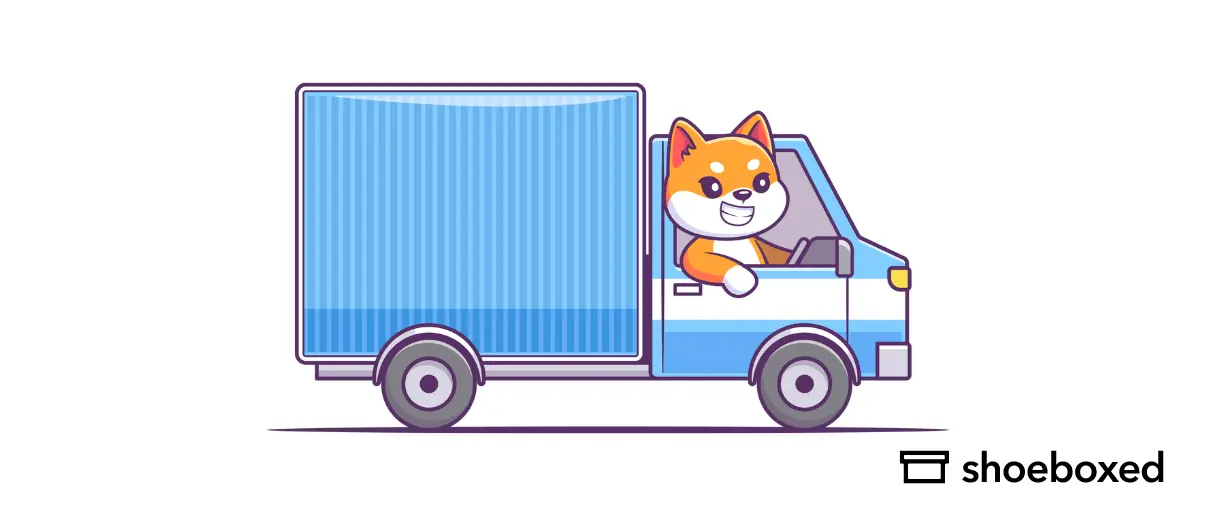
Hannah DeMoss
Published on
September 13th, 2023
Shoeboxed is an expense & receipt tracking app that helps you get reimbursed quickly, maximize tax deductions, and reduce the hassle of doing accounting.
Starting a truck dispatching business can be a rewarding career choice for those interested in the transportation industry.
When you become a truck dispatcher, you’ll play a vital role in coordinating the movement of freight and cargo loads, ensuring timely deliveries, and maintaining open communication with truck drivers and clients.
With the right combination of education, experience, and business acumen, you can build a successful truck dispatcher business and provide valuable services to both truck drivers and freight brokers.
Table of Contents
Is truck dispatching profitable?
While profitability can vary depending on several factors such as experience, location, and the number of clients you serve, truck dispatching can be a lucrative career choice.
Independent truck dispatchers typically earn a percentage of the revenue generated from each load they coordinate.
This percentage can range from 5% to 10% or even higher in some cases.
The more loads a truck dispatcher handles and the higher the revenue generated from these loads, the more money they make.
How do I start independent dispatching?

Learn how to get started as an independent truck dispatcher.
While any profession requires hard work and dedication to master, starting your independent truck dispatching business doesn’t have to be complicated.
Follow the steps below to start independent dispatching:
Step 1. Get the training you need
Hopping onto a career path without knowing anything about the position is a recipe for disaster.
It’s a good idea to pursue initial training for truck dispatchers through online courses or on-site training programs before starting your business.
Some of the best programs include:
LearnDispatch
Dispatcher 101
NDFCA courses
Udemy Truck Dispatch Training for Beginners
These courses can help you learn the ropes of dispatching, improve your communication skills, develop effective negotiation techniques, and learn how to provide excellent customer service.
Step 2. Choose a business structure
When starting a truck dispatching company, you need to choose the right business structure.
The most common options are sole proprietorship, partnership, LLC, or corporation.
Each structure has its own advantages and disadvantages, so it’s important to research and choose the one that best fits your needs.
Here’s a brief overview:
Sole Proprietorship: Simple structure, easy to set up, you as the owner are personally responsible for all business liabilities.
Partnership: Requires at least two partners, shared responsibilities and profits, each partner is personally liable for business debts.
LLC: Offers limited liability protection, provides tax flexibility, easy to manage.
Corporation: Provides the most liability protection, more complex to set up and maintain, subject to double taxation.
Becoming an LLC is the most popular option and can typically be done online for a couple of hundred dollars.
a. Obtaining an Employer Identification Number
After deciding on your business structure, you should apply for an Employer Identification Number (EIN) from the IRS.
This number is crucial for filing taxes, opening a business bank account, and recruiting employees.
The application process for an EIN is straightforward and can be completed online for free.
b. Understanding liability
Your business structure will determine your liability exposure in the truck dispatching business.
Understanding potential risks and liabilities is essential for protecting your personal assets and the company’s financial stability.
Sole proprietorships and partnerships have higher personal liability exposure, while LLCs and corporations offer better liability protection.
For example, an LLC (limited liability company) protects your personal assets by separating them from your business assets in case of legal or financial issues.
A sole proprietorship doesn’t offer these protections.
Key takeaways: Carefully consider your business structure, obtain an EIN, and ensure you have a thorough understanding of liability and protection for a successful and secure truck dispatching business.
Step 3. Obtain insurance and licensing
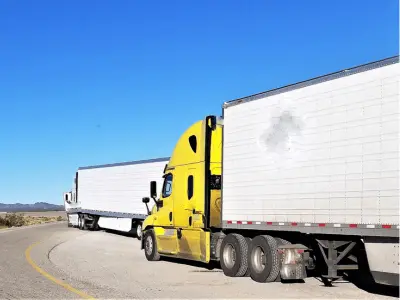
You’ll need to ensure that your business complies with local, federal, and FMCSA regulations.
Starting a truck dispatching business requires understanding and complying with various operating requirements and regulations.
In this section, we’ll discuss the necessary permits and how to ensure compliance with the Federal Motor Carrier Safety Administration (FMCSA) regulations.
a. Acquiring necessary permits
After registering your business as an LLC (or another appropriate business structure) and obtaining an EIN for taxes, you’ll need to check with your local government.
Depending on your location, you may also need specific licenses and permits from local authorities.
Research your local regulations, and consult with the relevant authorities to ensure your truck dispatching company is legally compliant.
b. Compliance with FMCSA regulations
The FMCSA is responsible for overseeing the trucking industry and ensuring safety standards are met.
As a truck dispatcher or freight broker, you’ll need to be familiar with these regulations and ensure that all truck drivers and owner-operators you work with are compliant.
Load boards can be useful tools in staying compliant with FMCSA regulations , as they allow you to find relevant loads and routes for your truck drivers.
Ensuring timely delivery of cargo loads and adhering to transportation routes is essential to maintaining a good standing with the FMCSA.
Make sure to communicate clearly with truck drivers and freight dispatchers about FMCSA regulations.
Key takeaways: Acquiring the proper permits and licenses, along with ensuring compliance with FMCSA regulations, will help your truck dispatching company succeed.
Step 4. Do market and competitor research
To start a successful truck dispatching business, it’s crucial to define your target market.
Research the trucking industry and identify potential customers, such as owner-operators, small trucking companies, and local businesses that depend on freight transportation.
Understanding your target market will help you tailor your services and sales pitch to potential clients, increasing your chances of success.
You’ll also want to do research on your competitors. Find out how much they’re charging and the services they offer to see where you can outperform your local competition.
Step 5. Evaluate initial start-up costs and financial projections
A. start-up costs.
As you build your business plan , it’s essential to evaluate the initial start-up costs for your truck dispatching company.
These costs typically include:
Office space or home office setup.
Computer, printer, phone, and office supplies .
Transportation Management Software (TMS) and load board subscriptions.
Marketing and advertising expenses.
By identifying your start-up costs, you can prepare a realistic budget and determine the necessary capital to launch your business.
b. Financial projections
Creating financial projections for your truck dispatching business is an essential step in your business plan.
To make accurate and realistic projections, consider the following factors:
The number of trucks you plan to dispatch.
Your expected revenue per truck, based on factors such as cargo loads, transport routes, and customer contracts.
Your average salary as an independent truck dispatcher.
Operating costs, such as TMS subscription fees, phone bills, computer maintenance, and your marketing budget.
Once you’ve gathered the necessary data, create a financial forecast for your first year, as well as 3-year and 5-year projections.
These financial projections will help you understand the financial viability of your business and determine the necessary growth to achieve profitability.
Key takeaways: Focus on your target market, evaluate start-up costs, and create realistic financial projections to give your business the best chance for success.
Step 6. Purchase dispatcher software
Choosing the right dispatcher software is a crucial step in starting your truck dispatching business.
These tools help you streamline operations, manage truck drivers , and maintain a strong relationship with your clients.
When choosing a dispatcher software, you’ll want to consider the following features:
Real-time route planning, tracking, load management, and communication with drivers . This allows you to make informed decisions, leading to timely delivery of cargo and satisfied clients.
User-friendliness. The more intuitive and easy-to-use the software is, the more efficiently you can manage your trucks and the loads they carry.
Pricing. As a new business owner, you want to keep your owner-operator expenses low while providing the best service possible. Look for flexible pricing plans and choose a package that suits your budget. Free trials also let you test out the software before committing.
Support and training resources. Choose trucker software that offers comprehensive tutorials and customer support to help you quickly resolve any issues that might arise.
By incorporating these factors into your decision-making process, you’ll be better prepared to find the right dispatcher software for your truck dispatching company.
Keep reading to find out which dispatching software is our favorite!
Step 7. Market your dispatching business

Create an online presence to establish your authority in the industry.
a. Create an online presence
To be successful in any industry, it’s crucial to establish a strong online presence.
Create a professional website for your business where potential customers can learn about your services, your experience in the trucking industry, and any freight dispatcher certifications you may have.
Make sure your website is easy to navigate and showcases your customer service experience.
You’ll also want to develop a solid social media presence to connect with potential customers and industry peers.
Platforms like LinkedIn, Facebook, Twitter, and even YouTube can be great places to share informative content about the transportation industry.
Engaging with your online audience regularly helps build trust and keeps you at the forefront of customers’ minds when they need truck dispatching services.
b. Develop a marketing plan
You’ll need a strong marketing plan to attract and retain customers.
Start by identifying your target audience such as truck drivers, owner-operators, small trucking companies, or freight brokers.
Focus on the unique selling points of your truck dispatching business.
These may include:
Efficient communication skills.
Extensive knowledge of transport routes.
Experience in conducting negotiations to secure the best loads and rates.
Load boards, like DAT or Convoy , are an essential tool for truck dispatchers to source potential clients and find loads.
You can also connect with potential customers by reaching out to local businesses.
Be sure to develop a compelling sales pitch that clearly communicates the advantages of partnering with your truck dispatching company.
Step 8. Build relationships with shippers and carriers
As a truck dispatcher, building relationships with shippers and carriers is key.
This section will cover finding shippers and connecting with carriers to help get your name out there.
a. How to find shippers
There are a few ways to find shippers, but we recommend starting by finding manufacturers and suppliers in your area.
Create a list of potential clients, and reach out to them with a polished sales pitch that highlights your experience and skills in the trucking industry.
You can also do the following:
Attend industry events . Trade shows and conferences offer opportunities to meet shippers and other key players in the transportation industry. Here, you can network, learn about industry trends, and showcase your dispatch services.
Use online job boards and social media platforms to search for shippers looking for truck dispatchers.
Follow industry-specific groups and pages and actively participate in discussions to demonstrate your knowledge and gain visibility.
b. Connecting with carriers
To build relationships with carriers, you can:
Attend trucking industry events. Meet truck drivers, owner-operators, and representatives from trucking companies.
Use load boards and online forums to find carriers that are in need of truck dispatchers.
Make connections and exchange contact information to build a network of carriers you can rely on.
Becoming a dispatcher | Truck Dispatcher Training
See also: How to Start Owner Operator Trucking Business in 4 Steps
Tools for a successful truck dispatching business
Software and the right tools can help you manage your fleets and automate back-office tasks.
Here’s a quick rundown of our favorite software for truck-dispatching businesses:
1. Shoeboxed – Best for receipt management
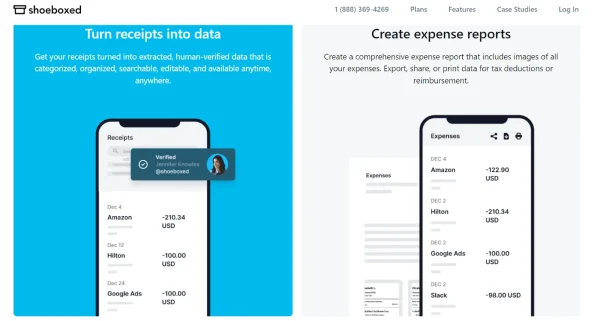
Manage your receipts with the Shoeboxed app.
Shoeboxed is a receipt-scanning app and service that lets you snap photos of, categorize, and create expense reports for receipts on the go.
The app creates digital copies of your expenses so you never have to worry about losing another receipt and always have an accurate record of business purchases.
In fact, Shoeboxed is already used and trusted by truckers all over the country for those very reasons!
So, what are Shoeboxed’s other features, and how can they help truck dispatchers?
a. The Magic Envelope
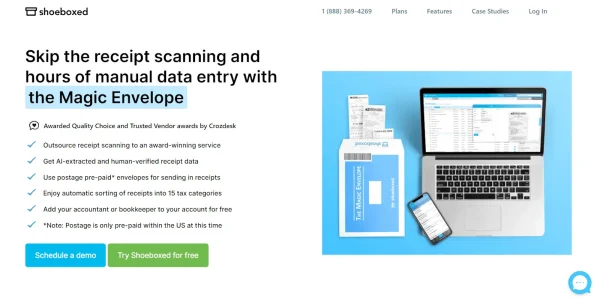
Outsource your receipt scanning with the Magic Envelope service.
Shoeboxed offers a mail-in receipt scanning service called the Magic Envelope that offers dispatchers a “set and forget” solution for receipt management.
When you sign up for Shoeboxed online, you’ll receive a postage-pre-paid Magic Envelope to stuff receipts inside and mail out at the end of the month.
Once your receipts reach the Shoeboxed facility, they’re scanned, human-verified for accuracy, and uploaded to your account under 15 editable tax categories.
Let Shoeboxed do the scanning for you. They will scan your receipts and other important documents with The Magic Envelope.
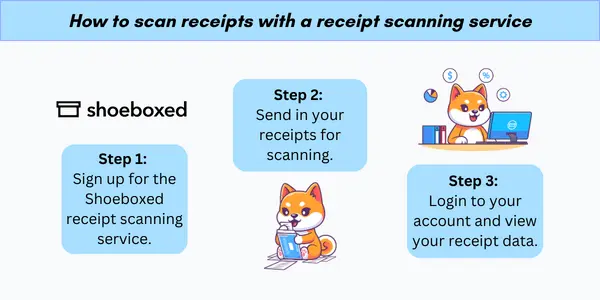
Shoeboxed is the only receipt scanner app that will handle both your paper receipts and your digital receipts—saving customers up to 9.2 hours per week from manual data entry!
Break free from paper clutter ✨
Use Shoeboxed’s Magic Envelope to ship off your receipts and get them back as scanned data in a private, secure cloud-based account. 📁 Try free for 30 days!
b. Expense reports
Once your receipts are added to your account, you can create a detailed expense report at the end of the year to send to your accountant.
Expense reports come with images of receipts attached as proof of purchase.
c. Accounting software integrations
Shoeboxed integrates with QuickBooks, Xero, and Wave to make accounting for truckers and those in the trucking industry a breeze
Effortlessly transfer and organize your receipts in your accounting software for tax prep and filing.
Used and trusted by those in the trucking industry.
Offers custom plans so you can get a tailor-made solution for your business (contact customer support).
Use the Magic Envelope to outsource your receipt scanning and expense management.
Built-in mileage tracker that includes miles in expense reports.
If you employ truckers, add them to your account to track employee expenses.
Add an unlimited number of users to a single account for FREE.
Scan receipts on the go with the Shoeboxed app. You’ll never lose another receipt !
Not just for receipts. Scan copies of other business-related documents for safekeeping.
Integrates with software, such as QuickBooks, for tax reporting and accounting purposes.
Plans that include the Magic Envelope are only available for purchase online.
Plans that include the Magic Envelope start at $18/month, up to $54/month. Plans that include the Magic Envelope are available for purchase on desktop only.
30-day free trial.
Turn receipts into data for tax time ✨
Try Shoeboxed’s systematic award-winning approach to receipt tracking for tax season. Try free for 30 days!
2. Fleetio – Best modern dispatching features
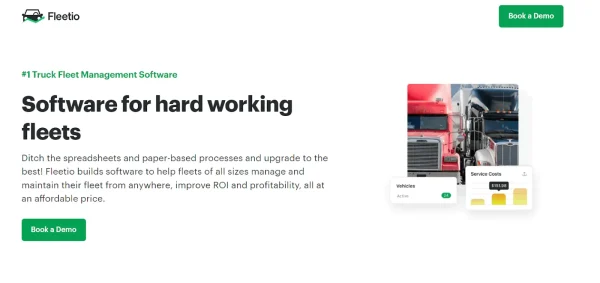
Fleetio for truck dispatching.
Fleetio “…Builds software to help fleets of all sizes manage and maintain their fleet from anywhere, improve ROI and profitability, all at an affordable price.”
This software is a comprehensive fleet management platform that can help you streamline your truck dispatching business.
With Fleetio, you can track all aspects of your fleet operations, including vehicle maintenance, fuel consumption, and driver performance.
This valuable information will enable you to make data-driven decisions to improve efficiency, reduce costs, and maintain a high level of service for your customers.
Fleetio also offers a mobile app, making it easy for you to manage your fleet on the go.
Effectively collaborate with everyone on your team.
An unlimited number of users.
Web access and mobile app.
Automated processes reduce the need for manual data entry.
Trusted by Subaru, 1-800-GOT-JUNK, and other big names.
Pricing isn’t transparent.
Book a demo for pricing information.
3. Q7 – Best end-to-end software
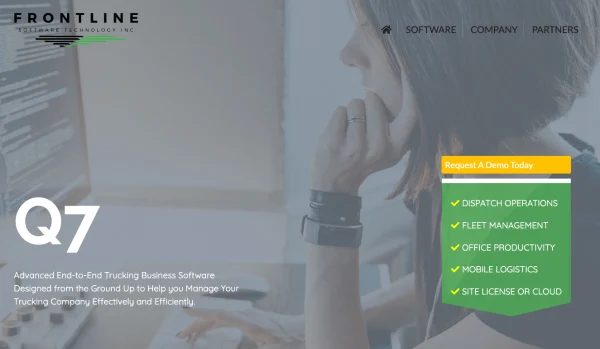
Q7 is the best all-in-one software solution for the trucking industry.
Q7 is a powerful trucking management software that can help you take control of your truck dispatching business.
Some of its many features include load management, dispatching, billing, and accounting. Q7 can help you streamline your operations, increase efficiency, and ultimately improve your bottom line.
Additionally, Q7 offers integrations with popular load boards, giving you access to a wide range of loads for your truck drivers and helping to grow your business.
End-to-end trucking industry software.
Mobile app and web dashboard.
Safety, billing, accounting, dispatch, trucking payroll software, and more.
The software is pretty dated compared to other options.
Can be complex to use. You’ll likely need to reference Q7 materials to learn the ropes.
Request a demo for pricing.
Hit the road with Shoeboxed ⛟
Stuff receipts into the Magic Envelope while on the road. Then send them in once a month to get scanned. Expense reports don’t get easier than this! 💪🏼 Try free for 30 days!
Frequently asked questions
To start independent dispatching, you need to have a solid understanding of the trucking industry and develop strong communication skills. Gain experience by working with a trucking company or taking online courses to enhance your knowledge. Then, set up your business structure, such as a limited liability company, and establish your services and fees.
How many trucks can one dispatcher handle?
On average, a dispatcher can manage anywhere between 30 to 50 trucks. That said, the number of trucks a dispatcher can handle varies depending on their experience, efficiency, and the complexity of the loads and transport routes.
In conclusion
Starting a truck dispatching business requires dedication, industry knowledge, and effective marketing strategies.
As an aspiring truck dispatcher, it’s essential to gain experience in the trucking industry, familiarize yourself with load boards, and establish connections with truck drivers and trucking companies.
Pursuing relevant education, such as online courses or obtaining an associate’s or bachelor’s degree, can further enhance your skills in the transportation industry.
Hannah DeMoss is a staff writer for Shoeboxed covering organization and digitization tips for small business owners. Her favorite organization hack is labeling everything in her kitchen cabinets, and she can’t live without her mini label maker machine.
About Shoeboxed!
Shoeboxed is a receipt scanning service with receipt management software that supports multiple methods for receipt capture: send, scan, upload, forward, and more!
You can stuff your receipts into one of our Magic Envelopes (prepaid postage within the US). Use our receipt tracker + receipt scanner app ( iPhone , iPad and Android ) to snap a picture while on the go. Auto-import receipts from Gmail. Or forward a receipt to your designated Shoeboxed email address.
Turn your receipts into data and deductibles with our expense reports that include IRS-accepted receipt images.
Join over 1 million businesses scanning & organizing receipts, creating expense reports and more—with Shoeboxed.
Try Shoeboxed today!
Turn business receipts into data & deductibles
Join over 1 million businesses scanning receipts, creating expense reports, and reclaiming multiple hours every week—with Shoeboxed.
How to Start a Truck Dispatching Business in 7 Simple Steps

If you are interested in learning how to become a truck dispatcher, but don’t know how to get started, you are in the right place.
In this article, I am going to cover step-by step how you can start your own truck dispatching business. It’s geared toward complete beginners, so I’ll be covering the basics in a way that will be easy to understand and follow.
I will begin by answering introductory questions like what is a truck dispatching business, can it be done from home, how much can you make doing this, what are the expected start-up costs, and so on.
I’ll then tackle the actual steps to setting up this business, including business entity formation, licenses, funding, marketing and more.
We’ve got a lot to cover, so let’s get into it.
This post may contain affiliate links. If you click on a link and complete a transaction, I may make a small commission at no extra cost to you.
The information contained in this post is for informational purposes only. It is not a recommendation to buy or invest, and it is not financial, investment, legal, or tax advice. You should seek the advice of a qualified professional before making any investment or other decisions relating to the topics covered by this article.
What Is A Truck Dispatching Business?

A truck dispatching business is a business that manages freight on behalf of a carrier, which may be an individual trucker operating as an owner-operator or a larger enterprise, such as a trucking business that owns a fleet of vehicles. This business finds loads for the carrier using load boards, connections with brokers and shippers, and other methods for securing loads.
The truck dispatcher conducts negotiations for the load and ultimately dispatches drivers and sets up routes.
It’s important to note that truck dispatchers are different from freight brokers. A truck dispatcher exclusively represents and works on behalf of carriers, while a freight broker acts as a middleman between shippers (or manufacturers) who need freight delivered and carriers who are willing to deliver the freight.
Freight brokers may represent both sides, while a truck dispatcher may only represent carriers.
Can I Run a Truck Dispatching Business From Home?
You can run a truck dispatching business from home because the key tasks involve finding loads on your computer, calling and negotiating with shippers, and handling various administrative responsibilities such as setting up routes with drivers and recordkeeping, all of which may be done in the comfort of your home.
To do this, however, you will need some basic equipment, such as a computer, printer and phone, and a suitable space in your home for operating the business.
How Much Do Truck Dispatchers Make?
According to Ziprecruiter , independent truck dispatchers make on average $66,012 per year, with the low end of the range starting at $20,500 and the high end capping off at $273,500.
That’s a wide range, and how much you actually make will vary based on many factors, including how much you charge carriers for your services, how many carriers you represent, the number of loads you provide, and your marketing and other operating expenses.
How Do Truck Dispatchers Make Money?
Truck dispatchers generally get paid by taking a percentage of earnings from each load they find for their clients. Although some dispatchers may change a flat fee, most will require a percentage of the take, which is typically between 5%-10% for each load.
How Much Does It Cost to Start a Truck Dispatching Business?

Starting costs for a truck dispatching business run from $1,000 to $2,500, which is modest compared to many other business. That’s because this type of business can be operated from home with basic equipment that most people already have.
What Do I Need to Start a Truck Dispatching Business? [Incl. Cost Breakdown]
To start a truck dispatching business you will need certain equipment and tools (including data management tools and load boards). These include a computer, printer, phone, office supplies as well as online subscriptions to Transportation Management Software (TMS) and load boards .
Computer or Laptop : Depending on what type of computer you get, you are talking anywhere between $300 – $1,000 for a reasonably priced computer. You probably already have one though, so most folks will be able to ignore this cost.
Printer : You can get a basic printer for anywhere between $150 to $300, although if you shop around you can score some that are cheaper than that.
Phone : I assume you have a phone, but you should get a dedicated business line. You can get one for cheap through Google Voice for like $10 per month.
Business Set Up Costs : If you choose to operate an LLC or other business entity, there will be costs associated with that and there may be permits and licenses you need to get from your state or other governmental entity that can also carry some cost. Additionally, if you set up a website for your business and decide to market your business, those activities will also cost you some money.
All in, you can expect to spend around $500 or so for these types of costs, although the scope and type of marketing can significantly increase that amount.
Online Courses : If you choose to invest in a truck dispatching course, this will bump up your costs a little. I have found courses on Udemy that are under $20, but most online courses I found range between $150 to $400.
Transportation Management Software : This is software that helps you organize all of your dispatch information and is a key tool to help you keep everything straight in your truck dispatching business. In general, this type of software runs between $100-$200 per month.
Connect Team is a cheaper option for a truck dispatcher because it won’t include a lot of the functionality that a freight broker uses, but still offers pretty good options to run your business efficiently. As of the date of this writing, plans run from $30 to over $100.
Basic Office Supplies : These are things like paper, pens, staplers, and so on. All in, you are talking about $20.
Load Board : One of the best ways to find loads for your clients is by searching through load boards. To find the best and highest paying loads, you should invest in a quality load board subscription. For a premium load board, you are looking at around $40 per month for a basic subscription.
My Load Board Recommendation:
If you don’t know where to start, DAT is a clear market leader, with approximately 1.37 million loads posted daily.
Due to their immense size and scope, they are able to offer leading edge tech and info, including unlimited searching, instant alarm match notifications, broker credit scores, days to pay, market rates, mileage routing and much more.
Despite their dominant place in the market, I think their pricing is reasonable and it’s actually in line with other premium paid load boards. As of this writing, DAT offers the following plans:
- DAT TruckersEdge: Standard ($45/month) – includes unlimited truck posts and load searches, load match alarms, month to month billing, mileage and routing features, broker credit data and load counts by state.
- DAT TruckersEdge: Enhanced ($85/month) – includes all standard features plus the ability to call and search for loads (for when you are on the road), and average rates for lanes you are searching (30 day).
- DAT TruckersEdge: Professional ($135/month) – includes all Enhanced features plus average rates for past 15 days, access to Tri-Haul (which suggests higher paying routes with triangular route suggestions), DAT Assurance (which helps you collect past due accounts), and North American database (which includes Canadian loads)
There are higher tier plans available for companies with multiple trucks (Power Select Carrier) and multiple dispatchers (Power Office Carrier).
I have an affiliate relationship with DAT and secured a deal where if you use my link, you can get a free 30 day trial for any of their plans. So, you get to try out this industry-leading load board for a full month for free. I would note that this deal is only for new subscribers. Moreover, you have no long-term commitments, so you can cancel your subscription at any time.
Simply click on the banner below to take advantage of this no-risk offer.
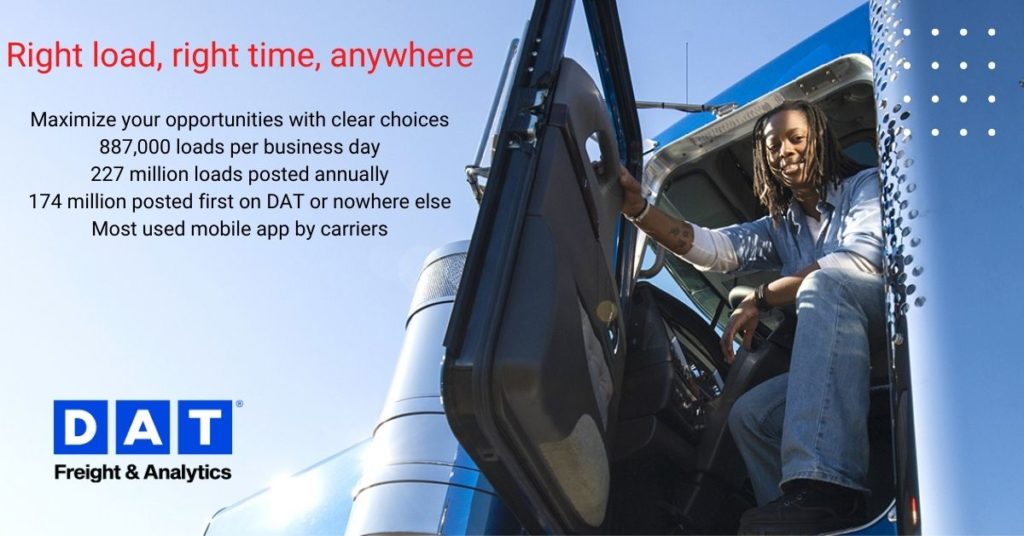
Ok, now that we’ve got the introductory stuff out of the way, let’s get into the nuts and bolts of setting up your truck dispatching business.
Step 1: Get Trained As a Truck Dispatcher
Before you start any meaningful enterprise, it’s always a good idea to understand the business and how it operates. One of the best ways to do this is first hand experience. So you may want to get trained as a truck dispatcher by working for a truck dispatching company or freight broker.
You will learn the ins and outs of the business, including how to navigate a load board, how to negotiate loads, how to set up efficient routes, and more. Plus you will get paid in the process!
Of course, once you become familiar with how this all works, you can confidently strike out on your own.
If you don’t have the time or desire to do this preparatory work, you can look into a truck dispatching course. There are many out there and a simple Google search will yield a lot of options for you to explore. In my view, a course is never as good a real world experience, but it’s probably a whole lot better than diving into the business blind.
Step 2: Get Appropriate Licenses in Place [Do You Need a License to Be a Truck Dispatcher?]
Although you will generally not need a formal or special license to operate as a truck dispatcher, your state may require a general business license if you are going to be operating a commercial enterprise.
You should check your state and local laws to find out for sure what you will need.
Now the story is different if you are operating a freight brokering business. Freight brokers involved in interstate commerce need to get their broker authority from the Federal Motor Carrier Safety Administration (FMCSA) and will need to meet other highly regulated requirements.
Step 3: Set Up Your Truck Dispatching Business
Select your business name and logo.
The first step in establishing your truck dispatching business is selecting a name and logo that you like.
Having trouble figuring out a name? Try Shopify’s business name generator . It’s free.
As for a logo, you can go on canva.com and check out some of their logo templates and start from there. It’s a free option, but you will need to customize the logo templates to your liking. If you prefer a more ready-made solution, you can pay a little bit and outsource this.
I like Looka . They are an AI-powered platform that will provide you a professional looking logo at reasonable prices.
Note : You want to make sure your name and logo are original to you and are not going to infringe someone else’s intellectual property. If you are unsure, you can check the USPTO’s trademark search tool as a starting point.
For more great strategies and tips on how to select the right name and logo for your business, check out my full article on the topic: How to Choose a Company Name and Logo [16 Key Strategies and Tips] .
Create a Website For Your Truck Dispatching Business
Don’t neglect this step. Your business needs a website, period. Especially if you want potential customers to find you online.
Your website doesn’t have to be incredibly fancy or cost a lot of money to set up. There are a lot of resources available to help you with this.
In fact, Google allows you to build your first business profile website for free .
List Your Truck Dispatching Business So Customers Can Find You
It is also important to get your fledgling business on Google. You can do this by listing it on Google My Business. This way, people who are searching for a truck dispatching business in your local area can find you.
If you want to learn more about how to do this, check out this tutorial from Google .
Set Up Your Business Entity
You may want to set up a business entity like an LLC, corporation, or partnership for your truck dispatching business. Why do this? In most cases, setting up a business entity can help shield some of your assets held outside the business entity if there is a claim against the business.
If you want to make the investment of setting up a corporation, LLC, or some other business entity, you can hire a lawyer to help you, or you can use many of the online resources that can help you set up your business entity. For a handy table comparing the different types of business entities, check out my ultimate guide to starting a business .
I like Northwest because they can get you up and running quickly and easily. They are also one of the most affordable options that I was able to find that still offered great customer service ($39 as of the date of this article).
According to their website, they are the only national registered agent service that lets you use their office address so you don’t have to use your own. That’s a killer privacy advantage.
Definitely worth checking out.

Note : This can be a fairly complicated area and you don’t want to make mistakes, so you may want to consult with your legal and financial advisors to make sure you understand the implications of setting up a business entity.
Step 4: Open Up A Business Checking Account and Credit Card
You should open a dedicated checking account in the name of your truck dispatching business. Make sure to run all business revenue and expenses (and only business revenue and expenses) through that account. This is especially important if you have a formal legal entity like a corporation or LLC because you do not want to mingle personal assets and expenses with business assets and expenses.
Why? Because you may risk losing the liability protection we discussed earlier if the business entity is deemed a sham because you did not treat it like a separate legal entity.
On a more practical note, having a separate account keeps things tidy from a recordkeeping and accounting perspective. It will definitely make things easier come tax time. It also signals credibility and professionalism when you write a check from your business account or ask someone to pay to your business account.
If you don’t know where to get started, check out Novo .
They are perfect for new small businesses because they offer no monthly fees or minimum balances, and give you unlimited ATM fee refunds. On top of that, they give you access to tons of other free perks, like major discounts on places like Stripe, Quickbooks and Google Ads.
In my opinion, they are one of the best options in the market.

Now, let’s turn to business credit cards. Credit cards can be really helpful to a new truck dispatching business, especially if unexpected expenses pop up or you want to expand.
First, they are often easier to qualify for than a line of credit, especially when you are a brand new business. Even if you don’t need to use it right away, it’s nice to have the funds available in a pinch. Second, it’s a great way to build your business credit rating, which will come in handy if you need to apply for a loan in the future to expand your business, etc.
Step 5: Buy Necessary Equipment and Software
As we discussed, you will need to purchase certain equipment and subscriptions and we covered in a lot of detail exactly what you’ll need. Hunt around for the best deals and set everything up properly so you can have a successful launch.
Step 6: Market Your Business
A good marketing plan is critical to your business’ success.
After all, if no one knows that your business exists, you may as well pack it up because no one will be buying anything from you. So what are some of the best ways to spread awareness and keep the customers coming in?
In today’s market, you cannot ignore online marketing. If you don’t know how to start, do the following:
- Set up a Google My Business, so that people looking for your type of business can find you. You want to encourage people to leave good reviews there for you if they like your business. Research has found a strong relationship between the number of online reviews a business and the revenue that it generates.
- Get a great website that draws traffic to your business. You can use the free website offered by Google that we mentioned earlier, but if you really want to draw traffic (and customers) to your website, you may want to hire an online marketing expert to help you optimize your website for traffic and leads.
- Get on Yelp for business and let your customers find you. They are an extremely well-known brand, and many people look there when searching for local businesses. Check them out below to learn more.
- In addition to advertising on Yelp , you can buy online ads from other online and social media outlets (Facebook, etc.)
If you have connections with people in the trucking industry, word of mouth is a great way to drum up business. Reach out to folks and ask them to refer people to you.
You can also research what your competitors are doing when it comes to marketing their products or services and learn from them.
Ultimately, you want to experiment with various marketing strategies – you may be surprised at what works best.
Step 7: Get Insurance in Place
As a truck dispatcher, you will want to be adequately protected against claims if things go sideways in your business. Thus it is important to get appropriate insurance for your business.
Now because you are not operating the trucks, you will not need the same type of liability and cargo insurance that your carriers will be required to hold, but a general business insurance policy may make sense.
So there you have 7 simple steps to starting your truck dispatching business and some great tips on how to implement each of them. If you are looking for other great business ideas in the transportation sector, check out my article on Transportation Business Ideas That Work , where I discuss more than 30 amazing business ideas in the transportation and trucking industry.
Related Posts
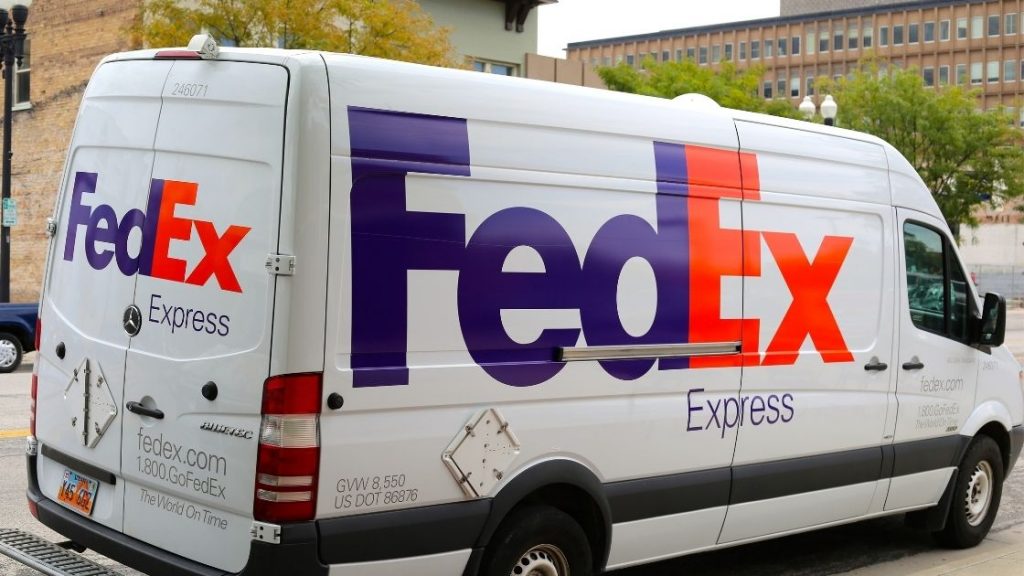
FedEx Routes For Passive Income: A Beginner’s Guide
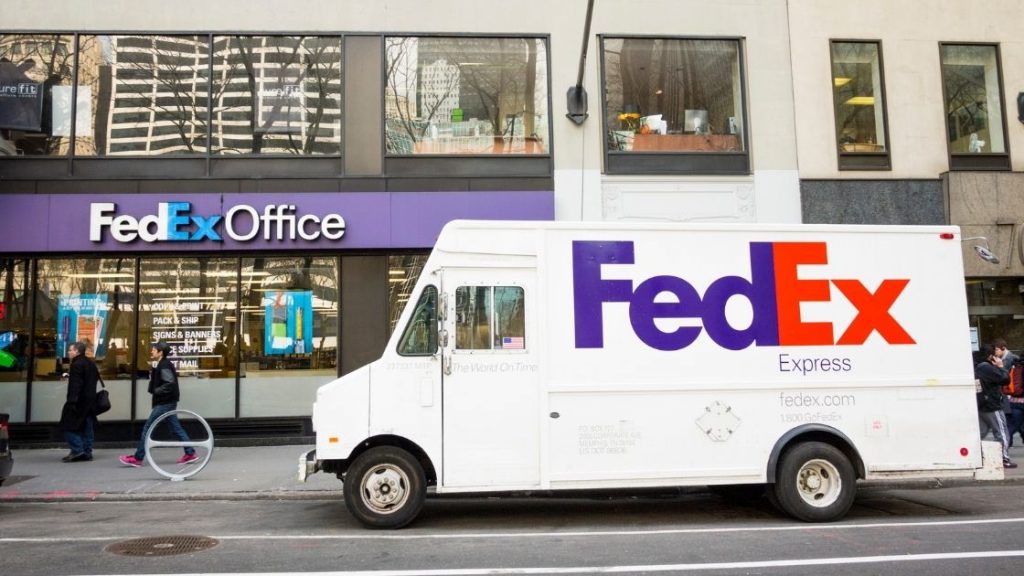
How to Buy A FedEx Route in 5 Easy Steps

Trucking Business Plan Template
Written by Dave Lavinsky
Trucking Company Business Plan
You’ve come to the right place to create your trucking business plan.
We have helped over 100,000 entrepreneurs and business owners create business plans and many have used them to start or grow their trucking companies.
Trucking Business Plan Example
Below is a sample trucking business plan template to help you write a trucking business plan for your own company.
Executive Summary
Business overview.
On The Road Trucking (OTRT) is a new trucking company located in Dallas, Texas. The company was founded by Michael Williams, a trucking and logistics professional who has over 20 years of management experience in trucking and logistics. Michael is confident in his ability to effectively negotiate contracts, oversee drivers and employees, and minimize costs as he ventures out to start his own trucking company. Michael plans on recruiting a team of highly qualified drivers, sales representatives, client relationship managers, and dispatchers to carry out the day-to-day operations of the company.
On The Road Trucking will provide a comprehensive array of trucking and logistics services for any business or individual in need of freight distribution. OTRT will use the latest technology to ensure that every shipment is distributed efficiently and handled with the best of care. On The Road Trucking will be the ultimate choice in the Dallas, Texas area for customized trucking services.
Product Offering
The following are the services that On The Road Trucking will provide:
- Dedicated fleet services
- Flatbed transportation services
- Local distribution services
- Logistics services
- Warehousing services
Customer Focus
On The Road Trucking will target all businesses and individuals in need of freight services. OTRT will begin by targeting small business owners in need of distribution services and individuals in need of shipping services who may not be able to get service from a larger trucking company because their shipment size is too small. No matter the client, On The Road Trucking will deliver a customer-centric experience where they will customize each shipment to match the customer’s specific requirements.
Management Team
On The Road Trucking will be owned and operated by Michael Williams. He has recruited another experienced trucking professional and former CPA, Steve Brown to be the CFO of the new company and manage the financial oversight of the accounting department.
Michael Williams is a graduate of the University of Texas with a Bachelor’s degree in Business Management. He has been working at a local trucking company for over two decades as a Transportation Manager, and is well-versed in all aspects of the trucking industry. Micheal’s organizational skills and customer-first approach have garnered his reputation for being a cost-effective logistics manager with high standards for customer service.
Steve Brown has been the accounting manager for a local trucking company for over ten years. Prior to his experience in trucking, Steve worked as a CPA in a local tax firm. Michael relies strongly on Steve’s attention to detail, diligence, and focus on cost-saving solutions.
Success Factors
On The Road Trucking will be able to achieve success by offering the following competitive advantages:
- Proactive, helpful, and highly qualified team of sales representatives and dispatchers that are able to effectively navigate the journey of both customers and drivers.
- Customized service that allows for a small business or an individual to have their requirements accommodated. On The Road Trucking takes care of everything from truck inspections and maintenance to scheduling drivers, loading/unloading, and short-and-long range distribution.
- On The Road Trucking offers the best pricing for customized and small shipments compared to the competition.
Financial Highlights
On The Road Trucking is seeking $300,000 in debt financing to launch its trucking business. The funding will be dedicated towards securing the warehouse and purchasing the trucks. Funding will also be dedicated towards three months of overhead costs to include payroll of the staff, rent, and marketing costs for the print ads and association memberships. The breakout of the funding is below:
- Warehouse build-out: $50,000
- Trucks, equipment, and supplies: $20,000
- Three months of overhead expenses (payroll, rent, utilities): $180,000
- Marketing costs: $30,000
- Working capital: $20,000
The following graph below outlines the pro forma financial projections for On The Road Trucking.

Company Overview
Who is on the road trucking .
On The Road Trucking is a newly established trucking company in Dallas, Texas. On The Road Trucking will be the most reliable, secure, and efficient choice for small business owners and individuals in Dallas and the surrounding communities. OTRT will provide a personalized approach to trucking services for anyone in need of freight transportation. Their full-service approach includes comprehensive truck driver oversight, short-distance distribution, small shipments, and customized service.
On The Road Trucking’s team of professionals are highly qualified and experienced in trucking and logistics operations. OTRT removes all headaches that come with dealing with trucking companies and ensures all issues are taken care off expeditiously while delivering the best customer service.
On The Road Trucking History
OTRT is owned and operated by Michael Williams, a long-time trucking and logistics professional who has a Business Management degree. He worked at a local trucking company for over two decades where he served as Lead Transportation Manager for the last five years, and is well-versed in all aspects of the trucking and transportation industry. Micheal used his industry expertise to reach out to potential customers who may need small-size distribution services that are not offered by larger trucking businesses and letting them know about the services OTRT will offer.
Since incorporation, On The Road Trucking has achieved the following milestones:
- Registered On The Road Trucking, LLC to transact business in the state of Texas.
- Identified the target location for the warehouse.
- Contacted numerous small businesses to let them know about the services that will be offered.
- Began recruiting drivers, sales representatives, and dispatchers.
On The Road Trucking Services
The following will be the services On The Road Trucking will provide:
Industry Analysis
As the primary source of land freight distribution in the United States, the trucking industry is a $730B industry.
There are approximately 900,000 available truck drivers across the country. The demand for drivers is much higher than the supply, which means there is a lot of opportunity for new companies to recruit people to become truck drivers by offering them better incentives than currently being offered by larger trucking companies. Additionally, a new trend in trucking is the increasing popularity of shorter or local hauls compared to long-distance. This poses an opportunity for companies to cater to the customers demanding short-distance hauls.
Some challenges for trucking industry operators include rising fuel costs and an increased use of online booking and monitoring technology, which can leave traditional companies behind if they are using outdated systems. New entrants can benefit from using the latest technology from the outset, providing drivers with incentives to work with them, and implementing cost-effective solutions to reduce their fuel costs.
Customer Analysis
Demographic profile of target market.
On The Road Trucking will target anyone in need of trucking services in Dallas, Texas and surrounding areas. Primarily, the company will target small businesses and individuals that may need local distribution or have small size hauls. Below is a snapshot of this market.
Customer Segmentation
OTRT will primarily target the following customer profiles:
- Small business owners
- Small manufacturing companies
- Individuals in need of freight transportation services
Competitive Analysis
Direct and indirect competitors.
On The Road Trucking will face competition from other companies with similar business profiles. A company description of each competitor is below.
Texas Truck Services
Texas Truck Services provides trucking services, logistics services, freight distribution, and warehousing services. Located in Dallas, Texas Truck Services offers local service to the Dallas area. Texas Truck Services’s team of experienced professionals assures the hauls are run smoothly, freeing the customer from worry over whether their shipments will arrive on time and in good condition.
US Trucking & Logistics
US Trucking & Logistics is a Dallas-based trucking and logistics company that provides freight distribution services for small businesses across Texas. The management team is composed of former truck drivers and business management professionals who are familiar with the trucking industry in Texas. US Trucking & Logistics uses electric vehicles to reduce its fuel costs, which allows the company to pass these savings on to its customers.
Best Trucking
Best Trucking is a trusted Dallas-based trucking company that provides superior trucking and logistics service to customers in Dallas and the surrounding areas. Best Trucking provides shipping, receiving, packaging, and disposal services. The Best Trucking team of logistics experts ensures that each shipment is delivered with the highest security standards and that the entire freight process is smooth and seamless for its customers.
Competitive Advantage
On The Road Trucking will be able to offer the following advantages over their competition:
- Friendly, knowledgeable, and highly qualified team of trucking and logistics experts with extensive experience in the field.
- Use of the latest trucking and logistics technology to ensure each haul is handled with the best of care and delivered efficiently.
- On The Road Trucking offers local distribution and takes small hauls that may be denied by larger trucking companies.
Marketing Plan
Brand & value proposition.
On The Road Trucking will offer the following unique value propositions to its clientele:
- Highly-qualified team of skilled employees that is able to provide a comprehensive set of trucking services (shipping, receiving, monitoring, short-distance, small hauls).
- Customized approach to freight distribution, leveraging technology and flexibility to provide the highest quality of service to its customers.
Promotions Strategy
The promotions strategy for On The Road Trucking is as follows:
Word of Mouth/Referrals Michael Williams has built up an extensive list of contacts over the years by providing exceptional service and expertise to his clients. Once Michael advised them he was leaving to open his own trucking business, they committed to follow him to his new company and help spread the word of On The Road Trucking.
Professional Associations and Networking On The Road Trucking will become a member of Texas Trucking Association (TTA), and American Trucking Association (ATA). They will focus their networking efforts on expanding their client network.
Print Advertising On The Road Trucking will invest in professionally designed print ads to include in industry publications.
Website/SEO Marketing On The Road Trucking will utilize their in-house marketing director that designed their print ads to also design their website. The website will be well organized, informative, and list all their services. The website will also list their contact information and provide information for people looking to become drivers. The marketing director will also manage the company’s website presence with SEO marketing tactics so that anytime someone types in the Google or Bing search engine “Dallas trucking company” or “trucking near me”, On The Road Trucking will be listed at the top of the search results.
The pricing of On The Road Trucking will be moderate and on par with competitors so customers feel they receive value when purchasing their services.
Operations Plan
The following will be the operations plan for On The Road Trucking.
Operation Functions:
- Michael Williams will be the Co-Owner and President of the company. He will oversee all staff and manage client relations. Michael has spent the past year recruiting the following staff:
- Steve Brown – Co-Owner and CFO who will be responsible for overseeing the accounts payable, accounts receivable, and managing the accounting department.
- Beth Davis – Staff Accountant will provide all client accounting, tax payments, and monthly financial reporting. She will report directly to Steve Brown.
- Tim Garcia – Marketing Manager who will provide all marketing, advertising, and PR for OTRT.
- John Anderson – Safety Manager who will provide oversight on all maintenance and safety inspections of the vehicles and drivers.
Milestones:
On The Road Trucking will have the following milestones complete in the next six months.
7/1/2022 – Finalize lease on warehouse
7/15/2022 – Finalize personnel and staff employment contracts for the management team
8/1/2022 – Finalize contracts for sales representatives, dispatchers, and initial drivers
9/15/2022 – Begin networking at industry events
10/22/2022 – Begin moving into On The Road Trucking warehouse and securing trucks
11/1/2022 – On The Road Trucking opens for business
Michael Williams is a graduate of the University of Texas with a Bachelor’s degree in Business Management. He has been working at a local trucking company for over two decades, most recently as a Transportation Manager, and is well-versed in all aspects of the trucking industry. Micheal’s organizational skills and customer-first approach have garnered his reputation for being a cost-effective logistics manager with high standards for customer service.
Financial Plan
Key revenue & costs.
The revenue drivers for On The Road Trucking are the trucking fees they will charge to the customers for their services. Most trucking companies charge a per-mile rate. Average per-mile rates vary, but are typically between $2.30-3.30.
The cost drivers will be the overhead costs required in order to staff a trucking operation. The expenses will be the payroll cost, rent, utilities, fuel and maintenance for the trucks, and marketing materials.
Funding Requirements and Use of Funds
Key assumptions.
The following outlines the key assumptions required in order to achieve the revenue and cost numbers in the financials and in order to pay off the startup business loan.
- Number of Trucks in Fleet: 10
- Average Fees per Truck per Month: $20,000
- Warehouse Lease per Year: $100,000
Financial Projections
Income statement, balance sheet, cash flow statement, trucking business plan faqs, what is a trucking business plan.
A trucking business plan is a plan to start and/or grow your trucking business. Among other things, it outlines your business concept, identifies your target customers, presents your marketing plan and details your financial projections.
You can easily complete your trucking business plan using our Trucking Business Plan Template here .
What are the Main Types of Trucking Companies?
There are a number of different kinds of trucking companies, some examples include: For- Hire Truckload Carriers, Less Than Truckload Carriers, Hotshot Truckers, Household Movers and Inter-Modal trucking.
How Do You Get Funding for Your Trucking Business Plan?
Trucking companies are often funded through small business loans. Personal savings, credit card financing and angel investors are also popular forms of funding. This is true for a business plan for a trucking company and a transportation business plan.
What are the Steps To Start a Trucking Business?
Starting a trucking business can be an exciting endeavor. Having a clear roadmap of the steps to start a business will help you stay focused on your goals and get started faster.
1. Develop A Trucking Business Plan - The first step in starting a business is to create a detailed trucking business plan that outlines all aspects of the venture. Starting a trucking company business plan should include potential market size and target customers, the services or products you will offer, pricing strategies and a detailed financial forecast.
2. Choose Your Legal Structure - It's important to select an appropriate legal entity for your trucking business. This could be a limited liability company (LLC), corporation, partnership, or sole proprietorship. Each type has its own benefits and drawbacks so it’s important to do research and choose wisely so that your trucking business is in compliance with local laws.
3. Register Your Trucking Business - Once you have chosen a legal structure, the next step is to register your trucking business with the government or state where you’re operating from. This includes obtaining licenses and permits as required by federal, state, and local laws.
4. Identify Financing Options - It’s likely that you’ll need some capital to start your trucking business, so take some time to identify what financing options are available such as bank loans, investor funding, grants, or crowdfunding platforms.
5. Choose a Location - Whether you plan on operating out of a physical location or not, you should always have an idea of where you’ll be based should it become necessary in the future as well as what kind of space would be suitable for your operations.
6. Hire Employees - There are several ways to find qualified employees including job boards like LinkedIn or Indeed as well as hiring agencies if needed – depending on what type of employees you need it might also be more effective to reach out directly through networking events.
7. Acquire Necessary Trucking Equipment & Supplies - In order to start your trucking business, you'll need to purchase all of the necessary equipment and supplies to run a successful operation.
8. Market & Promote Your Business - Once you have all the necessary pieces in place, it’s time to start promoting and marketing your trucking business. This includes creating a website, utilizing social media platforms like Facebook or Twitter, and having an effective Search Engine Optimization (SEO) strategy. You should also consider traditional marketing techniques such as radio or print advertising.
Learn more about how to start a successful trucking business:
- How to Start a Trucking Business
Where Can I Get a Trucking Business Plan PDF?
You can download our free trucking business plan template PDF here . This is a sample trucking business plan template you can use in PDF format.

How to Create a Trucking Business Plan in 10 Steps

If you are hooked by the name of this article, chances are that you are either seriously considering starting your own truck business or at least fascinated by the prospect of it. The good news is you are in the right place at the right time because today we are going to discuss the vital factor of a successful business. As with any other outset in life, it is crucial to have a step-by-step action plan to be guided by. No matter what stage of business foundation you are at right now, learning about the nuts and bolts of a business plan for a trucking company is equally important to every future carrier.
What Is A Trucking Business Plan?
The importance of business plan for trucking, components of a trucking business plan, ensure your business is legal, choose a name, define the target clients, perform market analysis, define what staff you need to hire, craft a marketing strategy, prepare financial projections, make funding requests, organize an operational plan, show your readiness to grow and develop.
Below, we will cover the following aspects of the topic: the definition of a trucking business plan, the reasons why it should be treated seriously, its main components, and the practical steps of crafting the plan. If owning a freight forwarding enterprise is still a dream for you, we aim to introduce you to the industry landscape and its features. It will help you decide whether you want to direct your life that way and think of your next moves. In case you’ve already made up your mind to start providing transportation services, this brief guide may become the springboard for making your dream come true!

A freight trucking business plan is a written outline of the way you are going to establish, promote, operate, and develop your company. It is a multilayered document that includes various aspects of the trade — starting from ‘hardware’ such as your initial assets, vehicles, equipment, and workforce, continuing with the legislative and financial realms, and eventually, it encompasses the ‘software’ elements like a set of corporate values, purposes, and missions. The ultimate goal of a business plan is to ensure that your activity will turn out feasible and lucrative.
Before you start sketching your plan, remember that the key principle is to skillfully balance high ideals with the down-to-earth peculiarities of the industry. The freight market is quite a crowded, fast-paced place that may put a newcomer under strain. Nevertheless, a passion for trucking combined with a thorough business plan will surely pay off sooner or later. Having a substantial strategy will not only show you the right way but also accelerate your growth as a professional. If you want to become a significant player, you should never neglect the importance of planning things beforehand. Let’s see why writing a trucking business plan is so indispensable.
A business plan serves numerous purposes. The most obvious one is being a literal instruction that shows you what tasks to perform. Usually, once one launches a freight company, they have to accomplish a list of necessary assignments before they can proceed with actual business activities. It is very convenient to have a list of tasks of the utmost importance in front of you. No one wants to find out that there is some mismatch in their business registration right after the business starts gaining momentum, right? The plan is a great assistant for keeping things in order, scheduling your working routine effectively, and just staying motivated.
Wise finance management is another essential factor that you need a business plan for. Before starting a company, you will want to estimate your current assets and compare them to the necessary investments. If any supplement funding is needed, it should also be noted in the plan. Once you evaluate your capital, you will want to analyze the market conditions and therefore calculate your approximate income.
- Executive summary. It is a brief yet informative intro meant to keep readers’ attention. The summary displays your personal motivation for starting a trucking business. The more intriguing the summary is, the more likely the potential investors, partners, and clients will notice you.
- Company description. In this section, you should narrow down to the specific features of your company. You will want to include the commodity type you will chiefly haul, the areas and states you are planning to cover, and who your target customers are. The description should not necessarily be extended, but it should demonstrate that you have a definite vision of your future actions.
- Operation plan. Here you need to specify the ways of managing the business. Indicate where you will establish the company headquarters, how many drivers and vehicles you can operate, and who will be in charge of dispatching. You can also provide the load boards that you prefer, the way of handling accounting, and any other details you feel are important for the business.
- Market analysis and marketing strategy. In this paragraph, you need to demonstrate your knowledge about the niche you are planning to work in. Input your competitor analysis, and present the ideas of gaining recognition in the market. It is crucial to include your main methods of advertising. Besides, think of ways of retaining customers’ trust aside from just gaining it. You will want to show that you are a serious farsighted entrepreneur who is open to long-term cooperation.
10 Steps to Create a Trucking Business Plan
Now’s the time to review the universal steps to create a trucking business plan.
There are concrete federal regulations for trucking businesses in the US. It makes no difference whether you wish to create a large chain business or remain a self-dispatching owner-operator. In each case, it is obligatory to apply for an EIN from the IRS, set up an IFTA account, obtain DOT and MC numbers, file a BOC-3 form and a UCR application, and get insurance.
The importance of the name for any business cannot be underestimated. It identifies and highlights your company among thousands of others. Better if it conveys a meaning and corresponds with the objective of the company, the region of the expedition, or the attitude, ethics, and worldview your team shares. To strengthen the name itself, you can pick a logo that mirrors the credo of your business.
It is important to educate yourself on the current market conditions and communicate with more experienced carriers to decide who you can realistically work with. Will it be large manufacturing companies or maybe new promising enterprises? Also, you need to decide whether you want to run interstate loads or stick to local ones because the procedures of registration, drivers’ hours, and profit differ between those. Once you select your niche, it will be much easier for you to structure your marketing strategy according to your goals.
Investigate the stories of the most successful carriers in the sphere, and find out what their pros and cons are. Besides, you will want to check on general industry trends and forecasts. Then you can come up with specific qualities and services that will distinguish your business.
The choice depends on the size of the company – you can either build a ‘one man company’ (i.e. be an owner-operator) or hire more drivers to form a small or large fleet company. If you already know whom to hire as drivers and dispatchers, point out why these people are competent and what you can offer them for further professional growth. Some truckers assemble their dispatch team by themself, while others choose to cooperate with experienced companies like Logity Dispatch.
Depending on the type of company you want to establish, you may choose advertising on industry-related websites, cold calls, mailing lists, social media marketing, or attending offline trade events. Usually, a grand marketing campaign is needed to promote large fleet businesses, but having a skilled dispatcher and maintaining a good reputation will be enough for a small company.
Learning how to calculate cost per mile, and selecting loads according to it is crucial for your profitability. Think of the best ways to manage finances efficiently. Usually, entrepreneurs use a five-year financial plan; however, you may prefer any other method convenient for you. The main thing is to be able to monitor your expenses and revenues so that you don’t make chaotic decisions and keep your finances under control.
This part is necessary for those who plan to lend money, lease trucks instead of buying them, or use the help of third-party dispatch services or accountants. As with our own budget, it is essential to keep track of all your loans, percentages, employee expenses, and overhead costs. This section must include a cash-flow statement, sales forecast, profit, loss, lease truck payments (in case you rent the trucks), insurance, taxes, and a balance sheet. The ways of attracting investors and partners should be described here as well.
Now you need to consider the most practical aspects of the job — fleet management, hiring process, installing the necessary software and programs, investing in paid subscriptions, and so on. If you are an aspiring business owner or driver seeking professional dispatching help, visit Logity Dispatch. We are a dedicated team with 9 years’ experience in providing top-notch dispatch services, and will not let you down!
Consider taking special trade courses, watching thematic videos, listening to podcasts, etc. Also, always keep a ‘Plan B’ in reserve so that you know how to make your business thrive again even after finding yourself in low water.
To wrap everything up, a trucking business plan is the showcase of who you are, especially in the early period of operating. Given that you haven’t gained any reputation yet, you need to apply alternative methods of building customer trust and attracting investors. If you need additional financial aid to launch your business, then it is even more crucial for you to demonstrate why investors should prioritize your company over the others.
Creating a plan is important not only at the beginning of your freight transportation practice. It also will help you achieve more in the long run because it is the most precise criterion for tracking your personal progress. Once you start noticing drawbacks in your original strategy that hold you back from desirable profit or recognition, the plan may help indicate where the malfunction lies. Then it will be easier to make necessary amends and improve your results.
The last, but not least thing to keep in mind is that a business plan is nothing static. The trucking industry is a purely dynamic phenomenon, that’s why you need to embrace open-mindedness and flexibility to keep yourself afloat. Fortunately, a solid plan will always be there to help you.
Popular articles

Don't Miss Out - Join Us Today!
How to Write a Trucking Business Plan + Example Templates

Elon Glucklich
8 min. read
Updated October 31, 2023
Among the biggest threats to the economy during the COVID-19 pandemic was its impact on supply chains. Production stoppages created bottlenecks, leading to delayed orders and higher fulfillment costs.
Truck drivers stepped up. The U.S. trucking industry generated a record $875 billion in revenue in 2021 , according to industry data. And truck drivers transported nearly three-quarters of the nation’s freight.
Today, there is more demand than ever for truck drivers to move imported and domestic goods from ports and production facilities to homes and businesses across the country. And with over 95% of registered trucking companies having 10 or fewer trucks in their fleet, there are opportunities today for entrepreneurs with experience in trucking to start a business.
But there are also major hurdles to getting a trucking business up and running. You need the right licenses and permits. You’ll need to hire qualified drivers and maintain your fleet of trucks. You have to account for costs like insurance and fuel – all of this in addition to generating customer leads that will put cargo in your trucks and grow your business.
Because of the careful planning and attention to details involved, it’s crucial to have a solid business plan in place to map out your vision, structure, and operational processes in the transportation industry.
- Why You Need a Business Plan for Your Trucking Business
Trucking businesses need to navigate a patchwork of state and federal regulations. Then there are practical business decisions: Will you be operating private carriers who have the backing of a larger company, or will you employ for-hire carriers hauling the cargo of anyone willing to pay? How much startup funding will you need to purchase a fleet, hire and train drivers?
Free Download: Sample Trucking Business Plan Template
A business plan will help you determine the startup costs you’ll need for staffing, licensing and insurance. An effective business plan will also help you determine the best strategic opportunities for your business through an analysis of market opportunities and challenges. In this guide, we’ll show you how to tailor your business plan to meet the needs of the trucking industry. You can even download a free trucking business plan template to help get you started.
- Understanding Industry Regulations
Operating within the legal and regulatory framework is both complex and crucial in the trucking industry. New rules and regulations are often under consideration by governing bodies like the U.S. Department of Transportation (DOT), the Federal Motor Carrier Safety Administration (FMCSA) and the National Highway Safety Administration – not to mention state regulations. A successful trucking business owner must understand and navigate the wide range of compliance issues that can arise.
A good place to start in your business plan is to compile a detailed list of these legal requirements. Doing so demonstrates your understanding of federal and state guidelines that your company needs to adhere to, as well as your preparedness to stay on top of ongoing compliance issues.
Start by detailing the major regulations that apply to your business. This may include driver compliance requirements (which we will get into in more detail about later), hours of service regulations that dictate how long drivers can operate without rest, safety regulations like regular vehicle inspections, maintenance, and repair, and any specific regulations related to the type of cargo you plan to transport.
Next, explain the steps you will take to keep your trucking business in compliance. These could include regular driver training programs, and the implementation of electronic logging device software to help you monitor and report driving time and hours of service records. You will also need to discuss your insurance strategy – whether and what types of insurance you plan to provide for driver liability or damage to cargo.
Including these details in your business plan shows potential investors, lenders, and other stakeholders that you’re serious about reducing potential legal risks and responding to compliance reviews or audits. It also demonstrates your commitment to running a professional and reliable trucking business.
- Hiring Qualified Drivers
It goes without saying that you can’t operate a trucking business without qualified drivers. And that can be a frustrating challenge. Due to an aging workforce, the trucking industry faced its second-largest number of job vacancies on record in 2022 . To overcome this challenge, you will need to detail a plan to attract, hire, and retain qualified truck drivers.
Begin by detailing the qualifications you’re looking for in drivers. It’s standard to require a certain level of experience and a clean driving record, but you should also consider whether you require specific Commercial Driver’s License endorsements based on the type of freight you plan to haul.
Next, outline your plans for driver training and professional development. Even experienced drivers need to be trained in company procedures and updated on industry regulations. Providing ongoing professional development opportunities can help keep your drivers engaged and committed to their jobs, and detailing those programs in your business plan shows that you are invested in your employees’ growth and success, which can be a significant selling point for job seekers.
You will also need to outline the incentives or benefits you’ll offer to attract and retain top talent. Given the staffing challenges, you should research trucking wages in your area and determine competitive pay, benefits and driver schedules based on that analysis. The trucking industry is known for its high turnover rate, so demonstrating your plans for driver retention is crucial.
- Fleet Management
Another key aspect to cover in your trucking business plan is your fleet management strategy. You will want to detail the type and number of vehicles you plan to start operating with. These details not only determine your initial capacity, but provide lenders or investors with a clearer upfront understanding of your startup costs.
You should be able to provide plenty of details about the specifications of your fleet – whether you’re operating with flatbeds, refrigerated trucks, or dry vans. Your needs will largely depend on the type of goods you plan to transport, so detailing these will help you focus your initial investments on your most pressing business needs.
Your plan should also explain how you will maintain your vehicles. And as your business grows, a fleet expansion may be necessary, as well as replacing older trucks. The fleet management section of your business plan should include the full range of details about whether you plan to lease or buy trucks, and how you will handle routine maintenance, such as hiring a dedicated in-house mechanic or contracting with a third-party service. Considering these factors in your business plan increases the likelihood you will be prepared to keep providing reliable service in the event of a disruption.
- Finding Clients
You’ve completed your compliance checklist, you’ve hired drivers and purchased your fleet. Now, who is going to give you their business?
You will need to dedicate a lot of space in your business plan to developing a comprehensive marketing and client acquisition strategy. Start by identifying your target market: Are you focusing on local deliveries, or long-haul services? Maybe there’s a specific type of cargo you plan to transport, like refrigerated goods or hazardous materials. Understanding your target market’s unique needs will help you tailor your services and differentiate your business from competitors.
Next, discuss the tactics you’ll use to reach potential clients. These could include online advertising, cold calling, attending industry networking events or seeking out partnerships with other businesses. Focus on the strategies that best align with your target market and business model.
Referrals are a great source of business in the trucking industry. Take time in your business plan to discuss how you might be able to retain clients and encourage referrals, whether by offering fast delivery times, exceptional customer service, competitive pricing or other methods.
Finally, describe how you plan to retain clients and encourage referrals. This could involve superior customer service, competitive pricing, or value-added services. Client retention is often more cost-effective than client acquisition, and a high referral rate can significantly boost your reputation and bottom line. Outlining these long-term client development strategies in your business plan signals to lenders or potential investors that you’re focused on the long-term growth of your business.
- Fuel Costs and Efficiency
Fuel costs make up a significant portion of trucking company costs, and they can be among the least predictable costs to forecast for a trucking business. So taking time in your business plan to show that you have a strategy for managing fuel costs and maximizing fuel efficiency in your business plan is critical.
You can use the business plan to explore your strategies for maintaining your fleet for optimal fuel efficiency. Regular maintenance checks can ensure your trucks are running at their best, maximizing miles per gallon and reducing the likelihood of costly breakdowns. Explain your planned maintenance schedule and how you’ll enforce it.
You can also consider technology investments like the use of route optimization software to plan the most efficient routes, as well as how you will train drivers to use fuel-efficient driving techniques like progressive shifting and minimizing idling time. Discuss how you plan to monitor fuel consumption and efficiency, such as through a telematics system to track fuel consumption data in real-time, allowing you to identify any issues quickly and adjust strategies as needed. By addressing fuel costs and efficiency in your business plan, you can show that you’re being proactive in addressing one of the biggest costs in your business.
- Download a free trucking business plan template and example
To help get your business started, check out our free trucking business plan template . You can download this document in Word form and use it as a foundation for your own business plan.
In addition to these resources, you may want to brush up on how to write specific sections of a traditional business plan. If so, take a look at our step-by-step guide on how to write a business plan .
Brought to you by
Create a professional business plan
Using ai and step-by-step instructions.
Secure funding
Validate ideas
Build a strategy
Elon is a marketing specialist at Palo Alto Software, working with consultants, accountants, business instructors and others who use LivePlan at scale. He has a bachelor's degree in journalism and an MBA from the University of Oregon.

Table of Contents
Related Articles

1 Min. Read
Free Clothing Retail Sample Business Plan

6 Min. Read
How to Write a Yoga Studio Business Plan + Free Sample Plan PDF

7 Min. Read
How to Write an Online Boutique Clothing Store Business Plan + Example Templates

18 Min. Read
How to Write a Business Plan for a Subscription Box Service
The Bplans Newsletter
The Bplans Weekly
Subscribe now for weekly advice and free downloadable resources to help start and grow your business.
We care about your privacy. See our privacy policy .

The quickest way to turn a business idea into a business plan
Fill-in-the-blanks and automatic financials make it easy.
No thanks, I prefer writing 40-page documents.

Discover the world’s #1 plan building software
The ultimate guide to truck dispatching: everything you need to know
Explore the world of truck dispatching in this comprehensive guide. Learn about the role, responsibilities, and skills needed for success.
Truck dispatching plays a pivotal role in the world of logistics and transportation – even if it's mostly behind the scenes. While the layperson may overlook it, dispatching is the beating heart of the supply chain, ensuring the successful movements of trucks and freight across the world.
As logistics and transportation evolve, so does the role of truck dispatching. Adapting to technological advancements and ever-changing market demands is a crucial part of that, and mastering truck dispatching, you'll have to be ready for whatever comes your way. In this guide, we’ll explore the complex world of truck dispatching to shed light on its significance, intricacies, and the path to mastering it.
What is truck dispatching?
Truck dispatching is the process of coordinating trucks that transport goods from one location to another. Dispatching involves meticulous planning, scheduling, and monitoring to ensure timely deliveries. It also ensures optimizing resources like fuel, time, and vehicle maintenance .
What does a truck dispatcher do?
Truck dispatchers, also called freight dispatchers, are the people who serve as the primary liaison between truck drivers and clients or shippers. They’re mainly responsible for ensuring shipments are effectively coordinated, picked up, and delivered on schedule.
With over 40,670 professionals employed in this field, according to the Bureau of Labor Statistics, the role of a truck dispatcher is undeniably significant in the logistics and transportation industry. Among the most common tasks for truck dispatchers are:
- Managing drivers and scheduling routes: truck dispatchers map out the most efficient possible routes, assign drivers based on their availability and expertise, and create schedules that factor in numerous variables like distance, traffic conditions, and pertinent regulations.
- Communicating: Dispatchers maintain regular, if not constant, contact with drivers to relay essential information, address queries, and provide support whenever necessary. They’re the go-to point of communication for drivers when the unexpected happens – whether it’s a mechanical issue, delay at a loading point, or personal matter.
- Monitoring loads and ensure timely deliveries: Dispatchers monitor drivers’ progress in real-time, adjusting as needed to navigate the many unforeseen challenges of the road.
- Finding freight and negotiating rates: As drivers move about the country, situations may arise where a load is no longer available or the plan changes. Dispatchers often help drivers find a load, negotiate rates, and keep drivers loaded and rolling.
- Managing documents: Dispatchers may manage documentation for their drivers ranging from rate confirmations , bill of ladings, or more depending on the carrier.
What is the difference between Freight brokers and Dispatchers?
You’ve probably heard of both freight brokers and dispatchers – and while there are certain overlaps in their integral roles, there are some key differences. Firstly, dispatchers represent the company they work for, negotiating freight, managing schedules, and handling multiple back-office tasks. They plan efficient driving routes and work toward minimizing empty miles to increase profitability and sustainability .
Freight brokers , on the other hand, act as intermediaries between carriers and shippers, helping shippers find carriers for freight. They earn a commission from both parties and negotiate different rates for carriers and shippers. Brokers are valuable when finding loads to help avoid deadheading and are instrumental in landing consistent, well-paying work.
Dispatchers often work with brokers and load boards to find freight, playing a dual role in keeping trucks constantly filled with cargo. They're paid a percentage of negotiated rates or a flat fee per load, alongside additional charges for other services.
How do you become a truck dispatcher in 2024?
To be a truck dispatcher, you'll need a combination of formal education, a specific skill set, and on-the-job training. These include:
- Education : A high school diploma is usually the minimum educational requirement, but some employers prefer candidates with post-secondary education in logistics, transportation, or related fields.
- Familiarize yourself with the trucking industry: To remain compliant as a dispatcher, you must be well-versed in transportation industry regulations. This includes knowledge of driver work hours, transportation safety standards, and region-specific rules.
- Taking an online course is one of the fastest ways to learn the core skills needed, such as working with load boards , document management, understanding acceptable rates, and negotiating. These courses usually cost between $89 and $500 .
- Master soft skills: Successful dispatchers possess strong communication and problem-solving abilities. They constantly communicate with the drivers and respond to any unexpected situations that might delay the shipment.
- Certifications and licenses: Potential employers may prefer dispatchers with industry-recognized certifications. Holding these credentials could validate your expertise and commitment to the profession.
If you want to be an independent dispatcher, there are additional steps to start providing dispatching services.
Registering your business: Start by deciding on the type of business structure that best suits your vision – an LLC, Sole Proprietorship, or Partnership. Then, choose a business name that's memorable and makes it easy for truck drivers to find you. Incorporate clear, descriptive terms like "dispatching services" in your name to enhance visibility and relevance in your niche.
Getting your INE: Obtaining your Identification Number for Enterprises (INE) is vital for adhering to IRS regulations. Think of your INE as your business's unique tax ID – it's crucial for establishing your business as a legitimate entity in the eyes of the law and the market.
How to dispatch trucks?
- Finding loads: The first step in dispatching is to find suitable loads. Use load boards or brokers to find freight for your trucks. Load boards are online marketplaces where shippers and brokers post loads for carriers to bid. They are an invaluable resource for finding a variety of loads that match your fleet's capabilities and routes.
- Matching loads to drivers: Once you've identified potential loads, the next step is to match them with your available drivers. It involves considering driver availability, location, equipment type, and load requirements. Efficient matching is crucial to maximize efficiency and profitability.
- Preparing the carrier packet: This is just a compilation of all the necessary documentation that a carrier fills out when they are hired to ship a product. Some documents that carriers need to share with the broker or online marketplace are the complete carrier profile, certificate of liability insurance, W-9 form, Copy of operating authority and safety ratings, etc.
- Reviewing the rate confirmation: Before finalizing the load, review the rate confirmation sent by the broker. This document should include:
- Pick-Up Information: Location and time for load pick-up.
- Pick-Up Instructions: Specific instructions or requirements for pick-up.
- Total Charge: Ensure this matches the rate you agreed upon with the broker.
It's crucial to review and agree to all details in the rate confirmation to avoid any misunderstandings.
- Assign the load to the driver: Most carriers and independent dispatchers use truck dispatching software for load consolidation. It is essential to get a solution that fits your needs and adapts to the scale of your operation.
- Invoicing: Once the load is delivered, the next step is to prepare and send an invoice to the broker or your factoring company.
Learn more in our blog " How to Dispatch Trucks from Home ."
How much money can you make as a truck dispatcher?
Truck dispatcher salaries vary based on experience, location, and company size. According to the Bureau of Labor Statistics, the median annual wage for dispatchers was $43,860 in May 2022. Usually, you can expect to earn a competitive salary from the beginning. The more experience, education and expertise you gain on the job, the higher your potential salary will be.
If you live in an area with a booming transportation industry, you could receive significantly higher wages than you would in a less-populated area. Also, if you’re working with one of the larger transportation companies with more complex and grander-scale operations, your salary may be even higher. Depending on their level of technological sophistication, your pay scales may vary further.
You might receive a range of additional benefits – bonuses, health insurance, and professional development opportunities – which can enhance your overall compensation package.
Do you need a license to be a truck dispatcher?
Specific licenses are optional to become a truck dispatcher, but specific certifications and credentials can enhance your credibility and expertise. Obtaining industry-recognized certifications can validate your knowledge and skills and provide a competitive edge in the job market.
Remember, the world of truck dispatching is incredibly dynamic. Industry standards are constantly changing, so training sessions, workshops, and courses to keep you up to date should be expected. After all, you want to ensure you're equipped to handle modern challenges.
Dispatching tools and technology
In recent years, truck dispatching has seen huge advancements in the tools and tech available to them. These leaps forward have revolutionized how businesses conduct their dispatching operations.
Loadboards are digital marketplaces where shippers, freight brokers, and carriers converge to post and find loads.
Dispatch management systems platforms help dispatchers efficiently manage all aspects of the dispatching process, from route planning to driver assignments and real-time monitoring. They include features like automated scheduling, load optimization, and a full suite of reporting tools.
GPS technology is crucial for real-time vehicle tracking. Dispatchers receive to-the-minute information on the location of their trucks, which helps them make informed decisions about future routing and scheduling.
Mobile communication tools make seamless communication between dispatchers and drivers a simple process, whether it's a messaging app, electronic logging device (ELD), or mobile versions of dispatching software that's integrated within a company's logistics software.
Predictive analytics and AI: Modern truck dispatching software tools enable dispatchers to access advanced analytics strengthened by AI to predict delays, suggest optimal routes, and forecast future demand.
Learn more about dispatcher's tools in our blog " How Augmented Intelligence benefits trucking? "
Cost management: dispatching’s financial impacts
Dispatchers are expected to impact the operational costs of the trucking companies they work for in the most positive ways possible. If they can strategically manage routes, schedules, and resources, implementing cost reduction measures whenever possible, they’ll bolster their companies’ bottom lines. Here are the most common ways this is achieved:
Fuel efficiency: One of the most significant expenses for any trucking company is fuel. Dispatchers can reduce fuel use through more direct route planning that avoids congested areas and by ensuring trucks are fully loaded to reduce trip numbers.
Vehicle maintenance: Well-planned dispatching reduces the wear and tear vehicles receive from constant use. If the planned routes avoid rough terrain and optimize load distribution, they'll help extend the lifespans of trucks and trailers, reducing maintenance costs.
Driver retention: Dispatchers improve driver retention by properly managing drivers' schedules and rest periods, reducing their overall stress and boosting satisfaction. This helps reduce the significant costs associated with high turnover.
Reducing idle time: Any idle truck represents a drain on resources. Dispatchers should aim to minimize idle time by ensuring trucks are loaded and moving down the road as often as possible to maximize revenue generation for their companies.
Learn more in our blog " Uncovering Efficiency and Growth in Truck Dispatching: Strategies for Success. "
Evaluating dispatcher performance
Dispatching operations are typically measured for effectiveness based on several Key Performance Indicators (KPIs). These include:
- On-time delivery rates: This KPI measures the percentage of deliveries made on or before the scheduled time. It reflects a dispatcher’s ability to plan and execute routes efficiently.
- Fuel efficiency: If dispatchers can optimize routes and minimize idle time, they'll significantly reduce fuel consumption, leading to dramatic cost savings.
- Driver satisfaction: Dispatchers routinely manage drivers' schedules and ensure their safety, so they play a massive role in driver satisfaction. Satisfied drivers mean a dispatcher has performed admirably in their duties.
Through these KPIs, companies can determine the effectiveness of their dispatching operations and make more informed decisions to improve continuously.
Top skills for effective dispatching operations
To excel in the truck dispatching profession, you must possess a unique blend of skills to navigate the complex and dynamic world of logistics. With these skills, you'll help guarantee the smooth operation of the entire transportation process.
People skills: Dispatchers interact with a diverse array of individuals every day. These include drivers, shipping customers, cargo recipients, and everyone in their company. These groups each have their own goals and priorities, so you'll need to satisfy these competing needs while organizing everyone to get the job done right – every time.
Computer skills: We’re undeniably in a digital age, so as a dispatcher, you’ll need to be proficient with various software programs. These include GPS tracking software, Excel spreadsheets, load boards, customer relationship management tools, and the dispatching software that your company utilizes.
Analytical skills: Dispatchers must regularly make independent decisions about the best routes for drivers for any given job. You'll need to be ready to solve problems whenever issues arise and understand how every piece of the puzzle fits together. Otherwise, you won't be able to respond quickly to unforeseen changes or customer requests.
Attention to detail: As a truck dispatcher, you’ll review countless documents and reports each day. That means you’ll need a keen eye for detail to identify and correct errors, ensure compliance with regulations, and maintain accurate records.
Dispatcher's role in driver management?
Performing well as a truck dispatcher requires a keen eye for driver management. Dispatchers must allocate drivers to various routes and shipments to ensure their work hours and rest periods comply with industry regulations. This won't only help maintain operational efficiency but also safeguard your drivers' well–being.
Driver safety is more important than ever. That’s why dispatchers must actively monitor drivers’ performance and general safety while on the road. You’ll need to keep a close eye on their hours to prevent fatigue – one of the leading causes of accidents in the trucking business. As a dispatcher, you’ll need to enforce rest periods and ensure your drivers aren’t overworked.
Dispatch’s role in asset utilization
Truck dispatchers are some of the key players when it comes to effective asset utilization . They optimize the use of trucks, trailers, and equipment to maximize both productivity and profitability.
According to Dr. David Correll in a statement presented to Congress, " American long-haul, full-truckload truck drivers spend on average 6.5 hours per working day driving their vehicles, even though they’re legally permitted to drive for up to 11 hours per day ."
With strategic planning and coordination, dispatchers can ensure every available asset is fully utilized to reduce idle time and increase the number of successful deliveries.
This discrepancy means that approximately 40 percent of America’s trucking capacity is left untapped each day. Dispatchers can play a part in addressing this gap and find ways to enhance the efficiency of their company’s assets without compromising safety or regulatory compliance.
Learn more about improving asset utilization in our blog " Cutting Deadhead Trucking. "
The road ahead
Now, you should know that truck dispatching isn't just about moving goods from point A to point B. It's about optimizing routes, ensuring timely deliveries, and navigating the thorny tangle of challenges that arise each day. Fortunately, with the advent of AI and other advanced logistics software tools, truck dispatching can offer unprecedented efficiency and precision.
If you're considering a career in truck dispatching or adjacent businesses, remember that every facet contributes to the larger picture of a seamless supply chain. As the industry itself evolves, so will the role of truck dispatching. It's important to embrace technological advancements as they come, stay up to date on industry trends, and prioritize continuous learning to achieve success. Whether you're a seasoned professional or just getting started, remember that dispatching is undeniably the supply chain's beating heart.
Similar posts
How truck drivers are vital to halloween.
Just as they are with so many other things, truck drivers are vital to Halloween.Do you know how much candy U.S. consumers buy and consume...
Uncovering efficiency and growth in truck dispatching: strategies for success
Delve into truck dispatching strategies that can help trucking companies minimize costs, maximize profits, and increase driver retention.
How to keep truck drivers happy
Wondering how to keep your truck drivers happy? Truck drivers are worth their weight in gold these days.
Want to see more? Sign up to be notified!
Keep up to date with industry trends, news, and more.
Get notified
All Things Truck & Trucking
The Art of Truck Dispatching: Building a Successful Truck Dispatcher Business

A truck dispatcher business is an operation that coordinates the transportation of goods by assigning truck drivers to specific routes and ensuring timely deliveries. They play a crucial role in streamlining logistics and optimizing efficiency in the trucking industry. Truck dispatchers communicate with drivers, clients, and other stakeholders to ensure smooth operations and resolve any issues that may arise.
What Does a Truck Dispatcher Do and How Can it Benefit My Business?
How to start a successful truck dispatcher business: a step-by-step guide, what skills and qualifications do i need to become a truck dispatcher, breaking down the roles and responsibilities of a truck dispatcher, the importance of effective communication in the truck dispatcher business, how to build and maintain strong relationships with trucking companies as a dispatcher, top challenges faced by truck dispatchers and how to overcome them, understanding the technology and software used in truck dispatching, strategies for efficient route planning and load optimization in truck dispatching, tips for managing and resolving conflicts in the truck dispatching industry.
A truck dispatcher is responsible for coordinating and organizing the movement of goods using trucks. They communicate with drivers, schedule pick-ups and deliveries, track the status of shipments, and ensure efficient operations. By employing a truck dispatcher, your business can benefit in several ways.
Firstly, a dispatcher can help optimize your transportation logistics. They can determine the most efficient routes, minimize idle time, and reduce overall transportation costs. This can increase operational productivity and save your business money in the long run.
Secondly, dispatchers ensure timely deliveries and improve customer satisfaction. By closely monitoring shipments and proactively addressing any issues, they can minimize delays and ensure goods reach their destinations on time. This reliable and efficient service enhances your business reputation and customer loyalty.
Additionally, dispatchers provide central coordination for all trucking activities. They act as a point of contact between drivers, customers, and other stakeholders. This centralization streamlines communication and ensures smooth operations, reducing the chances of miscommunication or misunderstandings.
Moreover, dispatchers can handle unforeseen circumstances such as traffic delays or mechanical issues. They can quickly adapt and re-route shipments to minimize disruptions and maintain business continuity. This flexibility and problem-solving capability contribute to the overall efficiency and reliability of your business operations.
In summary, a truck dispatcher plays a crucial role in optimizing transportation logistics, ensuring on-time deliveries, streamlining communication, and managing unforeseen circumstances. By employing a dispatcher, your business can benefit from cost savings, improved customer satisfaction, efficient operations, and enhanced reputation.
Starting a successful truck dispatcher business requires careful planning and execution. Here is a step-by-step guide to help you get started:
1. Research and understand the industry: Conduct thorough market research to understand the trucking industry, including trends, competition, and potential opportunities. Identify the target market and customer needs.
2. Develop a business plan: A well-structured business plan will serve as a roadmap for your truck dispatcher business. Outline your objectives, target market, marketing strategies, operations plan, financial projections, and other essential details.
3. Obtain necessary licenses and permits: Ensure you comply with all legal requirements for operating a truck dispatcher business. This might include obtaining appropriate licenses, permits, and registrations according to your local and state regulations.
4. Set up your office space and equipment: Create a professional and functional office space where you can efficiently manage operations. Equip yourself with the necessary technology, including computers, software, communication systems, and reliable internet connectivity.
5. Build a network of quality carriers: Establish relationships with reliable trucking companies and carriers. Vet them thoroughly to ensure they meet your client’s requirements and adhere to safety regulations. Maintain a database of their contact information, specialization, and performance history.
6. Develop a strong client base: Build relationships with shippers and freight brokers who are in need of dispatching services. Promote your business through targeted marketing strategies such as attending industry trade shows, networking events, and creating a professional website.
7. Offer exceptional customer service: Provide top-notch customer service to both carriers and clients. This includes promptly responding to inquiries, addressing concerns, and actively managing their transportation needs. Maintain open lines of communication and prioritize building trust and long-term relationships.
8. Implement efficient operational processes: Streamline your dispatching operations by implementing efficient systems and processes. Utilize dispatch management software to optimize routing, track shipments, and manage paperwork. Develop standard operating procedures for dispatching, billing, and record-keeping.
9. Monitor and adapt: Continuously assess your business performance and adjust strategies as needed. Monitor key metrics such as revenue, expenses, customer satisfaction, and carrier performance. Stay updated with industry trends and regulations to ensure your business remains competitive and compliant.
10. Seek professional guidance: Consider seeking advice from industry experts, truck dispatching associations, or hiring consultants with expertise in the field. They can provide valuable insights and help you navigate challenges and growth opportunities.
By carefully following these steps, you can lay a solid foundation for a successful truck dispatcher business. Hard work, dedication, and continuous improvement will be key to your long-term success.
To become a truck dispatcher, you will need a combination of skills and qualifications.
1. Good communication skills: As a truck dispatcher, you will be responsible for coordinating with truck drivers, clients, and other stakeholders. Strong communication skills, both verbal and written, are essential to effectively convey instructions, updates, and resolve any issues that may arise.
2. Knowledge of the transportation industry: It is important to have a basic understanding of the transportation industry, including regulatory requirements, freight rates, and logistics operations. This knowledge will help you efficiently plan and schedule truck routes and ensure compliance with rules and regulations.
3. Problem-solving abilities: The ability to think on your feet and find solutions to unexpected challenges is crucial as a truck dispatcher. You may encounter issues such as traffic delays, mechanical problems, or last-minute changes in delivery schedules. Being able to quickly come up with alternative plans or make necessary adjustments is important for ensuring smooth operations.
4. Organizational skills: Truck dispatchers need to be well-organized to handle multiple tasks and prioritize them accordingly. This includes managing driver assignments, tracking delivery progress, and maintaining accurate records. A systematic approach to managing time and resources will greatly contribute to your effectiveness as a dispatcher.
5. Computer literacy: Proficiency in using transportation management software, GPS systems, and other computer programs is increasingly important in dispatching. Familiarity with spreadsheets, databases, and other digital tools will help you efficiently track and analyze data, manage schedules, and stay up-to-date with real-time information.
6. Customer service skills: Strong customer service skills are essential as a truck dispatcher since you will be interfacing with clients, addressing their concerns, and ensuring their satisfaction. Being responsive, polite, and capable of handling difficult situations professionally is key to building and maintaining positive relationships.
While formal education is not always required, having a high school diploma or equivalent qualification is commonly expected. Additionally, acquiring industry-specific certifications or completing relevant courses in logistics or transportation management can enhance your qualifications and marketability as a truck dispatcher.
A truck dispatcher is a crucial element of the logistics and transportation industry. They play a significant role in organizing and managing the flow of goods from one location to another. Here are some key responsibilities and roles performed by a truck dispatcher:
1. Routing and Scheduling: The dispatcher is responsible for planning the most efficient routes for trucks taking into account factors such as distance, time, traffic conditions, and client requirements. They coordinate multiple shipments and create schedules to ensure on-time delivery.
2. Dispatching Truck Drivers: Dispatchers communicate with truck drivers, assign them specific jobs, and provide them with detailed instructions and directions. They ensure drivers have all the necessary information and paperwork required for each assignment.
3. Tracking and Monitoring: Dispatchers use various tools such as GPS tracking systems to monitor the location and progress of the trucks in real-time. This enables them to keep customers updated on delivery statuses and address any potential delays or issues.
4. Problem-solving and Troubleshooting: Dispatchers must be proactive in identifying and resolving problems that may occur during transportation. They anticipate and respond to potential obstacles such as road closures, accidents, or breakdowns. Dispatchers must find alternative routes or arrange for repairs or backup trucks when necessary.
5. Communication: Good communication skills are essential for a truck dispatcher. They need to maintain constant contact with truck drivers, clients, and other involved parties such as shippers, warehouse managers, or customs officers. Dispatchers must be able to effectively relay information, address concerns and provide updates to ensure smooth operations.
6. Document Management: Dispatchers handle various paperwork and documentation related to the transportation process. This includes creating bills of lading, maintaining accurate records of shipments, and ensuring compliance with relevant regulations and legal requirements.
7. Customer Service: Dispatchers act as a liaison between the company and its customers. They handle customer inquiries, address complaints, and strive to provide excellent service. Dispatchers must maintain positive relationships with clients by being responsive, reliable, and accommodating.
8. Adherence to Safety Regulations: Dispatchers are responsible for ensuring that trucks and drivers comply with all safety regulations and guidelines. They monitor driver logs to ensure compliance with hours-of-service regulations, arrange for required inspections, and address any safety concerns promptly.
In summary, the roles and responsibilities of a truck dispatcher encompass planning and scheduling, communication, problem-solving, monitoring, and ensuring compliance with regulations. This demanding position requires effective coordination, excellent organizational skills, and the ability to handle multiple tasks simultaneously.
Effective communication is critically important in the truck dispatcher business for several reasons.
Firstly, clear and concise communication is necessary for the coordination and organization of truck routes and schedules. Truck dispatchers are responsible for assigning drivers to specific routes, ensuring that deliveries are made on time, and optimizing truck utilization. Without effective communication, there may be confusion or miscommunication regarding which routes should be taken or which orders should be prioritized. This can lead to delays, missed deliveries, and ultimately, dissatisfied customers.
Secondly, communication is essential for maintaining real-time communication with drivers. Dispatchers need to be able to communicate with drivers throughout their journeys to provide updates, address concerns or emergencies, and offer support when needed. This helps ensure that deliveries are on track, drivers are safe, and any unexpected issues can be addressed promptly.
Furthermore, effective communication is vital for building strong relationships with customers, brokers, and other stakeholders in the trucking industry. Dispatchers often interact with customers, receiving and organizing orders, providing updates on delivery times, and answering any inquiries or concerns. Open and clear communication fosters trust and enhances customer satisfaction. Similarly, collaborating effectively with brokers and other parties involved in the transportation process requires efficient communication to negotiate rates, track shipments, and handle any issues that may arise.
Lastly, communication plays a crucial role in problem-solving and conflict resolution. In the truck dispatcher business, unforeseen circumstances such as traffic congestion, accidents, or mechanical breakdowns can occur. When challenges arise, effective communication allows dispatchers to quickly assess the situation, communicate with the necessary parties (e.g., drivers, customers, or repair services), and find the most efficient solution. Effective communication skills are also essential for resolving any conflicts or misunderstandings that may arise between drivers, customers, or internal staff.
In conclusion, effective communication is of paramount importance for the truck dispatcher business. Clear and concise communication ensures optimal coordination of routes, real-time support to drivers, strong relationships with customers and brokers, and efficient problem-solving. Ultimately, it leads to smoother operations, higher customer satisfaction, and overall success in the industry.
Building and maintaining strong relationships with trucking companies as a dispatcher requires a combination of effective communication, trust, and collaboration. Here are some key steps to achieve this:
1. Regular communication: Establish open lines of communication with trucking companies. Ensure clear and consistent communication regarding load assignments, pickup and delivery details, and any changes or updates. Regularly check in with drivers to provide support and address any concerns.
2. Provide accurate and timely information: Strive to give trucking companies accurate information about load requirements, shipment details, and any potential challenges. By providing reliable and precise information, you can increase their confidence in your ability to manage operations effectively.
3. Be responsive and available: Be readily available to address any issues or queries from trucking companies. Respond promptly to their calls, emails, or messages. Being accessible and responsive fosters trust and indicates your commitment to maintaining strong relationships.
4. Build trust and reliability: Honor your commitments and meet deadlines consistently. When trucking companies see that you are trustworthy and reliable, they are more likely to prioritize your loads and work closely with you. Maintain transparency and keep them informed about any changes or delays.
5. Offer fair rates and payments: Ensure that your company offers competitive rates to trucking companies. Fair compensation helps to attract and retain reliable carriers. Timely and accurate payment processing strengthens trust and encourages them to continue working with you.
6. Understand their needs and challenges: Take the time to learn about the specific needs and challenges faced by trucking companies. Understanding their business operations, markets, and desired routes enables you to align your dispatching efforts to meet their requirements effectively.
7. Foster a collaborative and supportive environment: Look for opportunities to collaborate with trucking companies and find mutually beneficial solutions . Offer flexibility whenever possible and be willing to accommodate their requests within operational constraints.
8. Provide feedback and show appreciation: Regularly provide constructive feedback to trucking companies on their performance. Offer suggestions for improvement while also acknowledging their successes. Expressing appreciation for their hard work and dedication can go a long way in building strong partnerships.
Remember, building and maintaining strong relationships with trucking companies as a dispatcher is an ongoing effort. By prioritizing effective communication, trust, and collaboration, you can foster long-lasting and mutually beneficial relationships.
Some of the top challenges faced by truck dispatchers include:
1. Communication: Truck dispatchers need to effectively communicate with drivers, customers, and other team members. The challenge is to ensure clear and timely communication despite potential language barriers, network connectivity issues, or high call volumes. To overcome this, dispatchers can make use of advanced communication technologies like messaging apps or dispatching software that streamline and centralize communication.
2. Handling unexpected events: Dispatchers often need to deal with unforeseen circumstances such as traffic jams, accidents, breakdowns, or weather disruptions. Managing these unexpected events and finding alternative routes or solutions can be challenging. Dispatchers can overcome this by using real-time tracking and GPS technologies to monitor vehicle locations and make informed decisions based on road conditions.
3. Time management: Dispatchers need to balance multiple tasks simultaneously, such as assigning loads, scheduling routes, and ensuring compliance with regulations. The challenge lies in optimizing time and resources to meet delivery deadlines. To overcome this, dispatchers can automate certain tasks using dispatching software, allowing them to prioritize responsibilities effectively.
4. Driver retention and satisfaction: Recruiting and retaining qualified and satisfied drivers can be a significant challenge for dispatchers. The trucking industry faces a shortage of drivers, and dispatchers need to find ways to retain their drivers by providing fair compensation, regular communication, and addressing their concerns promptly. Offering incentives and creating a positive work environment can also help improve driver satisfaction.
5. Data management: Dispatchers deal with vast amounts of data, such as driver logs, maintenance records, load details, and customer requirements. Managing and organizing this information can be complex, especially if done manually or with outdated systems. To overcome this, dispatchers can utilize fleet management software that consolidates and streamlines data management processes, improving efficiency and accuracy.
Overall, by leveraging technology, improving communication, and prioritizing driver satisfaction, truck dispatchers can overcome these challenges and excel in their roles.
Truck dispatching involves the use of advanced technology and software to efficiently manage the logistics and operations of the trucking industry. Understanding this technology and software is crucial for fleet managers, dispatchers, and trucking companies to effectively coordinate shipments and optimize their operations.
One of the primary technologies used in truck dispatching is GPS tracking. This technology allows real-time monitoring of truck locations, enabling dispatchers to track the progress of each vehicle and make necessary adjustments to delivery routes or provide updates to customers. GPS tracking also aids in improving fleet efficiency, reducing fuel costs, and enhancing overall service quality.
Another important aspect of truck dispatching technology is route optimization software. This software analyzes various factors such as traffic conditions, distance, and delivery priorities to find the most efficient and cost-effective route for each truck . It minimizes mileage and idle time, ensuring timely deliveries and reducing unnecessary expenses.
Communication plays a vital role in truck dispatching, and software solutions are available to facilitate efficient communication between dispatchers and drivers. Mobile apps, two-way messaging platforms, and automated notifications allow for seamless communication and instant updates on delivery progress, unexpected delays, or any other important information.
Dispatch management software is another critical piece of technology utilized in the trucking industry. This software provides a centralized platform for dispatchers to manage all aspects of operations, such as assigning drivers to loads, tracking load statuses, managing driver hours, and generating reports.
Some dispatch software also integrates with electronic logging devices (ELDs), which automatically record and track drivers’ hours of service (HOS) to ensure compliance with federal regulations. They eliminate manual logging, reduce paperwork, and contribute to the overall safety and compliance of the fleet.
In conclusion, understanding the technology and software used in truck dispatching is crucial for efficient fleet management and optimizing trucking operations. GPS tracking, route optimization software, communication tools, dispatch management software, and electronic logging devices are among the key technologies employed to streamline and enhance the truck dispatching process.
There are several strategies that can be employed to achieve efficient route planning and load optimization in truck dispatching:
1. Utilizing advanced route planning software: Implementing software programs specifically designed for route optimization can greatly enhance efficiency . These tools take into account various factors such as traffic, distance, delivery time windows, and load capacity to generate the most efficient routes.
2. Analyzing historical data: Examining previous delivery routes and load capacities can provide valuable insights for future planning. Identifying patterns, peak times, and most frequently visited locations can help in developing optimized routes.
3. Considering real-time information: Incorporating real-time data such as traffic conditions, road closures, and weather updates can enable dispatchers to make informed route decisions and adjustments on the go. This ensures that the most efficient routes are used, saving time and resources.
4. Grouping deliveries by proximity: Grouping deliveries that are geographically closer together can minimize travel time and distances. Dispatchers should prioritize assigning deliveries that share similar destinations or are located in close proximity to each other.
5. Load consolidation: Optimizing load capacity is crucial for maximum efficiency . By consolidating deliveries with compatible weights and sizes, trucks can be loaded to their maximum capacity, reducing the number of trips and maximizing efficiency.
6. Implementing efficient loading and unloading processes: Streamlining the loading and unloading processes can significantly reduce waiting times and increase efficiency. This can be achieved by providing clear instructions to drivers, ensuring proper equipment availability, and coordinating effectively with loading and unloading personnel.
7. Collaboration with suppliers and customers: Establishing strong collaboration with suppliers and customers can lead to improved efficiency in truck dispatching. By aligning delivery schedules, sharing information about upcoming orders or changes, and considering their input, dispatchers can better plan routes and optimize loads.
8. Continuous evaluation and improvement: Constantly evaluating and analyzing route performance and load optimization strategies is essential . Identifying areas of improvement, monitoring key performance indicators, and adapting to changing conditions can help in refining and enhancing the overall efficiency of truck dispatching operations.
Here are a few tips for managing and resolving conflicts in the truck dispatching industry:
1. Effective Communication: Encourage open and honest communication between all parties involved. Encourage drivers, dispatchers, and other team members to express their concerns and ideas.
2. Active Listening: Practice active listening skills when conflicts arise. Take the time to genuinely listen to both sides of the story and understand the root causes of the conflict.
3. Mediation: If conflicts escalate and become difficult to manage, consider bringing in a neutral third party to mediate the situation. A mediator can help facilitate productive dialogue and find common ground.
4. Clear Policies and Guidelines: Establish clear policies and guidelines for all aspects of the truck dispatching process. Communicate these policies effectively to ensure everyone is on the same page and conflicts are minimized.
5. Conflict Resolution Training: Provide conflict resolution training to dispatchers and other team members. Equip them with the necessary skills to address and resolve conflicts in a calm and professional manner.
6. Team Building Activities: Organize team building activities to improve relationships and foster a positive work environment. Encourage collaboration and teamwork to prevent conflicts from arising in the first place.
7. Performance Reviews and Feedback: Regularly conduct performance reviews and provide constructive feedback to drivers and dispatchers. This can address any performance-related conflicts and help individuals improve their skills and communication.
8. Encourage Problem-Solving: Encourage drivers and dispatchers to come up with solutions to conflicts themselves. This empowers them to take ownership of the issue and leads to more sustainable resolutions.
9. Document and Learn: Keep a record of conflicts, their resolutions, and any lessons learned. This documentation can serve as a reference for future conflicts and help avoid repeating similar situations.
10. Continuous Improvement: Continuously review and improve your dispatching processes and procedures. Regularly seek feedback from drivers and dispatchers on potential areas of improvement to prevent conflicts from occurring in the first place.

- Privacy Policy
- Terms And Conditions

Dispatching for trucking
Best practices for efficient operations and increased profitability, the ultimate guide.
As a critical function of the transportation industry, dispatch plays a vital role in ensuring that goods are delivered on time and in good condition. Dispatch involves coordinating various aspects of a freight operation, including scheduling, routing, and communicating with drivers and clients. If you’re looking to start your own dispatching business, a well-managed dispatch operation is essential for the efficient operation, leading to increased profitability, customer satisfaction, and driver retention.
In this guide, we will cover the essential elements you need to start your own dispatching business, including best practices for efficient operations, managing dispatchers and drivers, and compliance with regulatory requirements.
Understanding Trucking Dispatching
Dispatching is a critical process in the logistical industry, involving the coordination and management of a fleet of trucks to deliver goods to their destination. It encompasses several essential functions, including scheduling and routing, communication, and record-keeping.
1. Scheduling and Routing
As the owner of a dispatching business, you’ll be responsible for planning and scheduling the delivery of goods based on the availability of trucks and drivers. You must consider several factors, such as traffic, weather, and road conditions, to determine the most efficient routes for freight delivery. You must also ensure that the goods are delivered on time and that drivers are utilized efficiently. You must balance the need to meet delivery deadlines with the need to maximize the use of resources to reduce costs and increase profitability.
2. Communication
Communication is a crucial aspect of dispatch, as you must maintain constant communication with drivers and clients to ensure that delivery schedules are met and any issues are resolved promptly. You must provide drivers with detailed information about delivery schedules, routes, and any special instructions. You must also communicate with clients to provide updates on delivery schedules and any issues that may arise during transport. Be sure to establish proper communication before starting your dispatch operations.
3. Record-Keeping
Being the owner of a dispatching business, you must maintain accurate records of deliveries, including pick-up and freight delivery times, fuel usage, and driver logs, to ensure compliance with regulatory requirements and to provide essential data for future planning.
Types of Dispatching Methods and Systems
Each method and system has its advantages and disadvantages, and choosing the right one can have a significant impact on the efficiency and profitability of your business. In this chapter, we will cover the most common types of dispatch methods and systems.
- Manual Dispatch Manual dispatch involves using paper records and communication methods, such as phone or email, to coordinate and manage the delivery of goods. While it can be time-consuming and prone to errors, it is a cost-effective option for starting a small company with limited resources. However, as your business grows, manual dispatch may become more challenging to manage and may hinder your ability to scale.
- GPS Tracking Systems GPS tracking systems use satellite technology to track the location of vehicles in real-time. They can be used to monitor driver performance, optimize routes, and provide clients with real-time updates on delivery schedules. GPS tracking systems can also improve safety by alerting dispatchers to any accidents or emergencies on the road. This system is ideal for a company that prioritize safety and need to optimize their routes and deliveries.
- Automated Dispatch Automated dispatch involves the use of computer software to automate the work process. It can be more efficient and accurate than manual dispatching, as it eliminates the need for paper records and reduces the risk of errors. Automated dispatch systems can also provide real-time data on freight delivery schedules, driver performance, and vehicle maintenance. This type of system is an excellent choice for a mid to large-sized business looking to improve its dispatch efficiency.
- Mobile Apps Mobile apps are becoming increasingly popular in the industry, as they provide drivers and dispatchers with real-time data on freight delivery schedules, routes, and vehicle maintenance. They can also be used to communicate with clients, drivers, and dispatchers, improving communication and collaboration. This type of system is ideal for business that requires frequent communication between dispatchers and drivers.
Challenges and Opportunities in Dispatching
Dispatching in the freight industry is a complex process that presents both challenges and opportunities. Here are some of the common challenges in dispatch and opportunities for the improvement of your business:
Challenges in Dispatching
1. capacity constraints.
Capacity constraints may be challenge in dispatching, as demand for freight services can vary due to seasonal demand and economic conditions. Dispatchers must be prepared to manage capacity constraints by developing contingency plans, such as using third-party carriers or optimizing routes. This is needed to make sure that your business will not take a hit during less busy seasons. And you’d better study these seasons in advance before starting your operations.
2. Safety and Compliance
Safety and compliance are critical aspects of dispatch, as you must comply with various federal and state regulations. Dispatchers must ensure that drivers comply with these regulations, maintain accurate records, and take appropriate action to address any compliance issues.
Opportunities in Dispatching
1. technology integration.
Technology can streamline and automate the dispatching process, thereby increasing the efficiency of your business, reducing costs, and enhancing the customer experience. Dispatchers can leverage new tools and platforms in the industry to optimize their work process and improve the overall effectiveness of freight operations.
2. Collaboration and Communication
Collaboration and communication between dispatchers, drivers, and clients can improve efficiency and reduce the risk of errors and delays. Dispatchers can leverage technology tools, such as mobile apps and GPS tracking systems, to improve communication and collaboration, which not only makes the whole process easier, but brings financial benefits for your business.
Best Practices for Trucking Dispatching
To achieve maximum efficiency and profitability in dispatch, a company need to adopt best practices that prioritize process improvement, cost reduction, and customer satisfaction. This strongly applies to those, who are looking to start their business, so that it will be as profitable as possible from the very beginning. Some of the most effective practices for freight dispatch include:
1. Process Improvement
Process improvement is essential in achieving efficiency and cost reduction in dispatch. Dispatchers should scrutinize existing processes, identify inefficiencies, and implement solutions to address these issues. Continuous improvement programs, such as Lean and Six Sigma, can be particularly effective for your business.
2. Cost Reduction
Cost reduction is critical in maximizing profitability in dispatch business. Dispatchers should focus on optimizing routes, reducing empty miles, and minimizing fuel consumption to decrease expenses. Additionally, dispatchers should work with clients to develop cost-effective delivery schedules and look for opportunities for collaboration and shared resources.
3. Customer Satisfaction
Customer satisfaction is essential in establishing long-term relationships with clients and ensuring repeat business. Dispatchers should closely collaborate with clients to understand their needs and expectations, provide regular updates on delivery schedules, and handle any issues promptly and professionally. Furthermore, dispatchers should seek feedback from clients and use it to improve the quality of services offered.
Managing Dispatchers and Drivers
Effective management of dispatchers and drivers is critical to ensuring efficient and profitable dispatch operations. Some of the most important aspects of managing dispatchers and drivers include:
Hiring and Training Dispatchers
Hiring and training dispatchers is one of the most critical components of building a successful dispatch business. Dispatchers are responsible for managing the movement of goods and coordinating the schedules of drivers and customers. They must have strong organizational skills, excellent communication skills, and the ability to work under pressure. The last quality is needed in case your business enters a crisis, that needs to be addressed immediately.
When hiring dispatchers, it’s essential to identify candidates who possess these skills and qualities. You should also develop a clear job description that outlines the roles and responsibilities of the dispatcher. This helps to ensure that candidates have a clear understanding of what the job entails and what is expected of them.
Conducting thorough interviews is another important aspect of the hiring process. You should ask questions that assess a candidate’s problem-solving skills, ability to handle stress, and experience with specialized software and other related technologies. Once hired, it’s critical to provide comprehensive training to ensure that dispatchers have the knowledge and skills they need to perform their job effectively.
Building a Positive and Effective Dispatching Team
Building a positive and effective dispatch team is essential for the success of your business. A cohesive and collaborative team can help to improve communication, boost productivity, and increase overall efficiency. There are several key steps that you can take to build a positive and effective dispatch team.
It’s essential to foster a positive team culture. This can be achieved by encouraging teamwork, open communication, and collaboration among dispatchers. You should also recognize and reward performance by acknowledging and rewarding dispatchers who perform well and go above and beyond their duties.
Another important aspect of building a positive and effective dispatch team is promoting professional development. This can be achieved by providing opportunities for dispatchers to develop new skills and take on new responsibilities. By investing in the development of their team members, companies can create a more engaged and motivated workforce. And when your employees are motivated – they.
Communication and Relationship-Building with Drivers
Communication and relationship-building with drivers is another critical component of dispatch. Dispatchers must maintain constant communication with drivers to ensure that delivery schedules are met and any issues are resolved promptly. There are several key steps that dispatchers can take to improve communication and build positive relationships with drivers.
First, you need to to establish clear lines of communication. Dispatchers should provide drivers with a reliable means of communication. They should also be available to answer questions and provide support throughout the delivery process.
Another important aspect of communication and relationship-building with drivers is providing timely and accurate information. Dispatchers should provide drivers with detailed information about delivery schedules, route information, and any special instructions or requirements. By providing clear and accurate information, dispatchers can help drivers to perform their jobs more efficiently and effectively.
Performance Management and Feedback
You need to establish clear performance goals and metrics for your business. Dispatchers should work with drivers to create specific goals and metrics for performance.
Another important aspect of performance management is providing timely and constructive feedback. Dispatchers should provide feedback on both positive and negative aspects of performance and provide specific examples to help drivers understand areas where they need to improve.
Compliance and Regulatory Considerations
In the trucking industry, compliance with regulatory requirements is a critical aspect of dispatching. Dispatchers must be familiar with federal and state regulations governing commercial vehicles and their operation. Failure to comply with these regulations can result in fines, penalties, and legal liabilities that can harm the reputation and financial stability of a company.
One of the most significant regulatory considerations for dispatch is hours of service (HOS) regulations. HOS regulations specify the maximum number of hours that a commercial driver can operate a vehicle and the minimum amount of rest time required between shifts. Dispatchers must monitor and manage driver schedules to ensure compliance with these regulations while still meeting delivery deadlines.
Another essential regulatory consideration is compliance with the Federal Motor Carrier Safety Administration’s (FMCSA) Electronic Logging Device (ELD) mandate. The ELD mandate requires drivers to use electronic devices to record their HOS information accurately. Dispatchers must ensure that drivers are trained on the proper use of ELDs and that the devices are functioning correctly.
Additionally, dispatchers must be familiar with other regulatory requirements, such as vehicle weight and size limits, hazardous materials transportation regulations, and driver qualification requirements. Dispatchers must maintain accurate records to ensure compliance with these regulations.
To ensure compliance with these regulations, your business can benefit from investing in technology and software solutions that automate record keeping and compliance management tasks. Dispatchers can also work closely with safety and compliance departments within the company to stay up-to-date on regulatory changes and to identify areas for improvement.
In conclusion, compliance with regulatory requirements is a critical aspect of dispatch in the trucking industry. Dispatchers must be familiar with federal and state regulations governing commercial vehicles and their operation and must ensure that drivers and vehicles are in compliance. Failure to comply with these regulations can result in financial penalties, legal liabilities, and reputational harm for the company. Therefore, investing in technology and software solutions and working closely with compliance departments is crucial for the success of your business.
Looking to start your own dispatch business?
Let our expert consultants help you streamline your processes and optimize the resources of your company. TruckStaff Solutions provides customized solutions tailored to the specific needs of your business, helping you achieve maximum productivity and profitability.
Get a free consultation
Experience in trucking industry Yes No
I agree to privacy policy
Subscribe for Our Newsletter!
Reach out to me.
- I agree privacy policy
Expert Guidance : Our partnering immigration law firm comprises seasoned legal experts who specialize in business and investor immigration. They have a deep understanding of the complex U.S. immigration laws and regulations.
Visa Options : We will work closely with you to determine the most suitable visa category based on your business goals and financial capacity. Common options include the E-2 Treaty Investor Visa, L-1 Intracompany Transferee Visa, and EB-5 Immigrant Investor Visa, among others.
Application Assistance : Navigating the U.S. immigration process can be daunting. Our immigration attorneys will assist you throughout the application process, ensuring that all required documentation is properly prepared and submitted.
Compliance and Regulations : Staying compliant with U.S. immigration laws and regulations is crucial for visa holders. Our experts will provide guidance on maintaining your legal status while operating your Turnkey Trucking Business.
Green Card Eligibility : Depending on your long-term goals, our immigration lawyers can also explore pathways to permanent residency (Green Card) in the U.S., opening up even more opportunities for you and your family.
IFTA/IRP Accounts : Ensures compliance with fuel taxes and registration requirements across states.
State Permits (PA, NY, NM, KY) : Facilitates legal operation by obtaining necessary state permits.
Load Boards : Provides access to platforms for finding and securing freight loads.
EFS (Electronic Fund Transfers) : Enables electronic fund transfers for streamlined transactions.
Clearinghouses : Facilitates efficient financial transactions within the trucking industry.
Drug & Alcohol Testing : Ensures compliance with safety regulations and requirements.
Tenstreet Driver Recruiting and Safety Systems : Helps manage workforce recruitment and safety training.
Driverecord : Maintains records of driver information and history.
PrePass : Offers bypass services at weigh stations for improved efficiency.
SambaSafety : Provides driver risk management solutions for enhanced safety.
QuickBooks : Facilitates accounting and financial management tasks.
ELD (Electronic Logging Device) : Ensures compliance with electronic logging regulations.
Transportation Management System CRM : Streamlines workflow management for operational efficiency.
SCAC (Standard Carrier Alpha Code) : Unique identifier assigned to transportation companies.
Samsara Integration : Provides fleet management and tracking solutions for enhanced efficiency.
You will receive fuel cards right from the start, offering attractive discounts that help you save on fuel costs. Fuel expenses are one of the largest expenses in the trucking industry, so having access to discounted fuel through fuel cards can significantly impact your bottom line. These cards provide convenience and savings of up to 60 cents per gallon of fuel, allowing you to refuel at various locations while enjoying discounted rates, ultimately maximizing your profitability and operational efficiency.
Arrange factoring services for your business at an affordable rate, typically up to 1.9%. Factoring services enable you to receive immediate payment for your freight invoices, improving cash flow and allowing you to cover operating expenses without waiting for customer payments. This setup ensures that your trucking company has access to necessary funds to support ongoing operations and growth initiatives.
With Turnkey Trucking Company, we handle the setup of a corporate bank account for your business. This account allows you to manage your finances, receive payments from customers, and pay for expenses associated with your trucking operations. Having a dedicated corporate bank account ensures smooth financial transactions and helps you maintain clear records of your business finances.
You will receive comprehensive insurance coverage that meets the requirements of all customers. This includes policies such as:
Liability Insurance : Protects against damage or injury caused by your trucks.
Cargo Insurance: Covers the value of the goods being transported.
Physical Damage Insurance: Covers damage to your trucks and trailers.
Bobtail Insurance: Protects your trucks when they’re not hauling a load.
General Liability Insurance: Provides coverage for accidents and injuries not directly related to trucking operations. These policies ensure that your trucks and drivers are fully protected, giving you peace of mind while on the road.
When you use our service, you’ll have 5 experienced solo CDL (Commercial Driver’s License) drivers assigned to operate the 5 trucks in your company right from the start. A CDL is a specialized license required to operate commercial vehicles like trucks and buses. These drivers have undergone rigorous training and testing to obtain their CDL, demonstrating their proficiency in handling large vehicles safely and efficiently. With CDL drivers behind the wheel, you can trust in the expertise and professionalism of your drivers, ensuring reliable transportation services for your business.
You receive access to 5 rental trucks from Ryder, a trusted name in the trucking industry. This gives you the flexibility to expand your fleet as needed, ensuring you have the necessary resources to meet your transportation demands.
You gain a National Account with Ryder Truck and Trailer Rental, granting you access to over 400 locations across the country. This means easy access to rental and lease trucks and trailers whenever you need them, providing flexibility and convenience for your transportation operations.
With our Turnkey Trucking Company service, we’ll take care of all the necessary paperwork, including completing the BOC-3 and UCR forms on your behalf. The BOC-3 form, also known as the Designation of Process Agent form, is required by the Federal Motor Carrier Safety Administration (FMCSA) for all interstate motor carriers. It designates an agent authorized to accept legal documents on behalf of your trucking company in each state where you operate.
Additionally, the UCR (Unified Carrier Registration) is a federally mandated system that requires individuals and companies that operate commercial motor vehicles in interstate or international commerce to register their business and pay an annual fee based on the size of their fleet. By handling these forms for you, we ensure that your trucking business remains compliant with federal regulations, saving you time and effort in the process.
You will benefit from a dedicated team of experienced professionals across various departments to support your business operations. Here’s what you can expect:
Driver Recruiting : Our skilled team members will handle the recruitment process, sourcing qualified drivers and conducting thorough screenings to ensure you have a reliable and competent workforce.
Safety : Safety is paramount in the trucking industry, and our team will work diligently to maintain compliance with regulations, conduct safety training, and implement best practices to mitigate risks and promote a safe working environment.
Fleet Management : We’ll manage all aspects of your fleet, including vehicle maintenance, inspections, and scheduling, to keep your trucks running smoothly and efficiently on the road.
Dispatch : Our dispatch team will coordinate load assignments, optimize routes, and communicate with drivers to ensure timely pickups and deliveries, maximizing productivity and customer satisfaction.
Updates : Stay informed and up-to-date with regular updates from our team, providing insights into market trends, regulatory changes, and industry developments to help you make informed decisions for your business.
Accounting : Our experienced accounting team will handle all financial matters, including invoicing, payroll, tax compliance, and financial reporting, ensuring accurate and efficient management of your company’s finances.
With our dedicated back office team members supporting your trucking business, you can focus on core operations and strategic growth initiatives, knowing that your administrative tasks are in capable hands.
With our Turnkey Trucking Company service, you’ll receive a comprehensive suite of corporate tools and resources to streamline your operations and enhance your professional image. This includes:
Corporate Email : A customized email address tailored to your business domain, offering a professional communication platform for your team and clients.
Corporate Phone Directory : A centralized directory for all company contacts, facilitating efficient communication and collaboration among team members.
Domain Name : A unique domain name registered for your business, providing a distinctive online identity for your trucking company.
Metrofax : A fax-to-email service that enables you to send and receive faxes digitally, eliminating the need for traditional fax machines and paper-based communication.
FedEx Mailing Account : Access to a FedEx mailing account for convenient shipping and logistics solutions, ensuring reliable delivery of important documents and packages.
DocuSign Account : An electronic signature platform that streamlines document signing processes, allowing you to securely sign, send, and manage contracts and agreements online.
Corporate Social Media Pages : Setup of corporate profiles on popular social media platforms, such as LinkedIn, Facebook, and Twitter, to increase brand visibility and engagement with your target audience.
With these essential tools in place, you’ll have everything you need to establish and manage a professional trucking business efficiently and effectively.
You will have access to a physical office space equipped with a unique suite number. This dedicated space serves as your business address, providing a professional image for your trucking company. Additionally, our mail forwarding system ensures that all correspondence and important documents are promptly forwarded to your desired location. This means you can efficiently manage your business affairs regardless of your physical location, giving you the flexibility to focus on growing your trucking operations while staying organized and responsive to business needs.
When you partner with us, you’ll gain access to verified and aged Motor Carrier (MC) and Department of Transportation (DOT) authorities. These authorities indicate that our company has met the necessary requirements and regulations set forth by the Federal Motor Carrier Safety Administration (FMCSA) to operate as a motor carrier.
MC authority allows a carrier to transport regulated commodities across state lines, while DOT authority is required for any commercial vehicle engaged in interstate commerce.
Having clean records and good standing means that our authorities have a history free from serious violations or infractions, demonstrating our commitment to safety and compliance.
Additionally, our authorities have passed safety audits, ensuring that our operations meet the safety standards established by the FMCSA. This gives you the assurance that our company operates safely and responsibly on the road.
Furthermore, our authorities are accepted by all major freight brokers, providing you with access to a wide range of freight opportunities and ensuring smooth business transactions within the industry.
When you choose our service, you’ll receive a fully vetted Limited Liability Company (LLC) or corporation with an Employer Identification Number (EIN) that has been established for over 2 years and is in good standing.
An LLC is a legal business structure that provides limited liability protection to its owners while allowing for flexible management and taxation. A corporation is another type of legal entity that is separate from its owners, providing limited liability and other benefits.
An EIN, or Employer Identification Number, is a unique nine-digit number assigned by the Internal Revenue Service (IRS) to identify a business entity for tax purposes.
By receiving an LLC or corporation with an EIN number in good standing, you’ll have the foundation of a stable and reputable business entity, ready to start operations without any delays or complications.
Save up to $10.000 per year with our fuel cards!
Upmetrics AI Assistant: Simplifying Business Planning through AI-Powered Insights. Learn How
- AI ASSISTANTS
Upmetrics AI Your go-to AI-powered business assistant
AI Writing Assist Write, translate, and refine your text with AI
AI Financial Assist Automated forecasts and AI recommendations
- TOP FEATURES
AI Business Plan Generator Create business plans faster with AI
Financial Forecasting Make accurate financial forecasts faster
Strategic Planning Develop actionable strategic plans on-the-go
AI Pitch Deck Generator Use AI to generate your investor deck
See how it works →
AI-powered business planning software
Very useful business plan software connected to AI. Saved a lot of time, money and energy. Their team is highly skilled and always here to help.
- Julien López
- BY USE CASE
Starting & Launching a Business Plan your business for launch and success
Validate Your Business Idea Discover the potential of your business idea
Secure Funding, Loans, Grants Create plans that get you funded
Business Consultant & Advisors Plan seamlessly with your team members and clients
Business Schools & Educators Simplify business plan education for students
Students & Learners Your e-tutor for business planning
- Sample Plans
- WHY UPMETRICS?
Reviews See why customers love Upmetrics
Customer Success Stories Read our customer success stories
Blogs Latest business planning tips and strategies
Strategic Planning Templates Ready-to-use strategic plan templates
Business Plan Course A step-by-step business planning course
Ebooks & Guides A free resource hub on business planning
Business Tools Free business tools to help you grow
- Sample Business Plans
- Transportation, Logistics & Travel
Trucking Business Plan

With the boom in online ordering and cross-border transactions, the demand for trucking is on the rise, and there is no stoppage in the near future. Thus, if you are planning to start your business right now, the timings are perfect.
Now your idea is validated, but have you thought about planning your idea thoroughly before actually executing it? Whether you want external investment or not, a trucking business plan will help you in each step of your journey as a guide.
Here the catch is how to write a business plan because it seems like a boring lengthy procedure, right? Worry not, our trucking business plan template with various examples will help you write yours.
Key Takeaways
- The executive summary is one of the most important parts readers will go through first, so keep it simple and engaging.
- Conduct a thorough industry analysis to get a better understanding of your business positioning.
- To ensure daily smooth operations, provide a detailed operations plan that includes who will work on what.
- Create realistic financial projections for your financial plan, you can even base your assumptions by looking at the competitor’s response.
Things to Consider Before Writing a Trucking Business Plan
The trucking business is the wheels of the economy, without it the world might close. As a long-distance trucking business transports a variety of goods that is necessary for living.
This industry generally includes trucking companies that operate between major metropolitan regions and cross-borders. The main services of the industry include:
- Truckload carriers
- Less-than-truckload carriers
- Other transportation services
According to American Trucking Association data , 11.46 billion tons of freight was transported by trucks only, accounting for 72.6% of domestic total tonnage shipped.
Thus, trucking was one of the most important sectors and will continue to be the one in the future too. Even, the revenue of trucking was $940.8 billion , which accounted for 80.7% of the total revenue of the industry of the nation.
As we now know the importance of the industry, let us get started with the trucking business plan outline along with various examples and guidance.
How to Create a Trucking Business Plan: A Detailed Guide
1. executive summary.
The executive summary should be the most engaging part for readers, summarizing the entire business plan.
It is generally the part business owners prefer to write at the last because till then they can get the full knowledge of the trucking company business plan.
Start your summary with a brief introduction of your business, as shown in the below example with the help of Upmetrics:
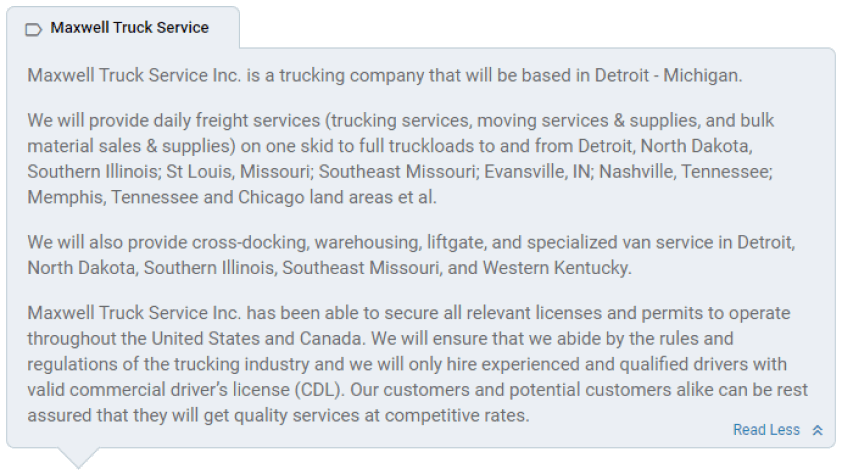
After the introduction, include information like
- Products Served
- Customer Focus
- Mission Statement
- Vision Statement
- Success Factors
- Financial Summary
- Call to action
Tip: Executive summary is a quick overview for your readers. They might not read the whole business plan and only read this section. Thus, make sure to keep it clear, precise, and crisp enough to grab their attention.
Say goodbye to boring templates
Build your business plan faster and easier with AI
Plans starting from $7/month

2. Company Overview
Provide a detailed company description in this section. It includes the name of your own trucking business, the location of your office, the legal structure of your business, and other such information.
Also, do not forget to mention the type of your business, for example, your trucking company will be one from below:
- Freight trucking
- Intermodal trucking
- Specialized hauling
- Courier and delivery services
- Bulk commodity trucking
- Dump trucking
After that, mention the history of your company if your business is already in existence. Here is an illustration of the company’s history with the help of Upmetrics:
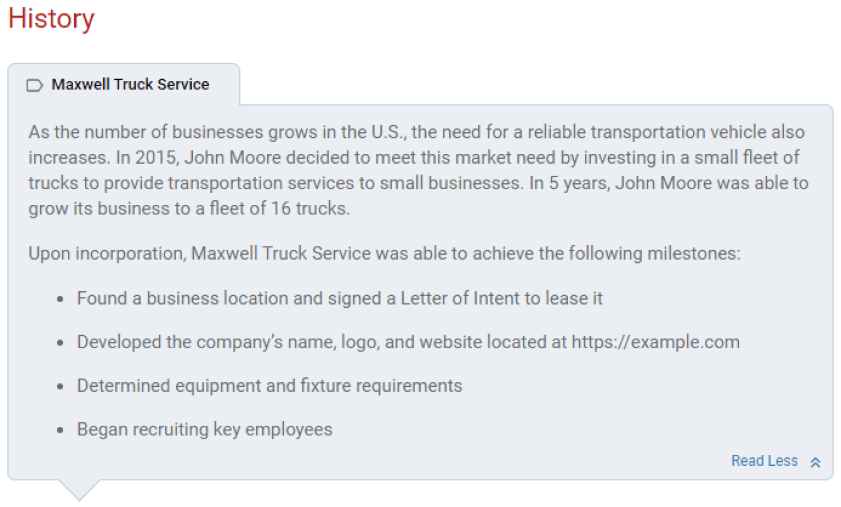
Also, describe the vision & mission statement of your trucking business along with your future goals. Add the names of the owners along with their qualifications and specifications.
In short, this section should provide an in-depth understanding of your business and business owners.
3. Industry Analysis
This analysis gives all the details about the trucking industry. It will support you in a better understanding of your business.
Here are some questions to ask while conducting industry analysis:
- What is the current size of the trucking industry in the USA?
- What are the major trends in the transportation industry?
- Who are the huge players in the industry and what is their market share?
- How is technology affecting the trucking industry?
- How are fuel prices affecting the operating costs of the businesses?
Conduction this industry analysis will educate you about the market and help you prepare marketing strategies according to the market trends.
In short, industry analysis will help you have a better understanding of the market and support you in making informed decisions.
4. Competitive Analysis
Competitive analysis will help you know your unique selling propositions (USPs) along with your market positioning. You will also be able to know your direct and indirect competitors & other trucking companies.
Start by listing out all your competitors along with their strengths, weaknesses, opportunities, and threats.
Focus more on your direct competitors and ask certain questions like:
- Who do they serve?
- What is their market share?
- What are their USPs?
- What is their pricing strategy?
- What do they need to work on according to their customers?
After conducting competitor analysis, understand your strengths, weaknesses, opportunities, and threats like below to better get your strong points.

This way you can get to know the USP of a trucking company. Once you get the USP, flaunt it in your own business plan.
5. Market Analysis
In the market analysis section, begin with market research and deep dive into the market where your trucking business will operate. Start the section by providing the details of your target market.
Your target market will depend on the trucking services you provide and on the location of your business.
Once you are clear about the target customers, discuss the market trends of the trucking industry. Mention what your customers prefer and what new they want.
For instance, here is the market trends section with the help of Upmetrics:
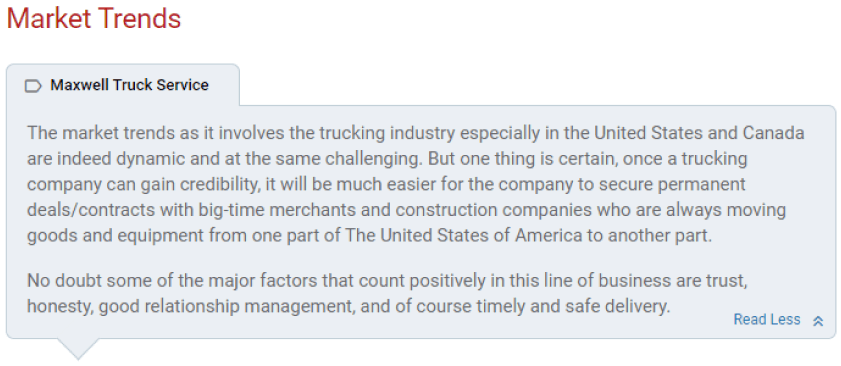
At the end of the market analysis, do mention the regulatory environment trucking companies need to follow in the particular location.
6. Product and Services
After knowing the market trends and conducting market analysis, give details about the services you will provide. Your trucking services might be one of these:
- Hazardous material transportation
- Freight transportation services
- Specialized transportation
- Intermodal transportation
- Last-mile transportation
- Reefer services
- Container drayage
Mention your time duration of the services in this section, to let your readers know the efficiency and capacity of your trucks. You can also add the images of trucks in this section along with their capacity.
Keep the language of this section understandable and simple to give knowledge about your services to the readers.
7. Sales and Marketing Plan
There are around 750,000 trucking companies in the USA that own at least 1-2 trucks. Therefore, being noticed in this much competition is necessary, which is why you need a proper sales and marketing plan.
Developing a marketing plan means writing down strategies to acquire potential customers and retain them.
Some of the marketing strategies for trucking companies are:
Having a professional website
Having a professional website will spread your reach to a wider audience. On the website, you can showcase all your services and the images of the trucks directly to potential customers.
Content marketing
Write blog posts, infographics, and articles for the logistics industry in which you can promote your own business. This way you can establish your expertise too in the same niche.
Social media engagement
For a successful trucking company, staying active on social media is a necessity. Share industry trends, news, and other events on social media to engage with your customers.
Email marketing
Build an email list of potential and existing clients and send them newsletters or updates about your services, industry insights, and special promotions.
Once you have noted down how you will acquire customers, then mention the following things:
- Customer acquisition cost
- Your monthly marketing budget
8. Management Team
Letting your readers or investors know who is behind your trucking company will increase the appeal of your business plan.
The management team section tells about the people in charge of the trucking business and their experience of the work. If you have a new trucking company, then showcasing all your experienced managers will make your business look stronger.
Here is an example of a management team:
Management team of Maxwell Truck service
John Maxwell – CEO and Founder
John is the visionary leader who founded Maxwell Truck Service. With over 20 years of experience in the transportation and logistics industry, he sets the company’s strategic direction and oversees overall operations.
Sarah Adams – Chief Operations Officer (COO)
As the COO, Sarah is responsible for the day-to-day operations of the company. She manages dispatch, fleet maintenance, and driver scheduling to ensure efficient and timely delivery of goods.
Michael Turner – Chief Financial Officer (CFO)
Michael is responsible for the financial health of the company. He manages budgets, and financial planning, and oversees financial reporting, ensuring the company’s financial stability and growth.
Karen Simmons – Director of Sales and Marketing
Karen leads the company’s sales and marketing efforts. She develops strategies to attract new clients and maintain strong relationships with existing ones, helping to grow the customer base.
9. Operations Plan
In the whole above plan, we have discussed mentioning your goals, now it is time to write the strategies of daily activities on how to achieve the above-mentioned goals. You can divide these goals into two parts:
Everyday goals
They’re the heart and soul of your trucking business’s daily life, from buying the most appropriate trucks to delivering the goods timely is a tricky thing. These are the everyday heroes that keep your business running smoothly.
Long-term goals
It’s all about milestones: the moments that make you pop the champagne. Picture celebrating your 10,000th timely delivery, hitting that milestone sales figure you’ve dreamt of, or expanding your team.
10. Financial Plan
For a successful trucking business, you will need a proper financial plan with practical financial projections. In the plan, you have to include the income statement, cash flow statement, and balance sheet for 3-5 years.
Income statement
An income statement also known as a profit and loss statement, describes the gross profitability of your business by deducting costs of goods sold from revenue.
For this, you don’t need to be greedy and make practical assumptions so that you can know the actual profitability range of your business. Here is a projected profit and loss statement for 3 years:
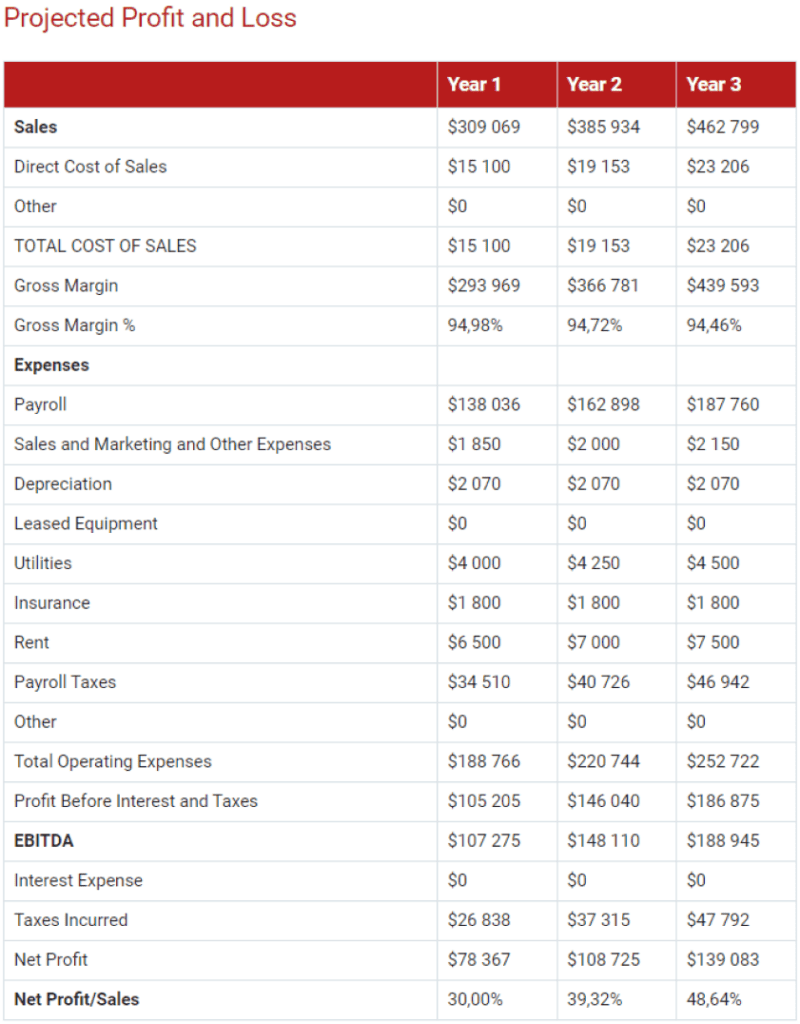
Balance sheet
Balance sheets display your assets and liabilities. Although they can contain a lot of details, like equity, goodwill, other intangible assets, etc. Here is an example of a balance sheet for 3 years with the help of Upmetrics:
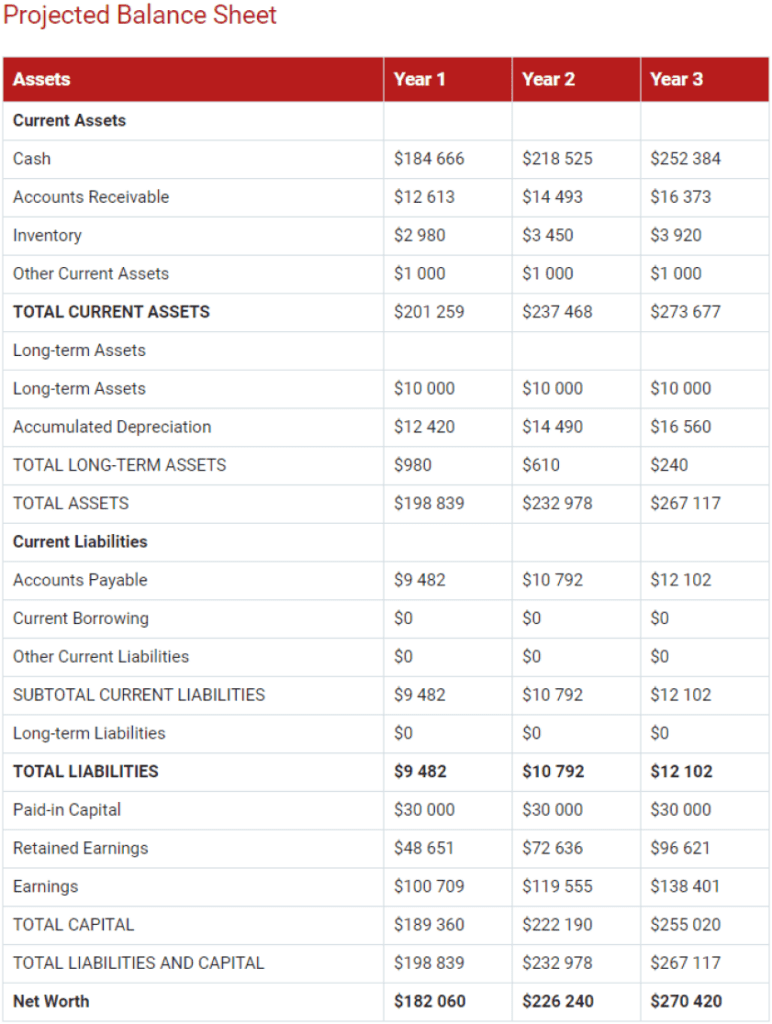
Cash flow statement
Your cash flow statement helps you see how much money you need to start or grow your business and avoid running out of money. This cash flow should be maintained even for certain months after launch that is before you start making profits.
Surprisingly, you can make a profit but still face financial problems that could lead to bankruptcy. Therefore, you will need proper cash flow planning to avoid such circumstances.
Funding Sources For Trucking Business
Funding a trucking business might be difficult because of the high investments in the truck, various sources to get funding from are:
- Bootstrapping
- Truck financing companies
- Venture capital & angel investors
- Crowdfunding
- Family and friends
Download a Trucking business plan template
Ready to kick-start your business plan writing process? And not sure where to start? Here you go, download our free trucking business plan pdf , and start writing.
This intuitive, modern, and investment-ready template is designed specifically for trucking businesses. It includes step-by-step instructions & examples to help in creating your own trucking business plan.
The Quickest Way to turn a Business Idea into a Business Plan
Fill-in-the-blanks and automatic financials make it easy.
Write Your Business Plan with Upmetrics
Finally! Now you know how to write a business plan for your business with the help of our trucking business plan example. Thus, you are a step closer to beginning or growing your business.
No doubt, writing a business plan with accurate financial projections is daunting, but it is a lot smoother with the help of business plan software . Therefore, take a deep breath, calm down, and get started with writing your business plan.
Related Posts
Dump Truck Business Plan
Tow Truck Business Plan
How to Strat Trucking Business
Cost to Start a Trucking Company
Frequently asked questions, should i hire a professional to write my trucking business plan.
Hiring a professional for your business plan is a great option: it will make things easier for you. But no one knows your business better than yourself.
So, try writing your trucking company business plan with the help of business plan software. That way you will get guidance as well as professionalism in your plan.
How often should you update your trucking business plan?
Remember, your trucking business plan is a living document which means it is flexible and open for changes whenever you want. Ideally, at least updating your business plan once a month as per the current situation is advised.
Should I include photos of trucks and equipment in a plan?
Including photos of your trucks and other equipment is a good option to showcase the service range of your trucking business. Do not overuse them, and just include them in your products and services section.
What legal and regulatory aspects should be covered in a trucking business plan?
A trucking company business plan should include various regulatory aspects:
- Business structure
- Licenses and permits
- Vehicle rules compliance
- Driver compliance
- Record keeping
About the Author

Vinay Kevadiya
Vinay Kevadiya is the founder and CEO of Upmetrics, the #1 business planning software. His ultimate goal with Upmetrics is to revolutionize how entrepreneurs create, manage, and execute their business plans. He enjoys sharing his insights on business planning and other relevant topics through his articles and blog posts. Read more
Plan your business in the shortest time possible
No Risk – Cancel at Any Time – 15 Day Money Back Guarantee
Popular Templates

Create a great Business Plan with great price.
- 400+ Business plan templates & examples
- AI Assistance & step by step guidance
- 4.8 Star rating on Trustpilot
Streamline your business planning process with Upmetrics .

1-800-888-1246

- Back Office
- How it works
How to Become a Truck Dispatcher: Start Up Guide

✅ Quick Answer
Being a truck dispatcher (also known as a freight dispatcher) may be an exciting career, but it doesn’t happen overnight. Think about negotiating, finding, and working with carriers, using a load board, and making a successful website.
In this article, I’ll show you how to become a truck driver dispatcher and provide some helpful hints on running a starting a dispatch business.
How to Become an Independent Truck Dispatcher
How to become dispatcher for trucks, what does a truck dispatcher do, how to become a truck dispatcher, step one: register your business, step two: establish an online presence, step three: get a load board subscription, step four: start making connections, how to start a dispatching company, truck dispatcher courses online free, how to dispatch trucks and find loads, how to become a dispatcher for truckers, how to book a load as a dispatcher.
- How to become a freight dispatcher?
Tip One: Find a Mentor
Tip two: invest in your education, frequently asked question, how to become a truck dispatcher with no experience.
Becoming a dispatcher for trucking involves a few key steps that can set you on the right path to success. First off, having a high school diploma or GED is a good starting point. While a college degree isn’t always necessary, having some education in areas like logistics, transportation, or business can give you an edge.
Equally important are skills like being well-organized, a strong communicator, and a creative problem solver. Since you’ll be handling routes and schedules, these skills are crucial. Education: Get a high school diploma or GED.
Skills: Develop organization, communication, and problem-solving abilities. Knowledge: Learn transportation regulations and industry software. Experience : Gain insight through internships or entry-level roles. Networking : Find a mentor or connect with industry professionals.. Grow: Build experience and confidence in your dispatcher role.
The first question on everyone’s mind is perhaps how to become an independent truck dispatcher, you will need to get the necessary education and training, gain experience in the trucking industry, get certified, build a network, and start your own business. You should also be organized, efficient, critical, communicative, and independent.
Becoming dispatcher for trucks entails coordinating freight movement, optimizing routes, and ensuring timely deliveries. This role demands excellent communication skills, the ability to make quick decisions, and proficiency in transportation software.
Building relationships with drivers and stakeholders is crucial for success. Ultimately, a truck dispatcher plays a vital role in maintaining efficient logistics and supply chain operations. How to be a truck dispatcher from home?
Dispatching trucks from home can be both a business opportunity and a job for experienced professionals with the right skills, equipment, and self-discipline. Some operate as freelancers, while others work remotely for logistics companies.
How to dispatch trucks from home? As a remote dispatcher, tasks involve managing truck requests, coordinating drivers, and ensuring timely deliveries. Essential equipment includes a computer, phone, and scanner. This career suits those seeking the flexibility of a work-from-home role in the dispatching field
A truck dispatcher is the central communications hub for a fleet of trucks, coordinating the efforts of drivers, load planners, and customers to ensure that freight is moved efficiently and on time. The truck dispatcher is responsible for maintaining contact with drivers, dispatching loads, tracking shipments, and troubleshooting any possible problems.
The truck dispatcher must have a thorough understanding of the transportation industry and strong communication and organizational skills. In addition, the truck dispatcher must be able to work independently and make decisions quickly in a fast-paced environment.
Freight brokers , trucking companies, and third-party logistics providers employ truck dispatchers. Some dispatchers work from home, while others work in an office environment.
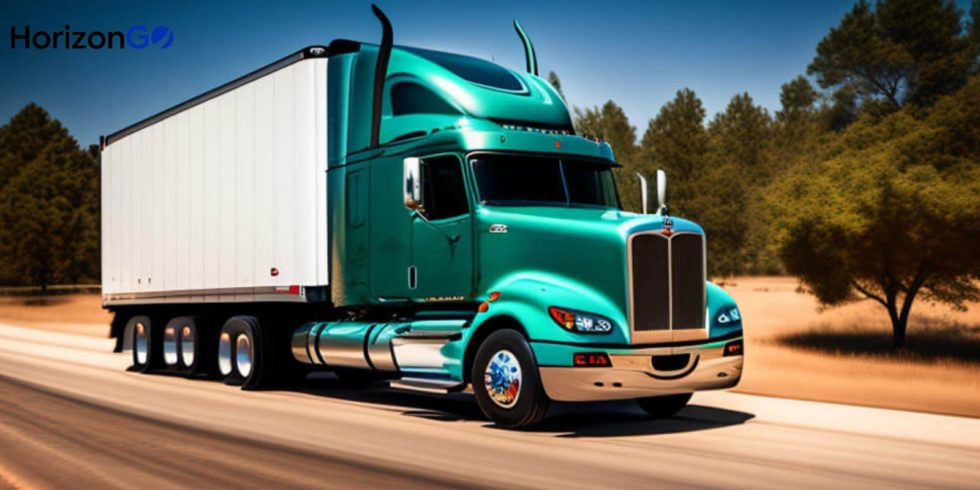
You can take a few different paths to become a truck dispatcher. Some people start a dispatching business industry in other capacities, such as drivers or customer service representatives, and then move into dispatch. Others may have experience in the logistics or transportation industries, which can help them become a truck dispatcher.
There are also a few truck dispatcher training programs available, which can give you the skills and knowledge you need to be successful in this career. These programs typically last four to six weeks and cover load planning, freight broker management, carrier relations, and dispatch software.
The best way to learn how to become a truck dispatcher is on the job, working alongside an experienced dispatcher. This will allow you to see firsthand how the job is done and learn the ropes.
Running a Successful Truck Dispatch Business
If you understand truck dispatching and how you want your business to run, follow these steps to become an independent truck dispatcher:
The first step to starting your own truck dispatcher business is simple – come up with a name and register it. Keep the name short for easy learning, and ensure it directly leads customers to understand your company’s services.
Including “independent dispatch” or “dispatching services” allows you to be easily found online and sets clear expectations for those who engage with your brand.
Trucking and logistics are broad terms that don’t give much specific information about what potential clients can expect from working with you, so avoid these naming conventions if possible.
Apply for an EIN from the IRS and pick a business structure after selecting a name for your business. Various business structures can be considered, such as sole proprietorship, LLC, corp., or partnership. I usually advise choosing an LLC or Inc corporate structure.
Create preliminary versions of business contracts essential to your business. The service agreement, for example, is where you describe what you will charge and what services you will offer for that amount.
The agreement between the dispatcher and carrier guarantees that the carrier’s insurance will shield you from liability should anything go awry with the freight you consented to. Having written copies of these agreements allows you to start working for your partners sooner.
Creating an effective internet presence and marketing plan necessitates the development of a website as well as the creation of accounts on popular social media sites.
Pick a web address that incorporates your company name while being brief and easy to remember. You may check to see whether any domains with your desired keyword are available at GoDaddy, then register there if they aren’t.
Once you get your domain name, make a Facebook/Instagram page with the same name. If you’re interested, starting a YouTube channel is also an option to show off your knowledge and expertise to subscribers.
If you want potential partners to take your business seriously, then your website needs to be up to par. Here are the five things you need on your site for it to make conversions:
The homepage: The minute a user sees your website, they should know the purpose of your business and what you offer. Some people believe that a welcome message at the top of the page will make users scroll to learn more, but if your key message isn’t straightforward, visitors may leave without fully understanding your company. Your homepage should be magnetic and urge viewers to want to learn additional information about you.
The sales pitch: By the end of your sales pitch, you should have stoked your prospective partner’s excitement about doing business with you by going into detail about your services and how you differ from your rivals. competitors.
The likable CEO: If you’re the head of a company, your face must be visible on the website. This allows potential partners to create a connection with you and builds rapport. In trucking, references are essential, and having a relatable CEO shown on your website creates more opportunities for future relationships.
The scarcity: This is the “FOMO” (fear of missing out) component of your website, in a way. You want to ensure that your potential partner understands they will lose something if they leave your website. This also ties back to your messaging and emphasizes how you differ from the competition.
The social proof: Include testimonials on your site. Especially if you’re a new independent truck dispatcher, there may not be any endorsements. That’s fine! If you can only obtain individual endorsements from those in the industry, such as friends, mentors, or instructors, it’s better than nothing. It will help you look more reliable to a possible partner.
To be a successful truck dispatcher, you must find quality loads for your carriers. The best way to do that is by subscribing to a high-quality load board to access thousands of freight listings from all over the country. While there are some free load boards available, they won’t provide the same quality or quantity of listings as a paid subscription board.
If you’re serious about your dispatcher business, the HorizonGO load board is the best investment you can make. With hundreds of thousands of new loads posted every working day, HorizonGO is the leader in truck dispatchers’ load boards. With HorizonGO’s comprehensive listings, you’ll be able to discover anything to fit your carriers’ demands at all times.
Networking Connecting is essential to succeed in trucking, and load boards are a great tool for carriers. Begin with HorizonGO Directory, which is free with a HorizonGO load board account. It provides contact info to connect with partners.
Here’s a quick rundown on starting a dispatching company:
Gain Industry Knowledge: Understand logistics, regulations, and load boards. Consider working for a dispatcher or taking courses.
Set Up Your Business: Choose a business structure (LLC is common), obtain licenses and permits, and secure insurance.
Market Yourself: Build an online presence, network with carriers and shippers, and establish your service offerings and fees.
There are a number of truck dispatcher courses available online for free. These courses can teach you the basics of dispatching, such as how to book loads, track drivers, and manage paperwork.
Once you have the necessary tools and knowledge of dispatch for trucking, you can start looking for truck dispatcher jobs that allow you to work from home.
Finding suitable carriers and loads as truck dispatcher is not always accessible. Here are five tips to help you get started:
- Load board Usage: A load board is a great way to find carriers and loads. You can search for loads by location, commodity, and other criteria and then reach out to the poster to see if they need a carrier.
- Get connected: The trucking industry is all about connections. Get to know as many people as possible, and let them know what you do. You never know when someone might have a lead on a load or carrier for you.
- Use social media: Social media is a great way to connect with potential carriers and loads. Use hashtags to find relevant posts, and reach out to people looking for help.
- Stay organized: Keep track of the carriers and loads you’re working on within a spreadsheet or CRM system. This will help you keep track of who you’ve contacted and what their status is.
- Follow-up: Don’t be afraid to follow up with carriers and loads. If you don’t hear back from someone, reach out again in a few days. Persistence is vital in the trucking industry.
Following these tips will help you find success as a truck dispatcher. Always be networking and building relationships, and you’ll be sure to find the carriers and loads you need.
To become a dispatcher for truckers, you’ll typically need a high school diploma or GED, some experience in the trucking industry, and strong communication, problem-solving, trucking dispatcher certification, and organizational skills.
You may also consider completing a truck dispatcher training course or earning an associate’s degree in logistics or transportation management to enhance your qualifications and job prospects.
Once you’ve met the basic requirements, you can search for entry-level dispatcher positions online or through trucking companies.
How to start trucking dispatch company?
There are several steps involved in starting a trucking dispatch company. These include obtaining the necessary licensing, trucking dispatcher training and permits, securing funding, and establishing relationships with carriers and shippers.
You must also develop a marketing plan to attract customers and build your business.
Booking a load as a dispatcher involves:
- Finding suitable loads for your carriers
- Negotiating rates with shippers
- Coordinating the movement of goods
How to become a freight dispatcher ?
Becoming a freight dispatcher involves several steps, including education, transportation dispatcher training, experience, and skill development.
The truckload dispatcher’s quick thinking and problem-solving skills prevented a major shipping delay when a driver broke down on the interstate.
How Do I Become a Successful Trucking Dispatcher?
Become a trucking dispatcher is a professional responsible for arranging the transportation of goods by coordinating the activities of truck drivers. A dispatcher may work for a trucking company or be an independent contractor.
As a dispatcher, you will use your knowledge of the trucking industry to help your company save time and money by finding the most efficient routes for your drivers.
Running a successful truck dispatch business startup is difficult, but if you follow the methods outlined above, you should be able to locate partners that can support your company’s growth.
Finally, I’d like to offer my two most important suggestions for becoming a great truck dispatcher.
Finding a mentor who can help you learn the ropes and avoid making costly mistakes is essential in any industry. The trucking industry is no different. If you know someone already successful as a truck dispatcher, reach out to them and ask for advice. They may be willing to help you get started or even take you on as a protégé.
The trucking industry is constantly changing, and it’s essential to stay up-to-date on the latest regulations and trends. One way to do this is to invest in your education by taking trucking dispatcher courses. These courses will teach you everything you need to know about the industry, from load planning to driver management. Enrolling in a course is a great way to ensure you’re always ahead of the curve.
By following these tips, you’ll be on your way to becoming a successful truck dispatcher. Remember to find a mentor, invest in your education, and build strong relationships with your carrier partners. You can succeed in the trucking business with hard work and dedication.
How to Start my own Truck Dispatching Business?
To establish your truck dispatching business, conduct thorough market research and formulate a comprehensive business plan. Register your business, acquire essential licenses, and cultivate relationships with trucking companies and drivers. Invest in dispatch software and effective communication tools, then promote your services to potential clients. Deliver exceptional customer service to foster a reputable standing in the industry.
How to Become a Dispatcher for Trucks
To become a truck dispatcher, research job requirements, which typically include a high school diploma or GED, strong organizational skills, and communication abilities. Some companies may require relevant experience or training.
How to be a Good Truck Dispatcher
Being a good truck dispatcher involves effective communication, multitasking, and problem-solving. You must coordinate schedules, handle emergencies, and maintain positive relationships with drivers and clients.
What do you Need to Become a Truck Dispatcher
To become a truck dispatcher, you’ll need a high school diploma or GED. Gain skills in logistics, communication, and customer service. Some employers offer on-the-job training, but relevant experience or education in transportation and dispatching can be beneficial.
How to Become a Freight Dispatcher from Home
To work as a freight dispatcher from home, follow similar steps to becoming an on-site dispatcher. Acquire the necessary skills and tools, such as a computer, internet connection, and dispatching software. Secure remote job opportunities or consider starting your own remote dispatching business.
How to get into Dispatching Freight
Start a career in dispatching freight by familiarizing yourself with the industry, learning about logistics and transportation management. Look for entry-level positions or training programs to gain experience and understanding of dispatch operations.
How to Start my own Truck Dispatching Business
To start your own truck dispatching business, create a business plan, obtain necessary licenses, and establish relationships with carriers and shippers. Invest in dispatch software, marketing, and networking to attract clients and build a successful venture.
How do Truck Dispatchers get Clients
Truck dispatchers acquire clients through networking, referrals, and online platforms. Utilize industry associations, social media, and marketing strategies to establish your presence. Providing excellent service and building trust with carriers and shippers can lead to repeat business and word-of-mouth recommendations.
How to Dispatch your own Loads?
Dispatching your own loads involves understanding transportation regulations, negotiating rates, and coordinating schedules. With industry knowledge and connections, you can directly arrange shipments with carriers and shippers, managing the logistics process independently.HorizonGo is one of the best platform where you can find,clints,trucker,and dispatch your shipment with Trucking dispatch software.
Truck dispatching is a vital job in the trucking industry, and it can be a rewarding career for those who are organized, detail-oriented, and good at problem-solving. If you’re thinking of becoming a truck dispatcher, use the tips above to get started on the right foot. And always remember to continue learning and networking to be the best dispatcher you can be.
Step Four: Build Relationships. Establishing relationships is essential for success in trucking, and load boards are a great source. HorizonGO Directory is a great starting point, with free access with a HorizonGO load board subscription. It provides contact info to help reach out to potential partners and form connections.
Leave a Comment Cancel Reply
Your email address will not be published. Required fields are marked *
Save my name, email, and website in this browser for the next time I comment.
Recent Posts

What Is The Average Fuel Mileage For Semi Trucks?
In this article, you will learn the facts and figures for average fuel mileage and how to manage fuel efficiency. What Is The Average Fuel
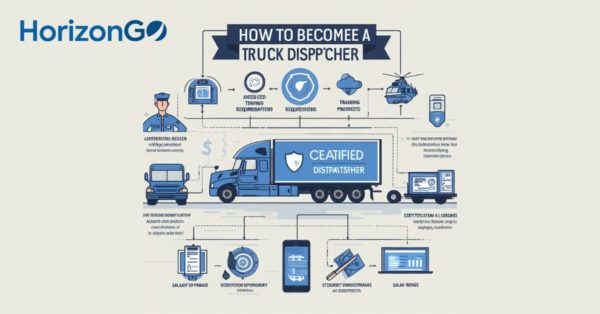
How Do I Become A Certified Truck Dispatcher
In this article, You will learn about how to get certified courses and training and how much do dispatchers make? How Do I Become A

How Much does it Cost to Lease a Box Truck
Lease payments for new businesses with good credit start at $775 per month for a 5-year lease. For businesses with risky credit, lease payments start
Get the power you need to grow your business.
Get a custom demo of how HorizonGO can work for your transportation business.
[email protected]
Best transportation management software for your trucking business.
Seamless connections Between owners/operators, dispatchers, drivers, and Clients
- Better Communication with Customers and Drivers
- Real-Time Communication
- Faster Deliveries
- Faster Billing
- Minimize Workload
- Multiple out of the box integrations
- Scalable and Easy to use
- One Click Diver settlements
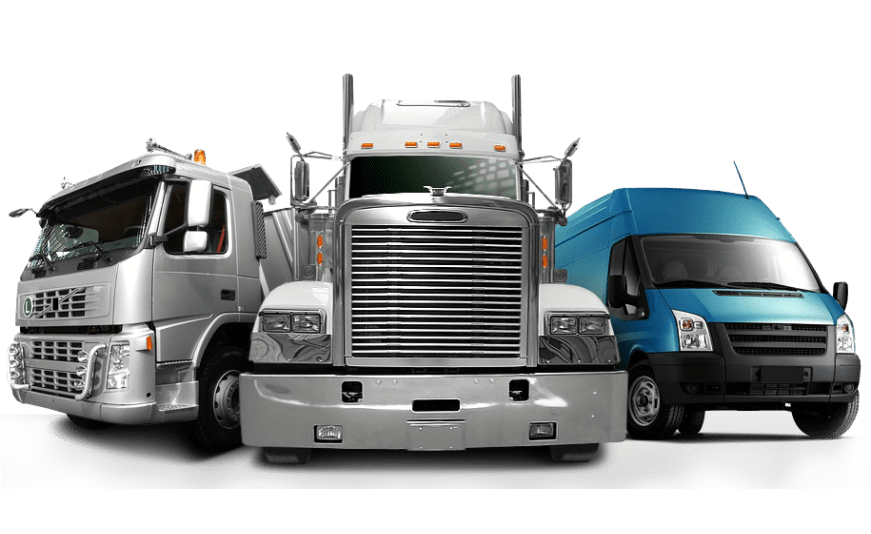
Read more about HorizonGO here .
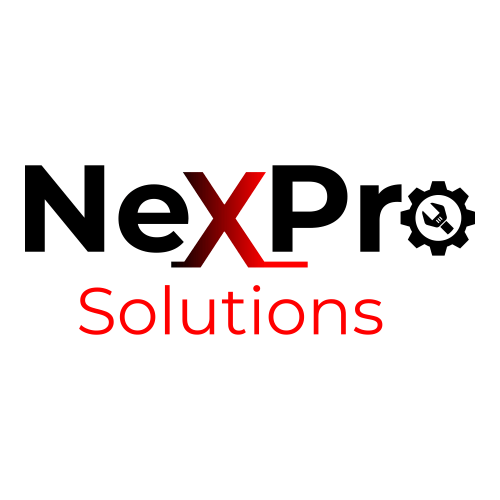
Truck Dispatch Business: What You Need To Know?
The trucking industry relies on safe drivers to accomplish deliveries, and while they are commonly seen as the system's cornerstone, they are not the only personnel accountable for its performance. dispatchers also play an important role, and they are in high demand..

Trucking is by far the most important means of transportation in the United States. The trucking business transports an astounding 80% of all goods in the United States. This is four times the total amount of air, train, water, and pipeline. Furthermore, the trucking business employs 7.1 million individuals, or 6% of the working population in the United States.
Furthermore, the trucking business is expected to rise by 75% by 2026. As a result, it is one of the most rapidly developing small company industries in the United States. Consider these figures, and you'll realize that starting your own trucking company may be a profitable business venture. Particularly if you know where to begin and how to progress.
Truck Dispatch Business Plan
The first step in beginning a truck dispatch business is to develop a basic business strategy. Consider your trucking business plan to be a basic road map to assist you get where you want to go. It should include details regarding
● What sort of equipment you want to use
● Whether you intend to buy or lease the equipment
● Your financial projections, and
● How you intend to expand are all crucial business considerations.
1. Dispatching
Dispatching is one of the most crucial aspects of a trucking business. You can boost efficiency for your trucking business and save time and money by keeping correct, structured records for all shipments. Many owner-operators and fleet builders utilize trucking dispatch software that is particularly intended to handle dispatches and retain correct dispatch records. This information comprises details about the customer, the shipment, and the driver.
2. Cash Flow
When it comes to controlling your cash flow, there is plenty of room for mistakes. One of the worst things that can happen to you as an owner-operator is running out of cash when you really need it. You may successfully manage your cash flow by automating your trucking business invoicing system, which allows you to produce, transmit, and track invoices and payments.
3. Expenses and Maintenance
When owning a trucking business, you must be able to check your spending and ensure that your vehicles are properly maintained so that they remain operational. It can be tough to keep track of vehicle maintenance and spending, especially if you rely on paper receipts and spreadsheets. However, understanding how much it costs to run your trucking company is the only way to assure that it is profitable.
4. Reports and Stats
Knowing your figures and how your firm is performing is critical for every business owner. This is especially true in the trucking sector, where things may change rapidly and a lack of preparation and bad management can easily lead to the failure of a trucking company. During the first five years, more than half of new enterprises fail. However, with the proper study, strategy, and planning, as well as the capacity to react to changing conditions, your trucking company may be successful.
Truck Dispatcher - Duties and Responsibilities
Truck dispatchers are also responsible for a variety of other tasks. They may differ somewhat from one firm to the next.
Truck dispatchers are responsible for a variety of tasks, including:
● Maintaining records, checking drivers' daily logs for mistakes or infractions, and keeping track of their working hours and equipment availability
● Keeping track of the weather at all driver locations in order to identify possible problems, generally with the use of several computer applications.
● Serving as a dependable point of contact in balancing driver health and safety with customer needs
● Coordination and management of the most efficient loads in order to remain cost-effective as a company, combining shipments based on their routes and timeline to minimize how many trucks and drivers are out.
● Determining the best delivery methods and negotiating rates directly with vendors and customers, and obtaining the necessary documents and permits that drivers will require when shipping chemicals or livestock.
Truck Dispatcher Salary
As of June 2022, the average Truck Dispatcher pay in the United States is $51,662, however the compensation range frequently ranges between $44,366 and $60,584. Salary ranges can vary greatly depending on a variety of things, including schooling, certifications, supplementary talents, and the number of years you have worked in your field. Salary.com has more online, real-time salary data than any other website, allowing you to pinpoint your exact wage objective.
What makes a good truck dispatcher?
There is hardly any downtime as a trucker dispatcher. A skilled dispatcher must be able to manage routes, plan trip schedules, and handle calls and requests from operators, third-party vendors, and their supervisors. They must be able to make judgments with confidence and expertise.
Working as a truck dispatcher can put you in difficult and emotional circumstances. The capacity to remain cool and respond rationally rather than emotionally is critical for success in this profession. Sometimes dispatches shift and move in a different route than expected. This is why maintaining a level of flexibility and adaptation within the position is critical. With limited time to prepare ahead, you must think swiftly and make sound decisions and conclusions.
Share Content.

Protecting Your Assets: The Importance of Physical Damage Comprehensive/Collision Insurance for Your Trucking Business

Don't Let Rising Premiums Derail Your Trucking Business: The Importance of Shopping Around for Insurance

Navigating the Trucking Insurance Maze: A Guide to Choosing the Right Provider

Why Occupational Accident Coverage Is Crucial for Trucking Companies

Streamlining Onboarding: How Trucking Companies Complete Carrier Packets with Brokers and Shippers
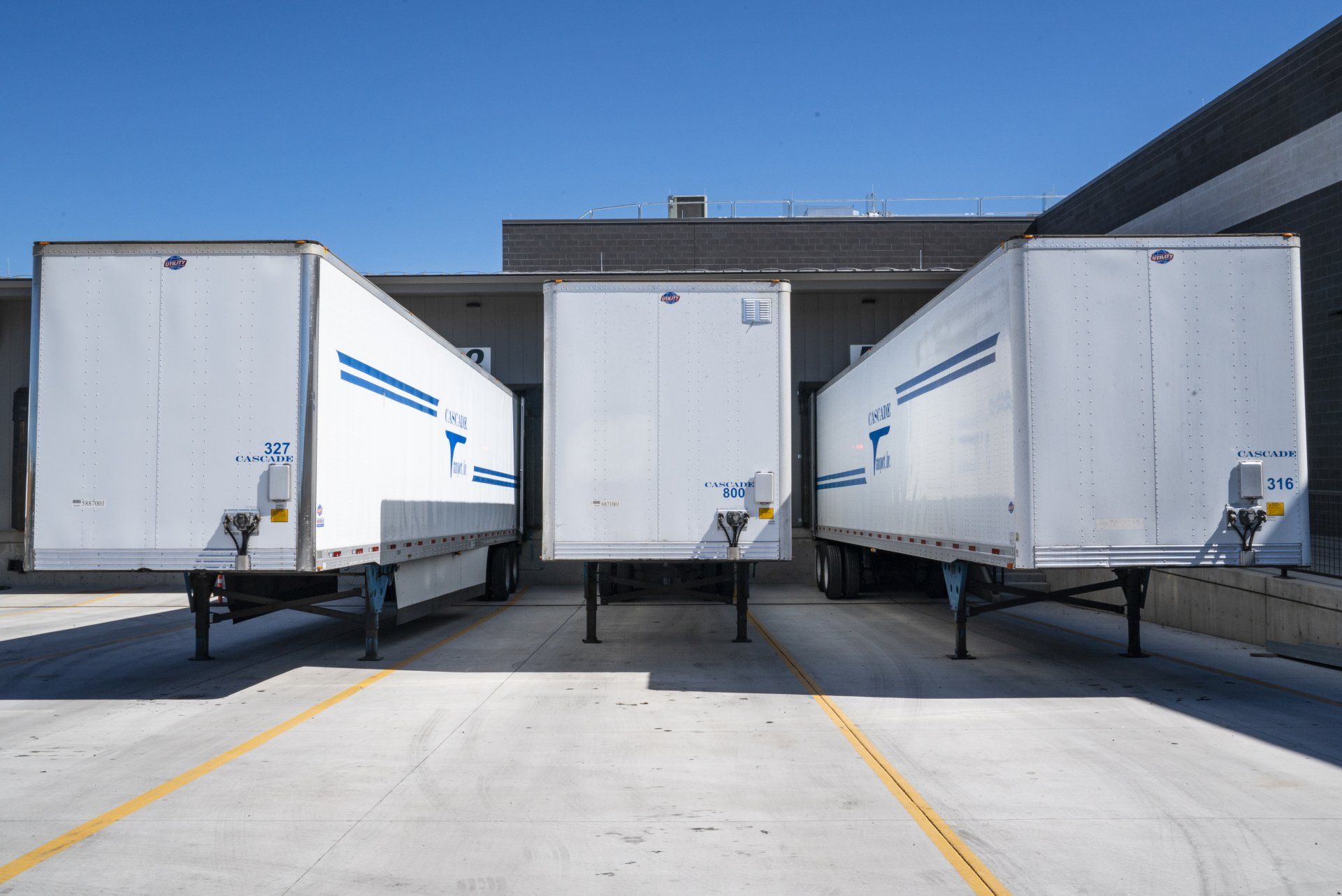
How to Start a Trailer Leasing Company: A Step-by-Step Guide

Fast and Effective Solutions When Semi Trucks Break Down Over The Road

The Role of Dispatchers in Trucking

When Is The Best Time To Start A Trucking Company
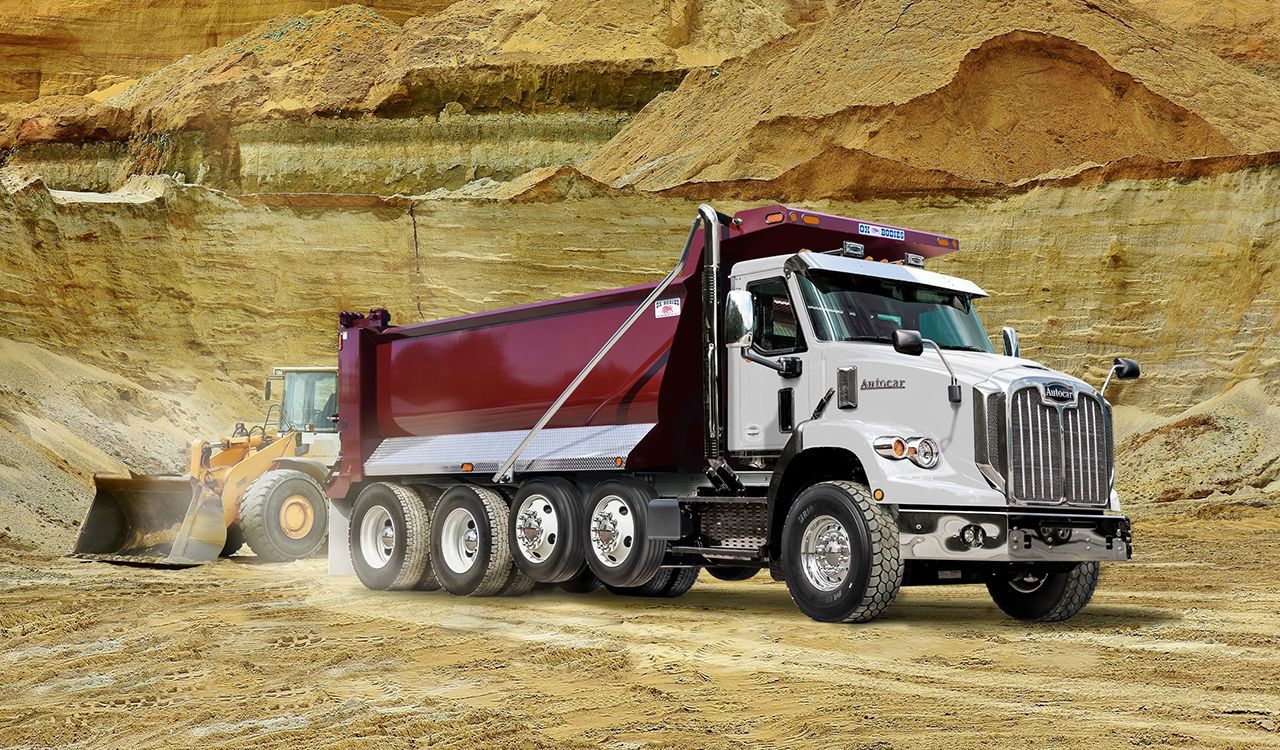
The Importance of Dump Truck Trucking in Construction and Mining
Quick links, (800) 413-0446 [email protected], copyright ©2019 nexpro solutions co. all rights reserved..
How to Write A Truck (Freight) Broker and Dispatcher Business Plan
How to write a truck/freight broker and dispatch business plan.
The freight broker, also known as a truck broker, industry has witnessed impressive growth in recent years, leading to rising demand for truck broker business plans, freight broker business plan templates, and truck broker pro forma financial projections.
Various factors contribute to the remarkable demand for business plans in this industry. For instance, there are currently around 60,000 vacant truck driving jobs, creating challenges for manufacturers and shippers in finding reliable freight transportation. Freight or truck brokers play a crucial role in addressing this issue, alleviating the burden from manufacturers and streamlining the transportation process. This is just one of many factors contributing to the growth of the freight broker/truck broker industry.
More organizations seek comprehensive freight or truck broker business plans in light of competitive pressures and the need for financing. In response to this elevated demand, our truck broker business plan writer has curated valuable tips and tricks to assist you in crafting your freight broker business plan or pro forma financial projections. (7/23)
CLICK HERE FOR INFORMATION ABOUT OUR FREIGHT BROKER BUSINESS PLAN TEMPLATE!!
Executive summary for a truck (freight) broker and dispatcher business plan or template..
In the executive summary of the freight broker/truck broker business plan, we provide essential details about the organization, including its name, legal structure (such as limited liability company or sole proprietorship), and location. As an added recommendation, our freight broker business plan writer emphasizes highlighting niche services that will set the freight broker business apart from competitors. In this dynamic industry, embracing dispatching services has become a familiar and growing trend. Offering dispatching services to truckers saves them time, reduces planning hassles, and allows the freight broker to generate additional revenue streams. By strategically incorporating this complimentary service, our freight broker business aims to establish a unique value proposition and capitalize on emerging opportunities in the market.
Need Help Writing a Freight Broker and Dispatch Business Plan?
Call or Text Paul, Doctoral Candidate, MBA.
321-948-9588
Email: [email protected]
Hours of Operation: Monday through Friday, 8 am to 9 pm EST.
CLICK HERE TO CONTACT US TODAY!!!
Company Information and Location for a Truck (Freight) Broker and Dispatcher Business Plan .
In the company information section of the freight/truck broker business plan, we delve into crucial aspects such as the products and services we offer and detailed location information and emphasize the unique niche aspects that set our organization apart. However, our freight broker business plan writer goes beyond the standard conventions and strongly emphasizes providing comprehensive discussions about our target market and strategic practices.

As a freight broker, we recognize the significance of understanding our client's specific needs and preferences. To achieve this, we adopt a tailored approach, working closely with select importers to ensure we provide exceptional services that align perfectly with their requirements. This personalized approach allows us to build long-lasting relationships based on trust and reliability.
Furthermore, we leverage modern technologies and carefully curated load boards to streamline the process of matching truckers with the most suitable job opportunities. By employing sophisticated logistics, we optimize efficiency and enhance the overall experience for our clients and trucking partners.
Our strategic positioning and maneuvering demonstrate our commitment to excellence in the freight brokerage industry. Through our business plan, we aim to showcase our unique advantages and focus on meeting and exceeding customer expectations. By sharing these insights, we seek to instill confidence in potential investors, lenders, and partners, highlighting the potential for significant growth and success in the competitive freight brokerage market.
Popular Services offered by a Truck (Freight) Broker and Dispatcher Company.
Popular services offered by a freight broker/truck broker encompass a range of crucial activities in the transportation industry. At the core of our operations, we excel in matching truckers with shippers or manufacturers, ensuring efficient and reliable freight transportation. Leveraging our expertise, we carefully examine load boards to identify optimal job opportunities for owner-operator truckers, optimizing their routes and ensuring their success.
To remain competitive and cater to the evolving needs of our clients, we go above and beyond by offering differentiated services. One such service is dispatching, where we provide valuable support to truckers by planning and organizing their routes, saving them time and effort. Additionally, we offer comprehensive accounting activities, ensuring accurate and timely financial management for truckers and shippers alike.
As part of our commitment to the well-being of our trucking partners, we also arrange health benefits, prioritizing their health and providing peace of mind as they navigate the challenges of the road. These complementary services set us apart from competitors and underscore our dedication to supporting the success and satisfaction of all stakeholders in the freight brokerage process.
In crafting our business plan, we emphasize our diverse and customer-centric service offerings, aiming to showcase our ability to adapt to market demands while maintaining the highest standards of professionalism and efficiency.
Marketing Section for a Freight Broker Business Plan or Freight Broker Business Plan Template.

The marketing section of our freight broker business plan highlights a blend of traditional and innovative strategies to reach our target audience effectively. While we acknowledge the importance of traditional marketing approaches like advertising in trucking magazines and leveraging word-of-mouth referrals, we also embrace the power of social media marketing.
We have successfully integrated social media platforms into our marketing strategy to expand our reach and connect with truckers and shippers. Utilizing platforms like Facebook, we actively engage with truckers and post freight hauling opportunities on community boards. Through direct messaging, we establish personal connections with truckers, offering them timely and attractive freight-hauling options. Additionally, we showcase our availability on load boards, ensuring our presence in the digital marketplace.
Our dynamic approach to social media marketing boosts our visibility and fosters a sense of community within the trucking industry. We establish ourselves as a reliable and customer-oriented freight broker by actively participating in online discussions and sharing valuable insights.
Incorporating traditional and innovative marketing strategies, we are confident in our ability to attract new clients, expand our network, and cultivate lasting relationships within the industry.
Pro Forma Financial Projections for a Truck (Freight) Broker and Dispatcher Company.
Our truck broker pro forma financial projections are tailored to suit the unique revenue model of freight brokers. Our revenues are primarily generated per job, so our financial model focuses on daily job assignments and the average rate charged per job. To ensure accuracy, we also factor in broker pay as part of the variable cost, which may significantly impact our overall costs.
By structuring our financial projections, we comprehensively understand how revenues align with the associated costs, allowing us to make informed business decisions. This simplified yet effective financial model provides valuable insights into the financial viability of our truck broker and dispatcher company, enabling us to strategize and optimize our operations effectively.
Hopefully, these insightful tips and tricks for writing a business plan were helpful. Email or call us if you need help with a business plan or financial projections.
Author: Paul Borosky, Doctoral Candidate, MBA., Author
Owner of: Quality Business Plan and Quality Business Consultant.

15 Expert Tips For Load Planning Success In Truck Dispatching

Are you struggling to plan loads for your truck dispatching business efficiently? Load planning is crucial in ensuring timely deliveries and maximizing profits in the transportation industry. However, balancing competing priorities such as driver availability, load type, and regulatory compliance can be challenging.
To help you achieve load planning success, we’ve compiled 15 essential expert tips for any truck dispatching operation. These tips cover everything from understanding your capacity and prioritizing loads to using route optimization software and maintaining good customer relationships.
By implementing these strategies, you’ll be able to streamline your operations, reduce costs, and increase customer satisfaction.
Understand Your Capacity:
Understanding what your trucks can handle is crucial for maximizing efficiency and profitability in your dispatch operations.
If you don’t know the size and capacity of each truck, you may overload them with too much weight, which could lead to potential safety hazards or even cause damage to the vehicle. It’s important to note that different types of trucks have varying capacities.
For example, a straight truck may be able to carry a maximum weight of 10,000 pounds, while a tractor-trailer can handle up to 80,000 pounds. Knowing these limits will allow you to match the right truck with the appropriate load and prevent any issues down the line.
By understanding your capacity, you’ll also be able to optimize routes by planning loads that are within those limits and ensuring that drivers aren’t making unnecessary trips.
Knowing your capacity is just one part of load planning success in truck dispatching. The next step is getting familiar with each driver on your team and their individual strengths and weaknesses. By considering these factors when assigning loads, you’ll maximize productivity while keeping everyone safe on the road.
Know Your Drivers
Know your drivers! Understanding their strengths, weaknesses, and preferences while keeping track of their Hours of Service (HOS) is paramount to efficiently assigning loads. Your drivers are the backbone of your business, and knowing their capabilities can help you utilize them in the best possible way.
Here are some tips to help you get to know your drivers better:
- Conduct regular assessments. Regular assessments can help identify areas where a driver may need training or support. It can also highlight their strengths, which you could use to assign them specific types of loads.
- Encourage feedback. Creating an environment where drivers feel comfortable providing feedback on load assignments can offer valuable insight into their preferences and work style.
- Be flexible. A one-size-fits-all approach isn’t always effective when it comes to managing drivers. Being flexible with schedules and routes can help accommodate individual driver needs.
Knowing your drivers will result in more efficient load planning and improve driver satisfaction and retention rates. By taking the time to understand each driver’s unique characteristics, they’ll be more satisfied with their work, leading to higher productivity.
As you prioritize loads for your dispatchers, remember that utilizing each driver’s strengths will ultimately lead to better results. Considering aspects such as HOS regulations and personal preferences while assigning loads will ensure that each driver is working at optimal capacity. With this understanding in mind, let’s discuss how prioritizing loads can make all the difference in truck dispatching success.
Prioritize Loads
As a dispatcher, prioritizing loads based on customer importance, time sensitivity, and profitability can significantly impact the overall performance of your drivers and ultimately increase your business’s success. When prioritizing loads, you ensure that the most profitable and important ones are delivered first. This not only helps to keep customers happy but also helps to improve driver productivity by reducing wait times at loading docks.
To properly prioritize loads, it’s important to understand which customers are the most important to your business. These may be long-term clients who regularly provide high-volume orders or require specific handling instructions for their products. You should also consider the time-sensitivity of each load. Some customers may require deliveries within a specific timeframe due to production schedules or other factors.
Finally, take into account the profitability of each load. While some shipments may have a lower profit margin than others, they may be necessary for maintaining good relationships with key customers.
Prioritizing loads can improve driver productivity by reducing wait times at loading docks. Focusing on customer importance, time sensitivity, and profitability can help ensure successful deliveries.
- Helps keep customers happy
- Improves driver productivity
- It can be challenging to balance priorities among different types of customers and shipments
- It may require additional communication with customers regarding delivery expectations
Use Route Optimization Software
By utilizing route optimization software, you can find the most efficient routes based on factors like traffic and weather, ultimately improving your business’s delivery performance. This software allows for real-time updates and adjustments, meaning drivers can avoid traffic jams or poor weather conditions by taking alternate routes.
Additionally, it can help with load planning by providing insights into which routes are more fuel-efficient and cost-effective. Using route optimization software also helps to minimize the risk of errors and delays in dispatching. By automating the process of finding the most optimal route for each delivery, dispatchers can save time and reduce manual errors such as wrong addresses or incorrect directions.
The software also considers a truck’s specific dimensions and weight restrictions when calculating routes, ensuring that drivers are not sent down roads where they cannot legally travel. Moreover, implementing route optimization software has numerous benefits beyond just improving your business’s delivery performance.
It can increase customer satisfaction by providing accurate ETAs (estimated arrival time) and reducing delivery wait times. It can also improve driver safety by avoiding hazardous road conditions or high-crime areas. Overall, investing in this technology is smart for any trucking company looking to streamline its operations and improve its bottom line.
By incorporating route optimization software into your load planning process, you can efficiently manage deliveries while minimizing risks associated with human error or external factors like weather or traffic incidents. However, it’s important to consider other factors, such as load type, when planning out your routes.
Consider Load Type
Incorporating load requirements into your planning process is crucial for ensuring efficient and secure deliveries. Different loads may have specific needs like refrigeration or extra securing, and failure to consider the load type can result in delays, damage to goods, and additional costs.
When planning a route, it’s important to consider any special equipment necessary for transporting the cargo safely. One way to ensure you’re properly considering the load type is by communicating clearly between dispatchers and drivers. This includes providing drivers with all necessary information about the load they will be carrying, including weight limits, dimensions, temperature requirements, and any other special instructions. By doing so, drivers are better equipped to handle the job efficiently while reducing risks associated with improper handling of goods.
When planning out your routes for multiple loads, make sure to consolidate whenever possible. This helps reduce transportation costs and minimizes environmental impact by reducing fuel consumption. Additionally, consolidating loads can help reduce overall delivery times as multiple shipments can be made under one trip.
By taking these steps into consideration when planning your truck dispatching operations, you’ll be able to improve efficiency and achieve greater success in delivering goods across various locations.
Consolidate Loads When Possible
You can increase the efficiency of your deliveries and reduce transportation costs by combining multiple loads onto fewer trucks, creating a streamlined image of trucks carrying multiple goods. This approach is known as load consolidation, and it has many benefits.
When you consolidate loads, you can save on fuel, maintenance, and labor expenses since fewer trucks are needed to transport the same amount of goods. Load consolidation also helps to optimize your routes since you can plan for more efficient pickups and deliveries.
By consolidating loads with similar destinations or requiring similar handling procedures, you can avoid unnecessary detours and ensure that all your deliveries are made on time. This will help improve customer satisfaction while reducing the risks of delayed deliveries.
To ensure load balance when consolidating multiple loads onto one truck, consider the weight limits for each type of cargo being transported. You should also consider how different types of cargo may interact with one another during transport to prevent damage or accidents.
By following these guidelines, you can create a well-balanced load that maximizes space utilization while minimizing any risks associated with overloaded or unbalanced vehicles.
Ensure Load Balance
Consolidating loads is a great way to save money and reduce environmental impact, but it’s not the only thing you need to consider when planning your truck dispatch. You also need to ensure that your load is balanced properly. Improperly balanced loads can cause safety issues, including tipping over or losing vehicle control.
To ensure that your load is properly balanced, consider the weight of each item you’re transporting. Ensure that heavier items are distributed evenly throughout the truck and that there aren’t any areas where one side of the truck is significantly heavier. A poorly balanced load can make it difficult for you to steer the vehicle, especially when turning corners or navigating hills.
Here are some tips for ensuring proper load balance:
- Use a scale to weigh each item before loading it onto the truck.
- Consider using blocking and bracing materials to keep items in place during transport.
- Avoid stacking items too high or too unevenly.
- Check your load periodically during transport to ensure nothing has shifted or moved around.
By following these tips, you can help ensure that you and other drivers on the road stay safe while transporting goods. But how do you plan a well-balanced load in the first place? That’s where using load planning software comes in handy…
Use a Load Planning Software
Using software designed for load planning can automate and streamline the process, ensuring proper load balance and reducing safety risks. Load planning software can assist dispatchers in determining ideal loading sequences, maximizing available space, and minimizing overweight shipments. This technology can also help avoid overloading axles, which is a common cause of accidents on the road.
Furthermore, load planning software allows dispatchers to create real-time plans that adjust to unexpected issues. Real-time visibility into truck location, traffic conditions, and weather patterns provides valuable insights into potential disruptions. Dispatchers can quickly modify routes or schedules to address any issues that arise, avoiding costly delays and maintaining customer satisfaction.
Consider incorporating load planning software into your operations as you plan for contingencies in your truck dispatching process. With the ability to optimize loads for weight distribution and adjust plans in real-time as needed, this technology offers a powerful tool for reducing safety risks while improving efficiency.
Plan for Contingencies
As you navigate the unpredictable world of logistics, it’s essential to have a solid contingency plan in place to ensure your operations run smoothly. Load planning is a critical aspect of truck dispatching, and it requires careful consideration of various factors that can impact your shipment’s timely delivery.
You must always be prepared for unexpected issues like breakdowns, delays, or last-minute changes in orders. One effective way to plan for contingencies is by having backup plans and alternative routes in place. In case of unforeseen circumstances like traffic congestion or road closures, having pre-planned alternatives can help avoid disruptions and minimize delays.
Additionally, make sure to communicate these alternate plans with your drivers so that they know the contingency measures in place. Remember that no matter how well you plan, there will always be unforeseen challenges along the way. However, preparing for these eventualities can help mitigate their impact on your operations.
In addition to having backup plans and alternate routes mapped out, consider building relationships with other carriers or shippers who can provide support during crisis situations. Clear communication channels between dispatchers and drivers are critical in ensuring problems are addressed promptly and efficiently without derailing schedules or causing unnecessary delays.
As you plan for contingencies when load planning trucks for dispatching operations as part of your logistics business strategy, clear communication with drivers is crucially important. Be sure to establish an open line of communication before departure so that they understand what to expect regarding potential complications such as weather-related delays or road closures due to construction work on highways ahead of them – this will help prevent confusion later down the line!
Communicate Clearly with Drivers
Now that you have a plan for contingencies, it’s important to ensure your drivers understand their instructions clearly. This includes load details, routes, and delivery expectations. Clear communication can prevent misunderstandings and delays, ultimately leading to load planning success.
To communicate effectively with your drivers, consider these expert tips:
- Be concise: Provide all necessary information in a clear and concise manner to avoid confusion.
- Use technology: Utilize tools such as messaging apps or GPS tracking systems to keep in touch with your drivers and provide real-time updates.
- Encourage feedback: Create an open line of communication where drivers feel comfortable sharing concerns or suggestions.
By implementing these strategies, you can establish a strong communication system with your drivers and increase the chances of successful load planning.
As a truck dispatcher, it’s essential to prioritize clear communication with your drivers to ensure load planning success.
However, another crucial factor is checking weather forecasts before dispatching loads. By staying aware of potential weather issues on planned routes, you can make adjustments beforehand and reduce the risk of delays or safety hazards on the road.
Check Weather Forecasts
Don’t overlook the importance of checking weather forecasts, as it can greatly impact delivery schedules and prevent potential hazards on the road. Weather conditions such as heavy rain, snow, or high winds can delay trucks and cause accidents. By watching weather updates, you can plan accordingly and make necessary adjustments to avoid disruptions in your dispatching schedule.
When checking weather forecasts, consider the route your drivers will take and their destination. This is especially important if they’re delivering to areas with different weather patterns than where they started. For example, if a driver starts their trip in sunny California but is headed towards snowy Colorado, it’s crucial to ensure they’re equipped with appropriate gear like chains or winter tires.
Incorporating regular weather checks into your load planning process may seem like an extra step, but it’s well worth the effort. It helps you avoid any potential issues arising from unfavorable weather conditions and allows you to make informed decisions about load dispatching that prioritize safety.
After all, as a truck dispatcher, ensuring safe transportation for drivers and cargo should always be top priority before anything else. With this in mind, let’s understand regulations when planning loads.
Understand Regulations
Before hitting the road, ensure you know all federal and state regulations regarding load weight, size, and securing. This is crucial to ensure you stay compliant with the law and avoid potential fines or penalties.
Take the time to research and understand these regulations before dispatching your truck. Knowing the regulations will also help you plan your load effectively. You don’t want to overload your truck or have an improperly secured load that could cause accidents on the road. By understanding the regulations, you can properly plan for your load’s weight and size and ensure it’s safely secured before hitting the road.
In addition to following regulations, maintaining good customer relationships is important in truck dispatching. Building trust and communication with them can lead to repeat business and positive referrals. Understanding their needs and meeting their expectations will go a long way in building those relationships.
So before heading out on a job, make sure you have everything planned according to regulation standards while keeping customer satisfaction in mind.
Maintain Good Relationships with Customers
Building strong relationships with your customers can lead to repeat business and positive referrals, ultimately contributing to the long-term success of your trucking company.
Maintaining good communication with your customers is vital in keeping them happy and satisfied with your services. Respond promptly to their queries and concerns, and keep them informed about any changes in delivery schedules or other issues that may arise.
Another way to maintain good relationships with your customers is by being reliable. Deliver goods on time and keep promises made during negotiations. This builds trust and helps establish a loyal customer base who will prefer working with you over competitors.
Good relationships can also lead to more flexibility when unexpected issues arise. Customers are more likely to be understanding if they have a good relationship with you, giving you more room for negotiation or flexibility in load planning.
By maintaining good relationships, you benefit from repeat business and create a buffer against unexpected disruptions that could hurt your bottom line. Encouraging driver feedback is one way to improve operations while maintaining these valuable partnerships.
Encourage Driver Feedback
You can improve your trucking operations by encouraging your drivers to share their valuable insights and feedback on load planning.
Drivers are on the front lines of your business and have a unique perspective that can help you optimize your load planning process. By creating an environment where drivers feel comfortable sharing their thoughts on improving load planning, you can gain new insights and ideas that may not have been considered before.
To encourage driver feedback, it’s important to create open lines of communication between dispatchers and drivers. Drivers should be encouraged to speak up when they see something that could be improved in the load planning process. Dispatchers should also take the time to listen actively to what drivers have to say and consider incorporating their suggestions into the overall strategy.
By encouraging driver feedback on load planning, you can foster a culture of continuous improvement within your organization. As you gather more information from drivers about what works well and what doesn’t, you can make changes to improve outcomes over time.
This approach ensures that you’re constantly evolving your processes based on real-world experience and feedback from those who are closest to the work itself.
Continuous Improvement
Now that you’ve encouraged driver feedback, it’s time to focus on continuous improvement for your load planning processes. This means regularly reviewing and analyzing your outcomes to identify improvement areas. It’s important to remember that even the most successful plans can always be improved upon.
Here are three ways you can implement continuous improvement in your load planning:
- Set goals and track progress: Establish clear goals for your load planning process and track progress towards those goals. This will help you identify areas where improvements need to be made and measure the success of any changes implemented.
- Utilize technology: There are numerous technological advancements available today that can help streamline load planning processes, including automated dispatch systems, GPS tracking, and real-time data analysis. Implementing such technologies can significantly improve both efficiency and accuracy.
- Seek input from all stakeholders: To ensure that all perspectives are taken into account when identifying areas for improvement, seek input from not just drivers but also dispatchers, customers, and other relevant parties.
By continuously striving to improve your load planning processes through goal setting, technology utilization, and stakeholder input, you can optimize efficiency while minimizing errors or delays in delivery times – ultimately leading to greater customer satisfaction! You can also challenge yourself by taking a truck dispatcher course to help you freshen up on some knowledge to streamline your dispatching business.
Frequently Asked Questions
What are some common mistakes to avoid when prioritizing loads.
When prioritizing loads, it’s important to avoid common mistakes that can lead to delays and inefficiencies.
First, don’t prioritize based solely on distance or proximity. Other factors like delivery time windows and customer preferences should also be considered.
Second, don’t overlook the importance of communication with drivers and customers. Ensure everyone is on the same page about load priorities and potential changes.
Finally, don’t forget about safety considerations like weight limits and route restrictions.
By avoiding these mistakes, you can ensure a smoother and more successful load planning process for your truck dispatching operations.
How can load planning software help with managing unexpected changes in delivery schedules?
Load planning software can be a lifesaver when it comes to managing unexpected changes in delivery schedules. With the dynamic nature of the trucking industry, things don’t always go according to plan, and you need a system that can quickly adapt to those changes.
Load planning software allows you to reassign loads easily, adjust delivery times, and reroute drivers. This means that even if a shipment is delayed or canceled, you can quickly find an alternative solution without disrupting your entire operation.
Overall, load planning software is a valuable tool for any dispatch team looking to streamline their processes and stay ahead of unexpected challenges.
What are some key factors to consider when consolidating loads?
When consolidating loads, there are a few key factors to consider. First, ensure the consolidated products are compatible and won’t cause damage or contamination.
You’ll also need to factor in weight distribution and ensure the load won’t exceed legal weight limits. It’s important to communicate with all parties involved, including shippers and receivers, to ensure everyone is on the same page regarding pickup and delivery times.
Finally, be prepared for unexpected changes or delays by having contingency plans in place. By considering these factors, you can successfully consolidate loads and optimize your truck dispatching operations.
Are there any specific regulations that truck dispatchers should know when planning loads?
When it comes to planning loads as a truck dispatcher, there are specific regulations that you should be aware of. The Federal Motor Carrier Safety Administration (FMCSA) sets weight limits for commercial vehicles based on the number of axles and the distance between them.
Additionally, you must ensure that your drivers comply with hours-of-service regulations to prevent fatigue-related accidents. It’s also important to stay up-to-date on state-specific rules regarding permits and restrictions for oversized or overweight loads.
By staying informed about these regulations, you can plan efficient and compliant loads for your drivers.
How can truck dispatchers effectively balance load distribution to prevent accidents and minimize vehicle wear and tear?
To effectively balance load distribution as a truck dispatcher, you should start by considering the weight of the cargo and its placement within the vehicle. Ensure that heavier items are placed closer to the cab while lighter items are positioned towards the rear.
Additionally, ensure that each axle carries a balanced weight to prevent unnecessary wear and tear on your vehicles. Furthermore, monitor weather conditions and adjust load distribution accordingly to prevent accidents on slippery roads or when driving uphill.
Maintaining proper load balance and distribution ensures safe transportation of goods while minimizing damage to your trucks.
Congratulations, you’ve now got 15 expert tips for load planning success in truck dispatching!
By understanding your capacity and knowing your drivers, you’ll be able to prioritize loads effectively and use route optimization software to maximize efficiency. However, it’s important also to consider load type and regulations when planning.
Maintaining good customer relationships and encouraging driver feedback can lead to continuous improvement in your load planning process.
By following these tips and continuously striving for improvement, you’ll set yourself up for success in the competitive world of truck dispatching.
So go ahead, put these tips into action, and watch as your load planning becomes more efficient than ever before!
Are you ready to start your training?
Click the "Start Your Training Today" link to be navigated to our checkout page to purchase your online truck dispatcher training course and see you on the other side.

IMAGES
VIDEO
COMMENTS
Writing an Effective Truck Dispatcher Plan. The following are the key components of a successful truck dispatcher business plan:. Executive Summary. This section of a truck dispatching company plan is a one to two-page overview of your entire plan. It should summarize the main points, which will be presented in full in the rest of your plan.
Step 4: Create a Truck Dispatching Business Plan. Here are the key components of a business plan: Executive Summary: Summarize the goals and mission of your truck dispatching business, highlighting its potential to streamline logistics operations. Business Overview: Provide a brief description of your truck dispatching business, including its ...
Steps on How to Write a Truck Dispatcher Business Plan. 1. Executive Summary. Mantle Core is an independent truck dispatching firm that is located in Chicago, Illinois. Our primary objective is to talk to shipping clients to get cargo details, organize a pick-up time, and note any special handling or delivery requirements.
Here are some tips and tricks for getting your business up and running successfully: 1. Undergo Initial Training. Even if you feel you already have all the skills needed for a successful truck dispatcher, it's never a bad idea to invest in some training and set yourself off on the best possible foot.
A Sample Truck Dispatcher Business Plan Template 1. Industry Overview. Although truck dispatcher business is a business value chain under the General Freight Trucking industry, but their modus operandi is very like a call center or telemarketing services business. Truck dispatcher companies offer key services that ensure that truck drivers have ...
Key takeaways: Focus on your target market, evaluate start-up costs, and create realistic financial projections to give your business the best chance for success. Step 6. Purchase dispatcher software. Choosing the right dispatcher software is a crucial step in starting your truck dispatching business.
A truck dispatching business is a business that manages freight on behalf of a carrier, which may be an individual trucker operating as an owner-operator or a larger enterprise, such as a trucking business that owns a fleet of vehicles. ... Step 6: Market Your Business. A good marketing plan is critical to your business' success. After all ...
The breakout of the funding is below: Warehouse build-out: $50,000. Trucks, equipment, and supplies: $20,000. Three months of overhead expenses (payroll, rent, utilities): $180,000. Marketing costs: $30,000. Working capital: $20,000. Easily complete your trucking business plan! Download the trucking business plan template (including a ...
10 Steps to Create a Trucking Business Plan. Now's the time to review the universal steps to create a trucking business plan. Ensure your business is legal. There are concrete federal regulations for trucking businesses in the US. It makes no difference whether you wish to create a large chain business or remain a self-dispatching owner-operator.
Free Download: Sample Trucking Business Plan Template. A business plan will help you determine the startup costs you'll need for staffing, licensing and insurance. An effective business plan will also help you determine the best strategic opportunities for your business through an analysis of market opportunities and challenges. In this guide ...
As you consider developing a winning truck dispatching business plan, marketing and sales strategy will be key components of success. By effectively promoting your services and building relationships within the industry, you can attract new clients while also retaining existing ones. Building on the foundation of strong organization and ...
Truck dispatching plays a pivotal role in the world of logistics and transportation - even if it's mostly behind the scenes. While the layperson may overlook it, dispatching is the beating heart of the supply chain, ensuring the successful movements of trucks and freight across the world. As logistics and transportation evolve, so does the ...
A truck dispatcher is responsible for coordinating and organizing the movement of goods using trucks. They communicate with drivers, schedule pick-ups and deliveries, track the status of shipments, and ensure efficient operations. By employing a truck dispatcher, your business can benefit in several ways. Firstly, a dispatcher can help optimize ...
Hiring and training dispatchers is one of the most critical components of building a successful dispatch business. Dispatchers are responsible for managing the movement of goods and coordinating the schedules of drivers and customers. They must have strong organizational skills, excellent communication skills, and the ability to work under ...
Once you have a grasp of truck dispatching and of how you want to operate your business, you can follow these steps to become an independent truck dispatcher: Step One: Register Your Business. Starting out as a truck dispatcher begins with choosing your name and officially registering your business. When naming your business, the key is to be ...
Dec 20, 2023. --. By Truckverse. Home-Based Truck Dispatching offers a lucrative opportunity for entrepreneurs seeking a flexible yet profitable business. This comprehensive guide will navigate ...
Get truck insurance. Talk to an agent about recommendations and requirements in your state and the states where you will be operating. Get your apportioned plates and set up an International Registration Plan. This will help you domestically, too, if your lane includes California.
Here you go, download our free trucking business plan pdf, and start writing. This intuitive, modern, and investment-ready template is designed specifically for trucking businesses. It includes step-by-step instructions & examples to help in creating your own trucking business plan.
a truck dispatcher A mentor can provide invaluable hands-on guidance, offer support, and teach you the necessary skills to hit the ground running as a truck dispatcher. Put money into your education to get an edge as a truck dispatcher. Doing research and asking questions are essential parts of learning the ins and outs of the business.
Running a Successful Truck Dispatch Business. If you understand truck dispatching and how you want your business to run, follow these steps to become an independent truck dispatcher: Step One: Register Your Business. The first step to starting your own truck dispatcher business is simple - come up with a name and register it.
1. Dispatching. Dispatching is one of the most crucial aspects of a trucking business. You can boost efficiency for your trucking business and save time and money by keeping correct, structured records for all shipments. Many owner-operators and fleet builders utilize trucking dispatch software that is particularly intended to handle dispatches ...
Pro Forma Financial Projections for a Truck (Freight) Broker and Dispatcher Company. Our truck broker pro forma financial projections are tailored to suit the unique revenue model of freight brokers. Our revenues are primarily generated per job, so our financial model focuses on daily job assignments and the average rate charged per job.
Consider incorporating load planning software into your operations as you plan for contingencies in your truck dispatching process. With the ability to optimize loads for weight distribution and adjust plans in real-time as needed, this technology offers a powerful tool for reducing safety risks while improving efficiency.